Don’t get lost in the details on your quest to travel more responsibly
96 May/June 2023 Your essential guide to sustainable business travel + NDC conundrum DE&I stories People Awards 2023
KEEP IT SIMPLE
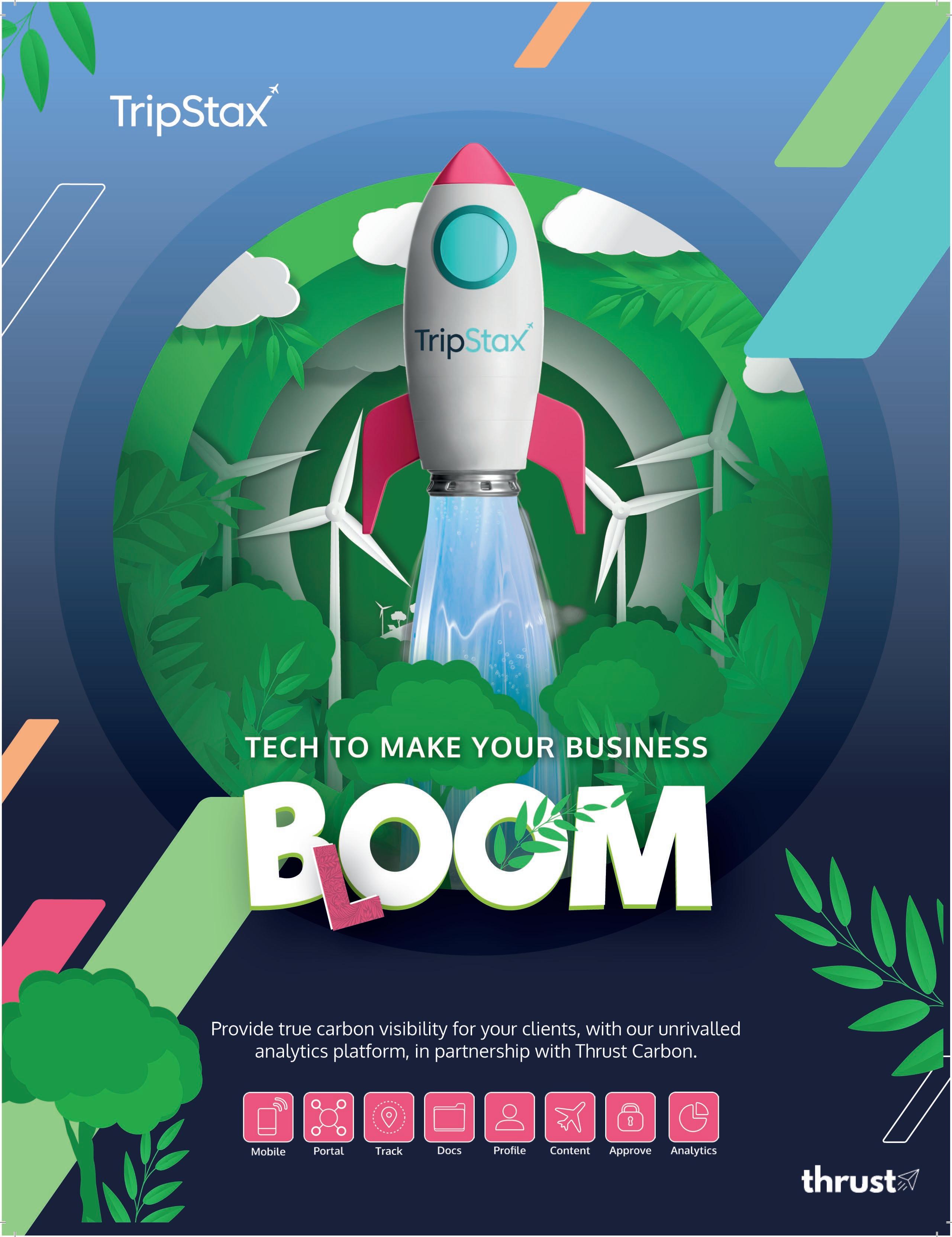
Features
20 The NDC conundrum: We report from our Business Travel Lunch Forum on the future of air distribution

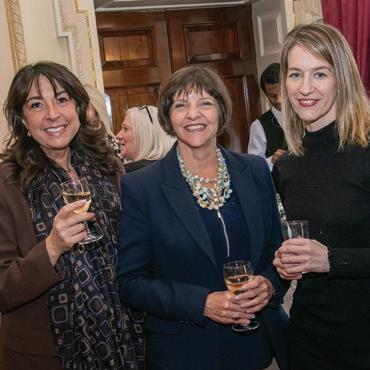



30 Serviced accommodation: Sustainability and bookability were top of the agenda at our Business Travel Lunch Forum on the extended-stay sector
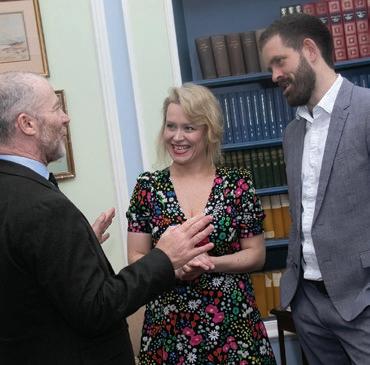
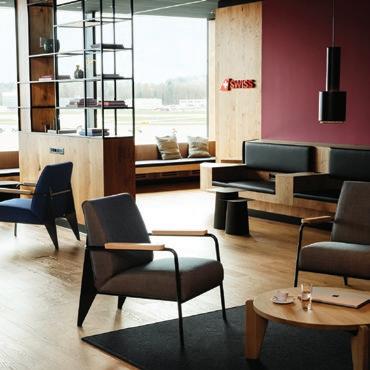
48 DE&I stories: We asked six people to share their thoughts and experiences relating to diversity, equity and inclusion



Up Front
6 Opening Shots: The most exciting openings in the world of travel – in pictures

8 Ask the Expert: Fernando Vives, Chief Commercial Officer, NH Hotel Group, shares his expertise on sustainable hotel stays

10 Everyone's Talking About: The US dropping Covid vaccine requirements

11 Speaking Out: Joe Thurgood, Sales Manager, South Western Railway, explains why he believes it's time to get back on the train again

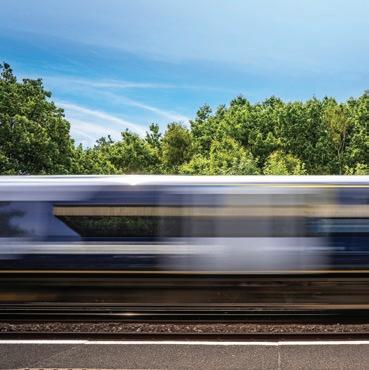
Departures
52 Reality Check: We check out the inflight product of three airlines and luxury serviced apartments in London

UP FRONT 3 THE BUSINESSTRAVELMAG COM Contents
MAY-JUNE 2023
30 48 46 7 45 16 20 38 (p23-45)
SPECIAL Read our guide for expert insight and advice on how to cut the carbon footprint of your travel 19 11 24 34 42
Sustainability
Welcome
Better than nothing
One particular comment resonated with me during the recent ITM Conference. It was made during a sustainability session, by Catherine Logan at the GBTA: "Don't let perfect get in the way of good."
It's a phrase that perfectly sums up a problem many corporates are experiencing in their struggle to reduce the environmental impact of their business travel. As our cover line says, it's easy to get lost in the details –finding the most accurate, granular carbon emissions data, the complexities of reporting, the myriad of accreditations – but don't let this stop you from getting on with the job in hand.
After all, if you wanted to shed a few pounds for your summer holiday, would you wait until you knew the calorific and nutritional value of every food item? Would you spend weeks studying the effectiveness of all the diets available? Or would you already know that a salad is better than a cake and crack on?
No matter what stage you've reached on your journey, our Sustainability Special is essential reading. We give an overview of the latest developments (page 23), take a closer look at SAF (page 30), reveal what else airlines are doing to be more sustainable (page 34), and then turn our attention to accommodation (page 42). We also reveal the top sustainability innovators in our annual Movers & Shakers list (page 38).
On top of this, we report from our hugely successful Business Travel Lunch Forums – one focussed on serviced accommodation (page 46) and the other on the thorny issue of NDC (page 20), and we ask six individuals to explore an aspect of DE&I that's close to their hearts (page 48). So, what are you waiting for? Get reading!
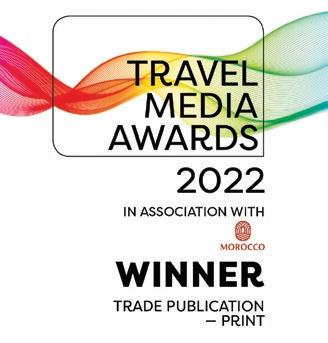
EDITORIAL EDITOR
Bev Fearis
CONTRIBUTORS
Neal Baldwin, Gill Upton, Felicity Cousins, Gary Noakes & Charlotte Flach
DIGITAL EDITOR
April Waterston
EDITORIAL DIRECTOR
Steve Hartridge
ADVERTISING SALES
PUBLISHER / COMMERCIAL HEAD
Kirsty Hicks
DESIGN & PRODUCTION
DESIGNERS
Matt Bonner, Caitlan Francis and Emma Norton
PRODUCTION & STUDIO MANAGER
Clare Hunter
PRODUCTION ADMINISTRATOR
Steve Hunter SUBSCRIPTIONS
Subscribe for free at thebusinesstravelmag.com/subscribe
MANAGING DIRECTOR
Matt Bonner

CEO
Martin Steady
Bev Fearis, Editor



4 THE
BUSINESSTRAVELMAG COM
BMI PUBLISHING
(Print) ISSN 1754-8543. THE BUSINESS TRAVEL MAGAZINE IS PUBLISHED BY BMI PUBLISHING LTD: 501 THE RESIDENCE, NO. 1 ALEXANDRA TERRACE, GUILDFORD, GU1 3DA, UK. TEL: 020 8649 7233 ENQUIRIES@BMIPUBLISHING.CO.UK / BMIPUBLISHING.CO.UK THIS PUBLICATION IS PRINTED ON 100% FULLY RECYCLED PAPER WHILE EVERY EFFORT IS MADE TO ENSURE ACCURACY, BMI PUBLISHING LTD CANNOT BE HELD RESPONSIBLE FOR ANY ERRORS OR OMISSIONS. © BMI PUBLISHING LTD 2023 FRONT COVER: ISTOCKPHOTO.COM/NGUPAKARTI OTHER IMAGES SOURCED FROM SUPPLIERS, STOCK.COM, BIGSTOCKPHOTO.COM AND UNSPLASH.COM UP FRONT
DON’T LET MANAGING BUSINESS TRAIN TRAVEL RUFFLE YOUR FEATHERS.




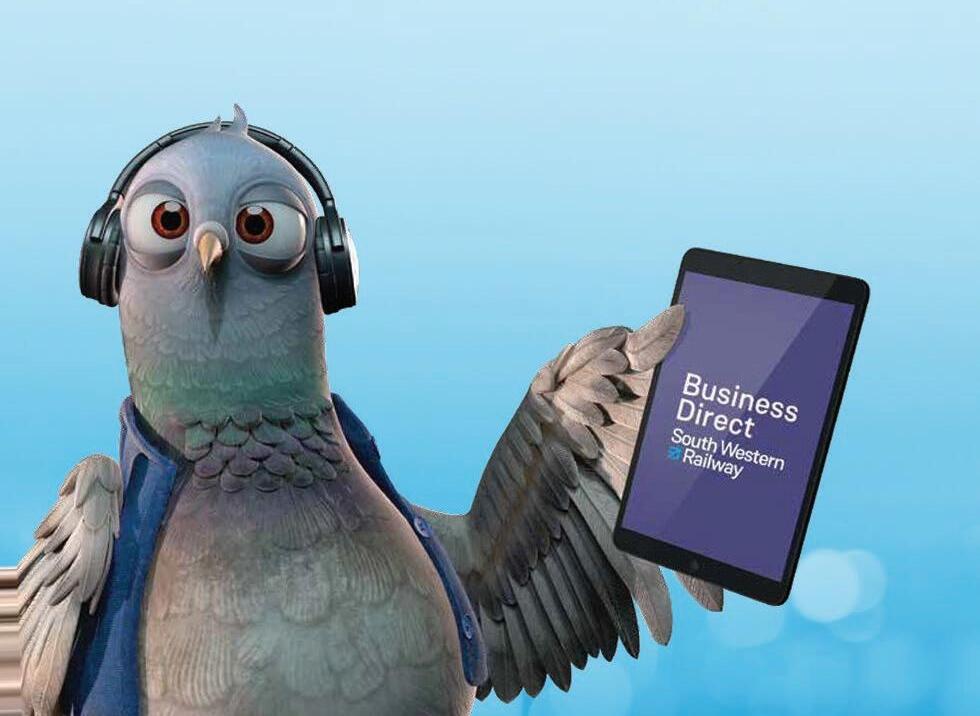
Easily book and manage your company train travel with our free Business Direct tool.

SWR Business Direct Tool • Book rail travel anywhere in the UK




No booking fees

Collect tickets with any card
Manage all bookings in one place
In-depth reports in two clicks


T&Cs apply.
Cheval Maison, Dubai Palm cHarm
This all-apartment boutique property is the first international opening for the luxury Cheval Collection. Its 131 apartments share access to a rooftop pool and a top Dubai restaurant, called The Lighthouse. They also have fab views down the trunk of The Palm.
Eye-catching images of the latest news and developments

As part of The Palms' Golden Mile residential complex, guests benefit from one of the best locations on the trunk of The Palm and unparalleled views towards the landmarks of the Royal Atlantis”
UP
6 THE BUSINESSTRAVELMAG com
FRONT OPENING SHOTS
Hilton Brighton Metropole bEacH vIbE
Brighton's colourful houses, beach huts and seaside landscape all inspired the warming pinks, calming blues, greys and teals when this iconic Victorian hotel underwent a £26m refurbishment. A new Presidential suite has three king bedrooms, three bathrooms and a sumptuous living area, all with balconies with direct sea views.
Casa da Companhia, Porto TaSTE Of POrTO
Part of its new Vignette Collection, IHG has opened the Casa da Companhia in the city of Porto. This high-end boutique hotel has 40 rooms, including three suites, plus a luxurious spa, fitness suite, heated indoor and outdoor pools. Guests can try ‘fire opening’ a bottle of Port, and sip it with a chocolate truffle, a Porto tradition.


SWISS
Lounge,
Zurich alPINE vIEwS
Business and First Class passengers, and others with the right loyalty membership, can enjoy views of the distant Alps at the new-look SWISS Non-Schengen Lounge in Zurich Airport’s Terminal D. Various zones offer closed workstations, open workspaces, showers and a bistro.
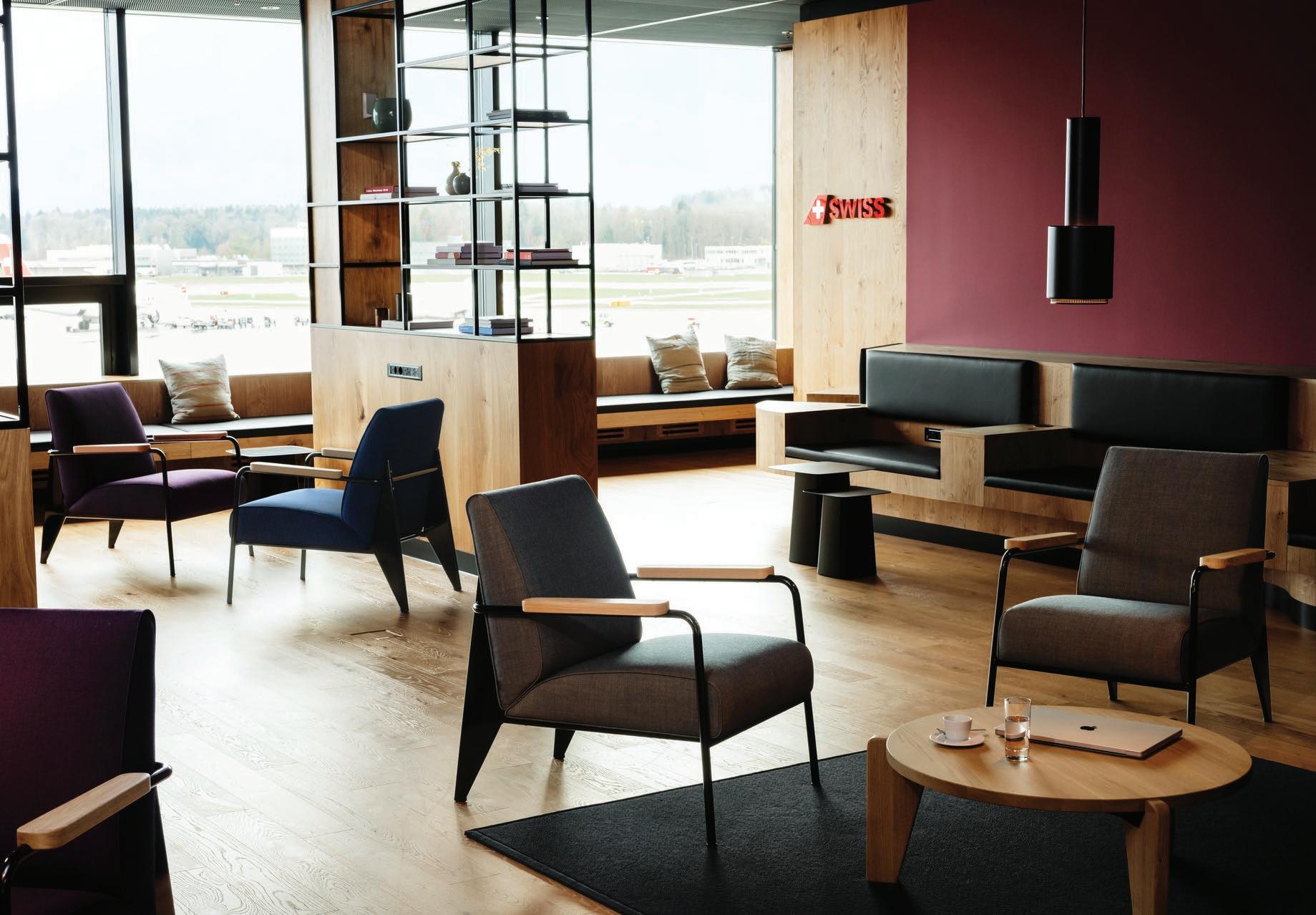
7 THE BUSINESSTRAVELMAG com
Ask the expert... Sustainable hotel stays
Fernando Vives, Chief Commercial Officer, NH Hotel Group
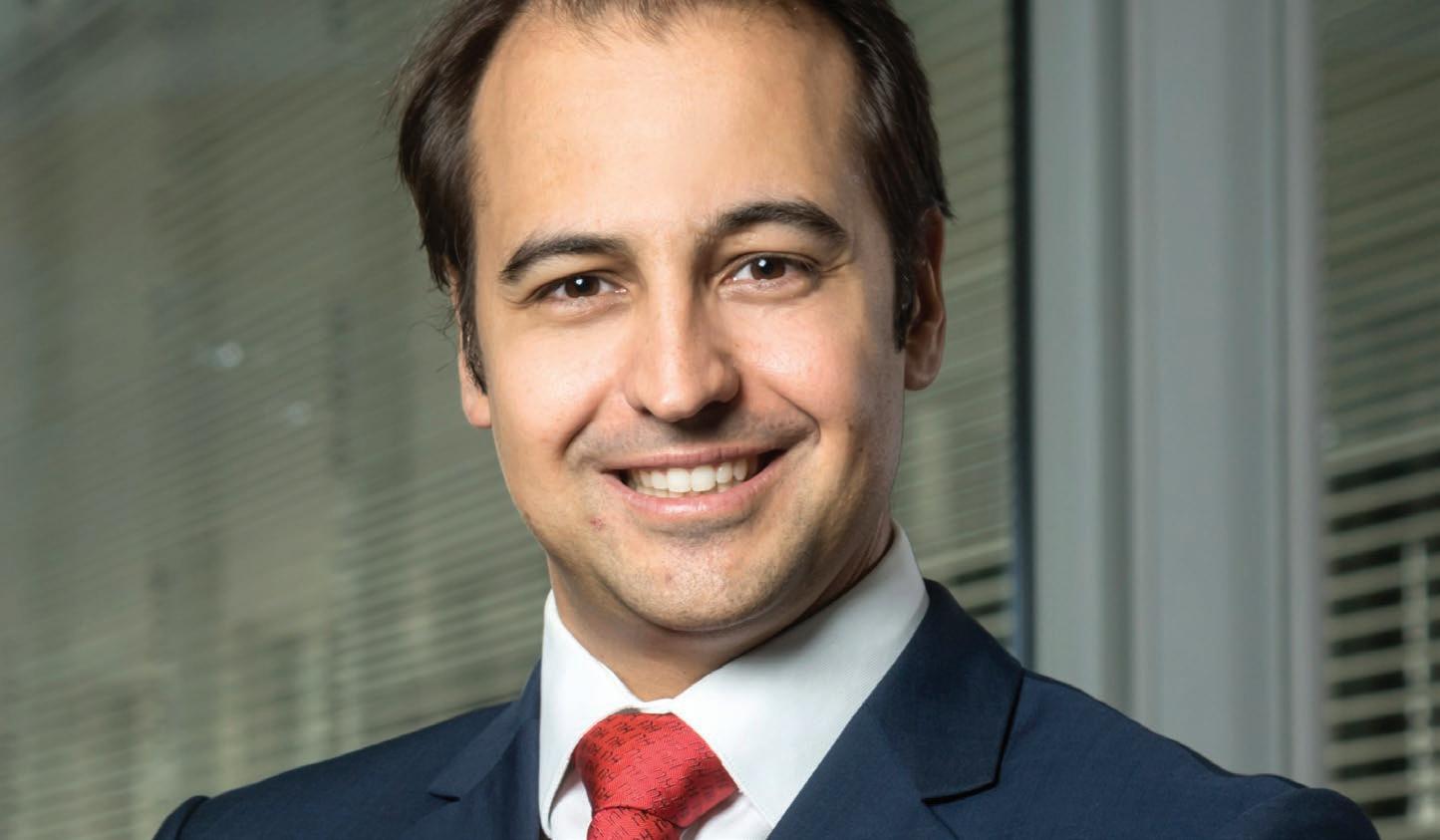
each year in our hotels. Plastic waste is reduced by 40% worldwide (45 tons), equivalent to 364 tons of CO2. Likewise, the elimination of 5 million bars of soap means not wasting 70 tons of product per year. We have also started to install showers that reduce the volume of water used by 40% thanks to their savings technology, which has reduced the water consumption per stay by 24% compared to 2021.
How important is it for hotels to source local F&B produce?
If a guest opts out of a daily room clean, what difference does that make to the environmental footprint of their stay?
At NH Hotel Group we offer a complete room cleaning service but guests who stay for more than one night can decline it thanks to our ‘Green Stay’ initiative. The difference in one isolated case could be slight but let's think of every person who opts for this. Together it accounts for a significant contribution to the environment as it means using less water and electricity for room cleaning and for bed linen and towels that are not going to be washed. Even more significantly, 64% of the electricity consumed by the group now comes from completely renewable sources. In hotels in the Southern Europe, it's 100% and the overall energy consumption per stay has been reduced by 35% compared to 2021.
What is the environmental benefit if guests use automated check-in?
Since 2020 we have offered several tech tools to automate check-in and check-out with Fast Pass. With Mobile Guest Service,
our guests can manage everything related to their stay from any electronic device, such as a request for extra amenities or booking a table in a restaurant. These initiatives provide an improved customer experience but also help us to play our part in the fight against deforestation and climate crisis. It has allowed the group to reduce the consumption of 2 million sheets of paper, translating into 30,000 kg of wood saved, 500 m3 of water not consumed, 100,000 kWh of energy saved and 11 metric tons of CO2eq not emitted into the atmosphere.
How significant is a switch away from miniature toiletries?
New amenities in our hotel bathrooms allow us to eliminate all single-use plastics in our room set-up, replacing them with new 100% recycled and recyclable PET, complemented with a new line of bathroom accessories made using biodegradable materials presented in 100% recycled paper packaging. New larger-capacity containers make it possible to eliminate more than 14 million individual containers that were used
This can make a big impact. Some of our hotels have spaces to install urban gardens. Cultivating these spaces enhances the landscape and gastronomic value of the dishes and also reduces the environmental impact, since it eliminates the need to transport produce. It also generates a sense of community among employees. Some NH hotels in Austria and Germany offer a home for bees on their roofs, aware of the limited space in cities for biodiversity, the important role of bees in ecosystems and the critical situation of bees in Europe.
What else can business travellers do to reduce the footprint of their stay?
There are several things our guests can do. Some of them are the same as in their homes, such as reducing energy waste, turning off the lights and air conditioning when leaving the room, unplugging any electronics that are not in use, re-using towels, taking shorter showers and not letting the water run while brushing teeth or shaving. Guests can also choose green transportation. For example, in our hotels we offer green mobility services such as carsharing, bike rental and charging points for electric cars. For travel buyers, it's vital in RFPs to ask for details about a hotel’s sustainability policy, measures being taking to reduce carbon footprint, percentages of renewable energy consumption and numbers relating to water usage.
8 THE BUSINESSTRAVELMAG com
UP FRONT VIEW

Everyone's talking about... the end of US Covid rules


“ THE FEDERAL GOVERNMENT MUST ENSURE U.S. AIRPORTS AND OTHER PORTS OF ENTRY ARE APPROPRIATELY STAFFED WITH CUSTOMS AND BORDER PROTECTION OFFICERS TO MEET THE GROWING DEMAND FOR ENTRY ”
Geoff Freeman, President and CEO, US Travel Association
“This latest development will serve as a strong driver in encouraging and facilitating international air travel”

WE’VE SEEN BUSINESS TRAVEL TO THE U.S. GROW SIGNIFICANTLY OVER THE PAST YEAR, ALREADY SURPASSING 2019 LEVELS. BUT THE REMOVAL OF THESE FINAL COVID RULES REMOVES ANY LINGERING CONFUSION FOR TRAVELLERS, WHICH CAN ONLY BOOST CONFIDENCE EVEN MORE
This is music to the business travel industry’s ears. Now that the last restriction to the trade and business relationships between the US and the UK has been removed two great trading nations can fully get back to business”


AMERICA’S 18-MONTH LONG POLICY OF INSISTING INTERNATIONAL TRAVELLERS ARE JABBED FOR COVID HAD BECOME INCREASINGLY OUT OF STEP WITH THE REST OF THE WORLD. THE WITHDRAWAL OF THIS REMOVES THE FINAL BARRIER TO VISITING THE U.S. AND CREATES A FURTHER BOOST TO THE FULL RECOVERY OF BUSINESS TRAVEL
Mark Colley, Managing Director, Sunways Business, Leisure & Sustainable Travel
“As one of the few remaining hangover rules from the pandemic, the decision is another milestone in travel’s return to ‘normal’. Any move which takes a little bit of friction out of transatlantic air travel is great news”
Guy Snelgar, Global Business Travel Director, The Advantage Travel Partnership
10 THE BUSINESSTRAVELMAG COM
UP FRONT HOT TOPIC
Clive Wratten, CEO, Business Travel Association
Suzanne Horner, CEO, Gray Dawes Group
Suzanne Neufang, CEO, GBTA
BACK ON BOARD
Life has changed since the pandemic, that’s for sure. We’ve all watched everything on Netflix, going out for dinner now means ordering from your phone on the sofa, and you’re never too far away from someone with a weird conspiracy theory to share.
Oh, and travel managers have taken their eye off the ball.




Given my job, I’m talking specifically about rail here. With Covid restrictions lifted and work life slowly getting back to normal, it seems to me that many businesses have let enforcement of travel policy slide. Hopping on the train for meetings, whether it was for new business or just pressing the flesh with existing clients, used to be standard practice. Today – not so much.
Of course, you can understand the shift in attitudes. Travelling by car was encouraged when it meant keeping employees safe from Covid infection, but now there is no reason to still be on the motorways.
In the new world order, the perceived wisdom is that staff should get behind the wheel for domestic trips despite the fact that, from a duty of care
perspective, driving is possibly the most dangerous thing you can do while at work. Corporates and SMEs have fallen into a trap – namely, that a shift in social attitudes mean workers won’t tolerate being told what to do and love their new freedoms. Driving to a meeting is great if it finishes early too, since it means knocking off and going home, thinks the staff member, forgetting that they will then be working into the evening to collate their notes from the day or do the tasks they’ve missed while in the car.
I’ve wondered whether businesses have actually realised what a shift away from rail travel is costing them? Going to meetings by rail offers a host of lifestyle benefits as well as being green – doing last-minute prep, keeping on top of emails or even sitting back to relax to arrive stress-free in best form. All of these mean the employer is getting the benefit of their employee’s time. The same can’t be said for two hours in a traffic jam on the A3.
Part of the issue can be put down to a loss of staff in travel departments. As teams have shrunk because of the pandemic,

relationship managers are putting their efforts into the biggest areas of spend, such as air and hotels. Train travel is easy to overlook, since it is an element of the mix often seen to take care of itself.
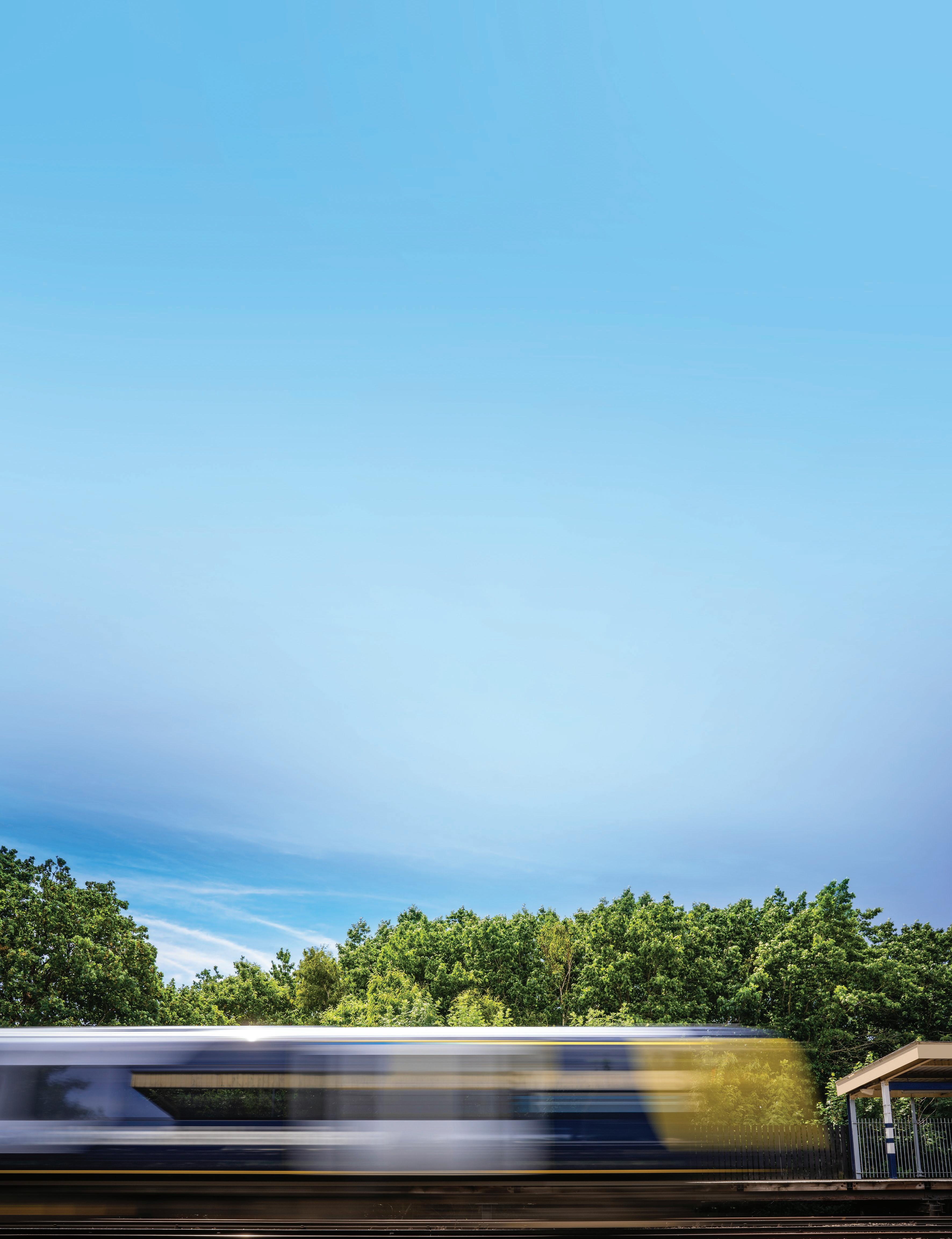
Train companies aren’t blameless in all this. We’ve been very good at talking up how important the rail network is to the leisure sector and have put significant marketing funds (backed by warm words from the Government) into this. Business travel has been a little bit forgotten.
I know there are many reasons that companies complain about rail – WiFi service, reporting when it come to sustainability policy, fare restrictions and booking tool integration all spring to mind. But get a good TMC on the case and all of these disappear.
As a more relaxed approached to client relations takes hold, the fear is that face-toface meetings could even become a thing of the past. I recently spoke to one SME that had switched to Zoom calls for all new business interactions. The result? Not one contract win.

Life might have changed with the pandemic, but train travel is still as brilliant as it ever was. It’s time to rekindle that relationship.

RAIL
UP FRONT SPEAKING OUT
JOE THURGOOD
Joe Thurgood is Sales Manager at South Western Railway, the operator of trains from London Waterloo to south west London, Surrey, Dorset and Hampshire, plus regional services in Somerset, Berkshire and Wiltshire.
11 THE BUSINESSTRAVELMAG COM ISTOCKPHOTO.COM/MEDITERRANEAN
It’s time to tell your travellers to ditch their cars and take the train again, says Joe Thurgood, Sales Manager at South Western Railway
Setting the benchmark in business travel, with an experience like no other
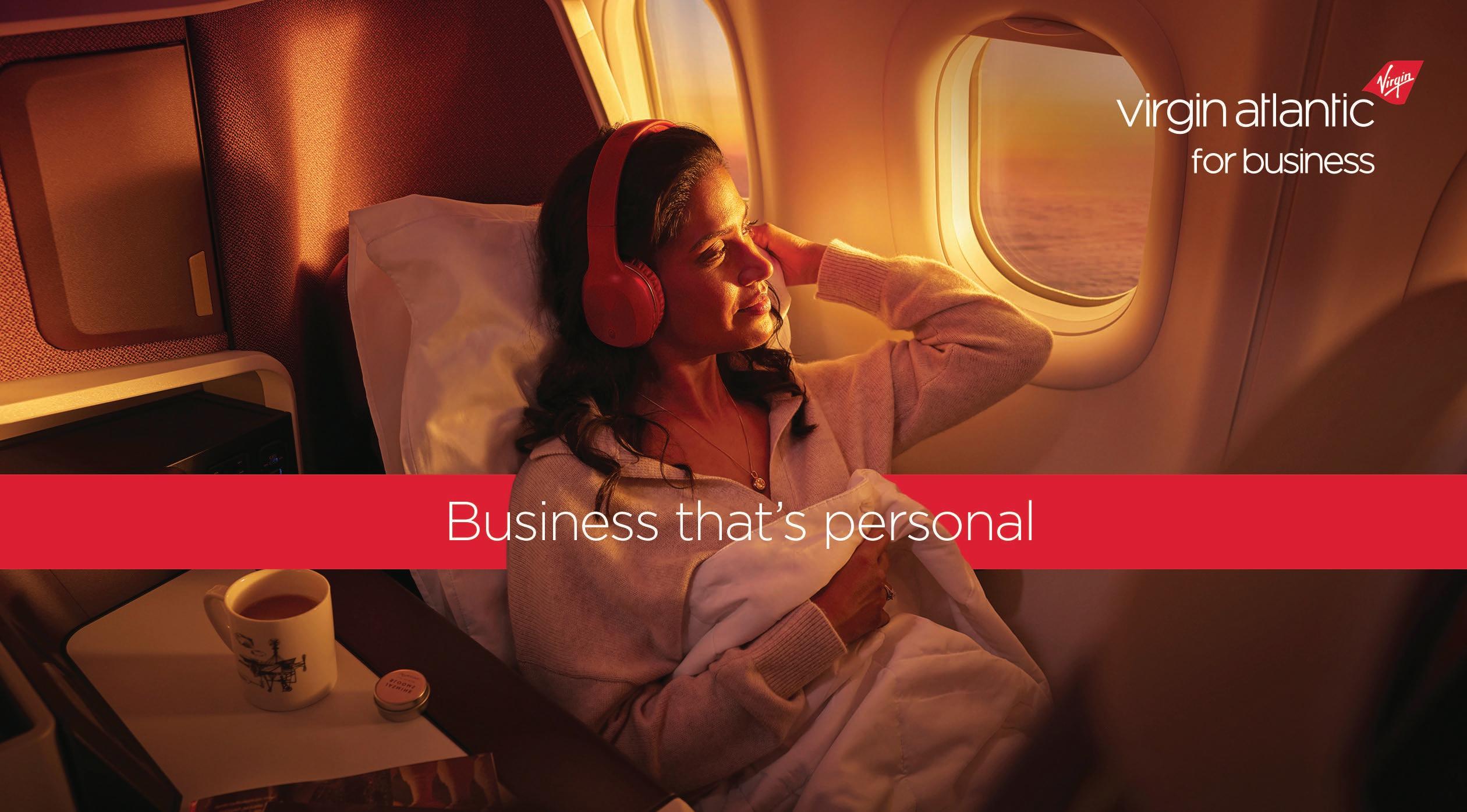
At Virgin AtlAntic, there’s no such thing as one-size-fits-all. We know that people are doing business on their own termsand want to fly in much the same way. It’s about creating a brilliantly different travel experience for the individual, and a more sustainable and inclusive industry for all of us. And always, with the warm, one-to-one service from our world-class crew and support teams whenever you need them.
Connect seamlessly to more than 200 US destinations with us and our partner Delta Air Lines, (including 9 flights a day from London to JFK) and beyond, with daily flights to global business hubs Tel Aviv, Johannesburg, Delhi, Mumbai and Shanghai. And because we’re part of the SkyTeam alliance and a vast network of other partner airlines, we can take you to more places around the world than ever before.
From car to clubhouse in 10 minutes.
Enjoy the ultimate departure experience from our home at London Heathrow Terminal 3. As your car pulls up to our exclusive Upper Class Wing, we'll be ready to greet you, check in any bags, and give you your boarding pass. Then glide through our private security channel straight to the Clubhouse, where
you can finish off those last minute emails or order something delicious to eat. You can even get in a pre-flight workout on our Peloton bikes (with a runway view, of course). When you return to London Heathrow, enjoy a cooked breakfast and a refreshing shower at our Revivals lounge before starting your business day.
12 THE BUSINESSTRAVELMAG com
Economy
Different ways to tailor your experience
With Virgin Atlantic Economy, we positively encourage you to be choosy. Select Classic or Delight, and relax, secure in the knowledge that whichever you go for, you’ll get a choice of delicious three-course meals, complimentary drinks and snacks, and in seat power to keep your gadgets going. Or take some time out to browse Vera, our outstanding inflight entertainment system that’s brimming with must-see TV and films.
Economy Delight: Enjoy Premium Check In and priority boarding, plus an extra legroom seat.
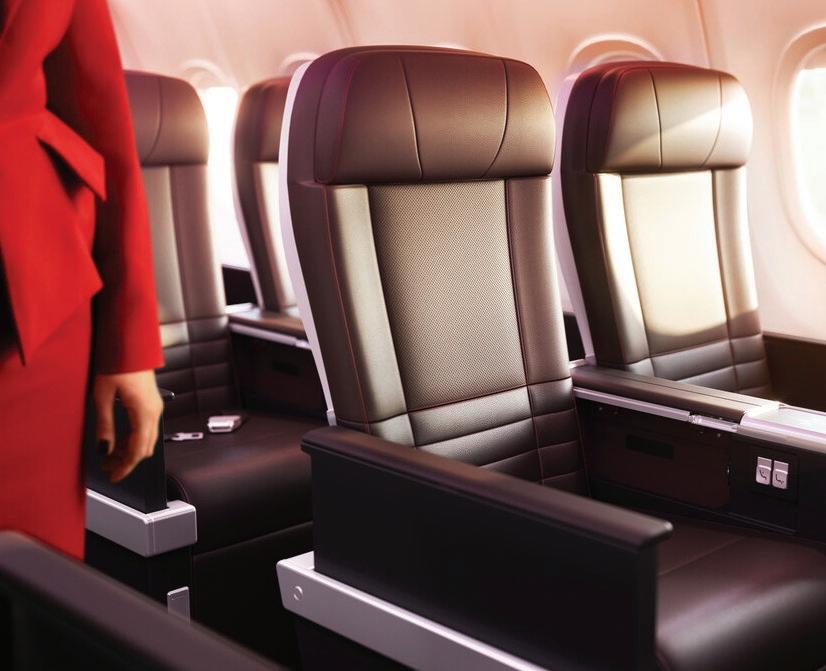
Economy Classic: Choose your seat in advance for free and take one 23kg checked bag.
Pr E mium
Premium comfort with all the perks
The difference between a good flight and a phenomenal one is the details –the unexpected extras that enhance your experience and make you smile.
• Select your seat free of charge anytime from 331 days before you fly
• The airport’s a doddle with dedicated check in and priority boarding
• Experience personalised service with your own Premium cabin crew team and bespoke food, beverage and snack options
• Every seat comes with an adjustable headrest and footrest for maximum comfort whilst working
uPPE rcl ASS
the perfect retreat at 30,000 feet
With Upper Class, we’ve thought of every last detail of your journey so you don’t have to. Step onboard to discover your private and spacious suite with direct aisle access.
• Breeze through the private security channel in our Upperclass Wing at London Heathrow
• Relax and unwind in our awardwinning Clubhouse
• Onboard, enjoy fine cuisine from the comfort of your own spacious suite
• Our adjustable ergonomic seats convert to fully lie flat beds
• Exclusive social spaces, onboard WiFi and in seat charge points make working onboard a breeze
• Complimentary cosy Sleepsuits on night flights
Flying club
We believe that the perks of business travel should go way beyond work. Virgin Atlantic Flying Club has a generous tier system to reward our loyal travellers, plus customers can also earn points when they fly with our airline partners.


13 THE BUSINESSTRAVELMAG com
UPPERCLASS
ECONOMY
PREMIUM
ITM POLL REVEALS TOP BUYER WOES
CONCERNS about NDC and a growing sense of urgency due to sustainability legislation are top of the agenda for UK travel buyers, according to a ‘Pulse Check’ of ITM members unveiled at ITM's Conference in Brighton.

A survey in April of 100 corporate travel buyers, managers and heads of travel found 60% feel their TMC is not adapting to changes in the airline distribution landscape.
Highlighting worries about a potential increase in policy leakage, 90% of buyers surveyed said their travel policy does not allow travellers to book outside the TMC.
Meanwhile, sustainable travel was also found to be a top concern, with “a real sense of urgency due to the accelerated global focus on climate change and legislation that will tighten up organisations’ disclosure of carbon emissions”.
[ TMC NEWS BITES ]
>> BCD TRAVEL has opened a service centre in Colombo, Sri Lanka, for clients in Australia, Hong Kong and Singapore >> CWT has launched a meetings and events carbon footprint calculator combining travel, hotel stays, meeting space and F&B carbon information >> AMEX GBT has begun pilots and rollouts for NDC bookings for Air France and KLM NDC content across Neo and Egencia >> TRAVELPERK has opened a new headquarters in the 22@ Innovation District of Barcelona >> AGIITO has named Donna Fitzgerald as Interim CEO following the departure of James Parkhouse >> EASY AVENUES has joined Focus Travel Partnership
>> DIVERSITY TRAVEL has become the academic travel partner for the University of Wageningen in the Netherlands >>
GBTA OUTLOOK: THREE KEY DRIVERS FOR BUSINESS TRAVEL
THE SHIFT to NDC was identified as a key driver shaping the path ahead for the business travel industry, according to the latest GBTA Business Travel Outlook.
Just over eight in 10 buyers surveyed (81%) said they need more information on NDC and 50% do not feel their TMC has sufficient NDC information and/or is not sharing implementation plans.
The survey also found 60% of travel buyers say they do not support American Airlines’ decision to restrict a large chunk of its fares to NDC channels, compared with
36% of travel suppliers and TMCS.
Over half of buyers (53%) believe some airlines are trying to roll out NDC too quickly and have not given third-party intermediaries enough time to develop the required technology and processes.
But a third of buyers (29%) say intermediaries have had enough time and should be ready to handle and service NDC bookings.
The ongoing talent crisis and the challenge of improving traveller experience, particularly during disruption, were also identified as key drivers for the sector's future.
DAWES BUYS FLORIDA TMC AS PART OF GLOBAL EXPANSION PLAN
GRAY DAWES GROUP has acquired Florida-based TMC Express Travel as part of its ‘follow the sun’ service model. The deal takes the group's global turnover to more than £350 million.
Joint Managing Partners, Olga Ramudo and Cristina Jacominos, will stay on with Express Travel. Ramudo becomes SVP Florida and Latam while Jacomino will take on the role of Director Luxury Travel.
66% of 2019 business travel spend has resumed
Spend on international business travel is back to 66% of pre-pandemic levels, according to the latest GBTA Business Travel Outlook, up from 58% when buyers were surveyed in January. GBTA surveyed over 800 business travel buyers, suppliers and industry professionals.
14 THE BUSINESSTRAVELMAG COM
GO ONLINE FOR LATEST NEWS THE NEWS REVIEW
GRAY
ETIHAD AIRWAYS HAS UNVEILED NEW-LOOK BUSINESS STUDIOS ON THREE BOEING 787 DREAMLINERS DUE TO JOIN ITS FLEET LATER THIS YEAR, INCLUDING SUITE DOORS FOR ADDITIONAL PRIVACY
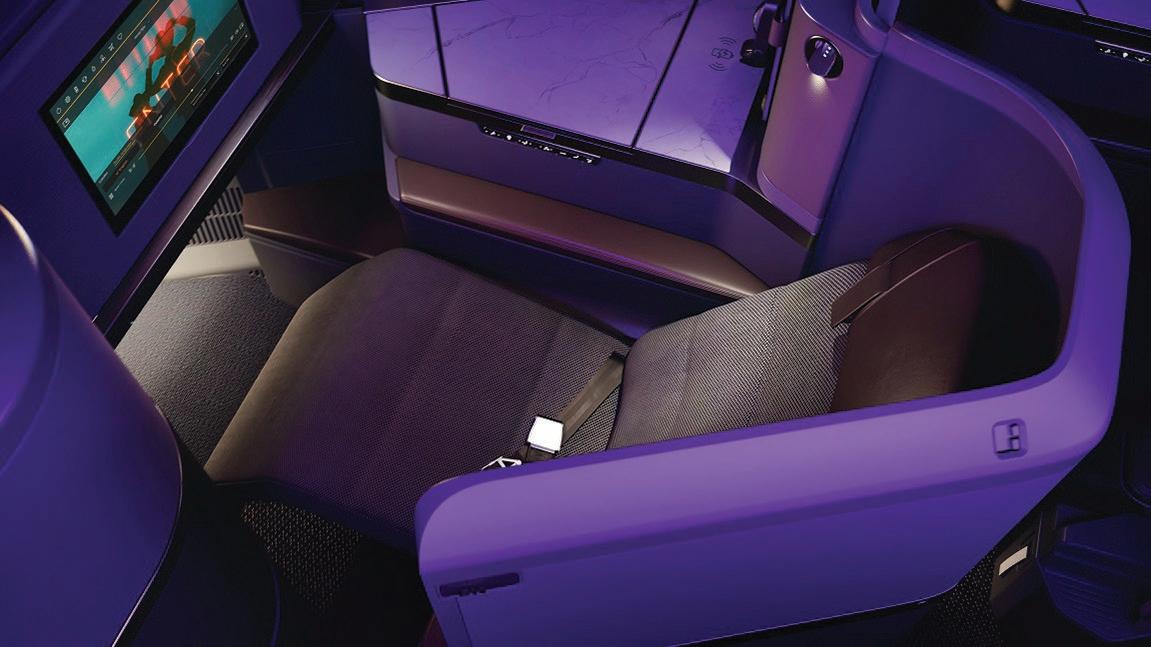
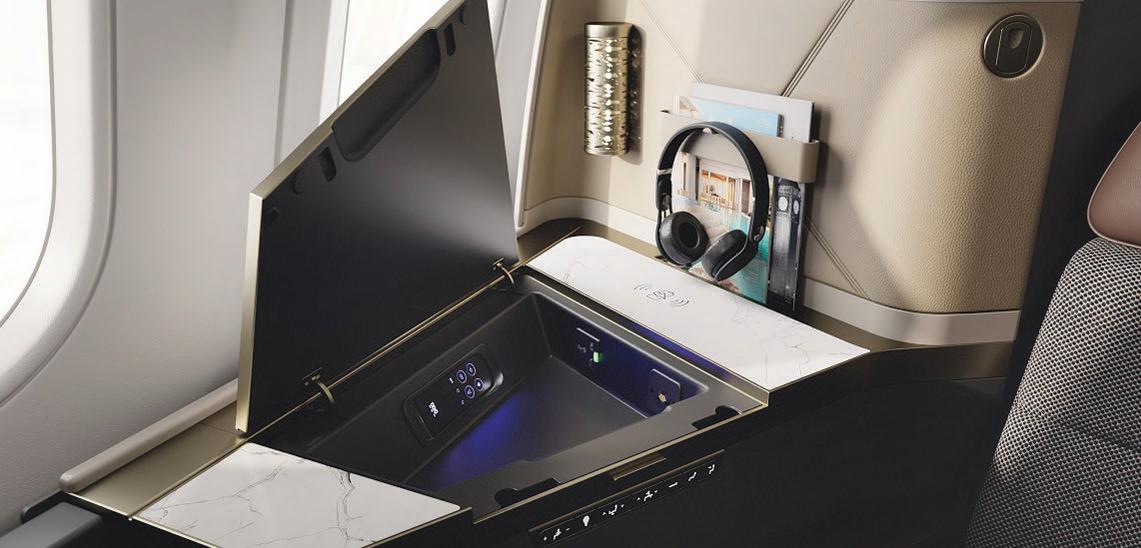
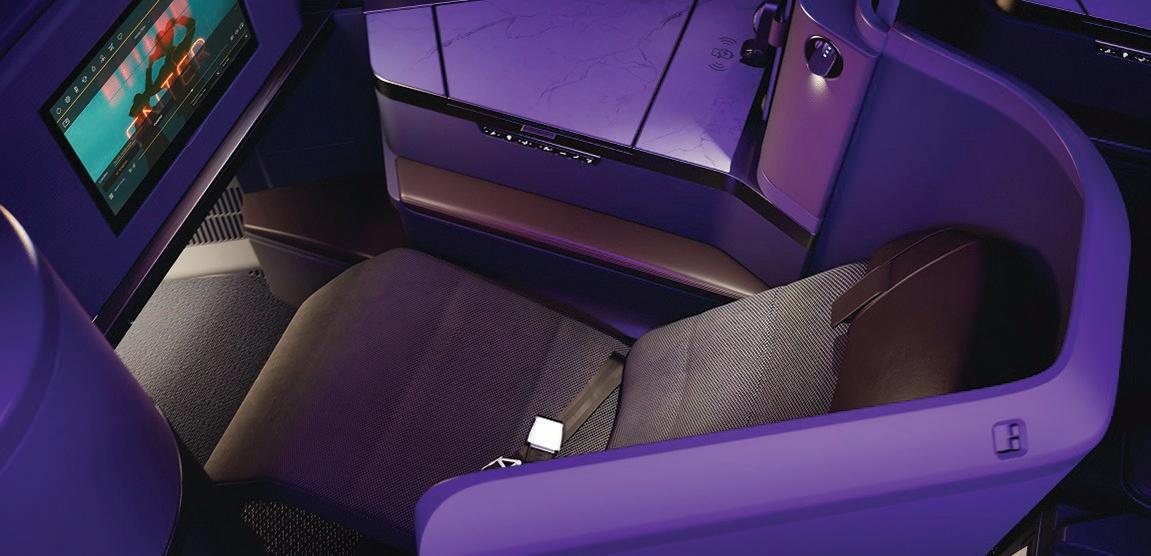
Industry acts to save tourism qualifications
INDUSTRY bodies have joined forces to launch a campaign to persuade City and Guilds not to scrap Aviation, Travel and Tourism qualifications.
Announcing that qualifications will close to new entrants between December 2023 and August 2024, City & Guilds said it wants to focus on delivering industry specific qualifications to a smaller number of sectors in the future.
The BTA, ABTA, the Institute of Travel and Tourism, UKinbound and the Tourism Alliance have formed a joint working party to understand the changes and to develop a co-ordinated and collaborative response.
A statement from the BTA said the decision was “ironic and misguided” and it was "paramount" that courses continue.
BTA COMMENT
Shifting the narrative
As we move further into 2023, we get closer to the NetZero by 2050 goal. In turn, industries have set their own NetZero initiatives. Airlines are incorporating set percentages of sustainable aviation fuel in their aircraft, car rental services are switching towards hybrid and electric vehicles and TMCs are implementing carbon emissions calculators.
The drive towards NetZero must continue at pace but it seems that instead of pushing communities towards sustainability goals, many across the industry are paralysed by the focus on reflective statistics and data, often concerning carbon offsetting.
We need to shift the narrative away from measurement after activity, and away from hitting data targets. Paralysis by data is currently threatening industries across the UK and their ability to reduce, move forward and reap the rewards of their sustainable actions. The overwhelming reliance on statistics makes targets seem near impossible to reach and holds individuals back from acting. Targets will seem to be more manageable when
sustainability is factored in from the start of the activity of the individual, company or industry, without emphasising the importance of the measurement and figures afterwards. The achievement of carbon reduction and other NetZero initiatives can only happen if those within the industry are educated, to enable them to effectively make the right choices, as well as understand the wider sustainable data and statistics.
Cross-industry and government collaboration allows companies to lay out sustainable and incentivised choices for their employees to follow, simultaneously taking the pressure off meeting statistical targets afterwards.
Business travel is a power for good but it's no secret that it contributes greatly towards carbon emissions. This is why it is vital that there are clear and effective structures in place to make it as easy as possible to shift towards sustainability. We must encourage business travel as it makes a strong comeback postpandemic, but whilst also protecting the future of the environment.
Clive Wratten Chief Executive Officer

THE NEWS REVIEW 15 THE BUSINESSTRAVELMAG COM THEBUSINESSTRAVELMAG.COM
BTA UPDATE
w i NN i N g formu LA
The

The judging process is now underway for the 2023 Business Travel People Awards, with judges facing the difficult task of selecting the finalists.
After declaring any conflicts of interest, judges have been allocated categories by Judges Chair Leigh Cowlishaw, Managing Partner Black Box Partnerships.
Alongside written submissions, the judges will study supporting evidence, which might include testimonials from colleagues and clients, examples of work or videos.
Those who make it to the next stage will be contacted by email towards the end of May, after which the shortlist will be officially unveiled on our website, thebusinesstravelmag.com.
The number of shortlisted candidates in each of the 14 categories will depend on the quality of the entries. Finalists will be sent marketing collateral to share on social media channels.
“Getting through to the awards shortlist is a huge achievement in itself, so we want the finalists to be able to let their friends and colleagues know about their
success,” said Cowlishaw.
Judges will then meet in London on July 6 to make the final decisions about this year’s winners and to interview the finalists in the Rising Star category.
New fAces
There are eight new judges on the panel this year, including Merv Moonien, UK Travel Services Manager for JLL/Amazon, Devi Virdi, Group Head of Diversity and Inclusion at Centrica and Paul Bowden, Commercial Director at RDG (Rail Delivery Group).
Carolyn Pearson, CEO of Maiden
Voyage and winner of the 2022 Chair’s Award, and Lynne Griffiths, CEO Sirius Talent Solution and winner of the 2022 Shining Star category, will also join the panel. Following tradition, the winners of the previous year’s Rising Star Award will also help choose the 2023 winners. In 2022 there were three joint winners of this award – Sinéad Ryan, Head of Account Management UK, ALTOUR, Georgia Suttie, Venue Find Operations Manager, Agiito, and Laura Garton, Sales and Marketing Executive, Synergy Global Housing.
The Big NighT
Tickets are already on sale for the glittering awards ceremony on September 25. For the first time, the event will take place at the recently-renovated De Vere Grand Connaught Rooms in London.
The evening will start with a drinks reception with canapés, sponsored by ATPI, followed by a sit-down meal in the Grand Hall, during which the winners will be announced. Afterwards there will be time for more networking and celebrating.
Early bird tickets for the awards ceremony are available until June 30 2023 for £150. After that date, the price will rise to £175. Tables (for up to nine) are available from £1350 (early bird) and then from £1575. price includes the welcome drinks reception, ceremony and a three-course dinner with wine and coffee.
16 THE BUSINESSTRAVELMAG com
“Tickets are already on sale for the glittering ceremony in London on september 25”
entries are now in for this year’s People Awards. Here's what happens next...
"We can't wait to see you all to celebrate the achivements of our industry's best people," said Kirsty Hicks, Publisher of The Business Travel Magazine and organiser of the awards.
sPoNsors
As always, the Business Travel People Awards wouldn’t be possible without the support of our industry-leading sponsors.
For 2023, Agiito will be sponsoring the Travel Tech Innovator Award while Sirius Talent Solutions is supporting Rising Star. JetBlue has been confirmed as the sponsor of the much-coveted TMC of the Year Award and Delta/Virgin are jointly sponsoring the award for Sustainability Champion. Best Workplaces In Travel is supporting the new People Manager of the Year category.
Meanwhile, TripStax is sponsoring the prestigious Industry Contribution Award and ATPI will kindly be providing the welcome drinks and sponsoring the bar. For sponsorship opportunities and more information, contact Publisher Kirsty Hicks on kirsty.hicks@bmipublishing.co.uk.
from The JuDges
Devi Virdi, group head of Diversity & inclusion at centrica

It’s a great opportunity to give back to the sector where I have spent many years of my career and where my DE&I journey started. I’m looking forward to seeing trailblazers who are making impact and tangible change across their organisations with inclusion and diversity at the core.

Paul Bowden, commercial Director, rail Delivery group

Judging the best of the best within business travel allows me to get down to the grassroots and contribute to elevating talent and best practice.
sinead ryan, head of Account management uK, Altour



It’s a real honour to be invited as a judge for these prestigious industry awards. It’s so important to support talent and shine a light on those that are going above and beyond every day.
Laura garton, sales and marketing executive at synergy global housing
I want to help the superstars across our industry gain the recognition they deserve. These individuals work tirelessly day in day out and I look forward to supporting the wider industry in identifying these superstars so that great minds can come together, collaborate and continue to push the boundaries of our industry.
carolyn Pearson, founder and ceo, maiden Voyage
I want to give something back to the industry and to support the new upcoming talent. I want to be inspired and energised by the efforts that people are making to ensure the business travel experience is even better for the traveller.
17 THE BUSINESSTRAVELMAG com
“getting through to the awards shortlist is a huge achievement in itself”
ITM COMMENT
Good times bad times
Every buyer-supplier meeting in the Noughties seemed to include the emerging topic of making business travel more sustainable . Then the Lehman’s crash happened, and attention swiftly switched to corporate survival and re-aligning supply and demand as airfares and hotel rates tumbled alarmingly.
It’s uncomfortable to acknowledge that, when times are tough, insufficient attention tends to be placed on making business travel tread as lightly as possible.
The current cost-of-living crisis and period of relative austerity feels like it could also challenge our focus on delivering responsible travel programmes. Resourcing, cost management and market uncertainties are extremely challenging for businesses.
ITM’s buyer members report that the volatile trading environment is placing downward pressure on their travel budgets at a time when business travel costs have risen by the highest levels any of us can remember. At the same time buyer members are
Scott Davies
Chief Executive
under pressure to deliver on their organisation’s sustainability targets.
There's a real sense of urgency due to a sharper global focus on climate change, companies setting commitments to net zero emissions and legislation that will tighten up their disclosure of carbon emissions. Hence ITM recently established a Sustainability Taskforce to provide buyers with some practical guidance on how to shape a responsible travel programme.
So we find ourselves in a peculiar time. Booking the most responsible travel option often means more cost (or inconvenience), and this has frequently been a barrier to embracing responsible travel practices.
Right now, though, trips are likely being justified, or not, mainly on the question of cost, with few unnecessary trips being made. The net effect of tighter budgets and higher travel costs can only lead to one thing – less business travel. But it could also unwittingly lead the way towards buyers building net-zero travel programmes.
US removes final Covid barrier to business

THE UNITED STATES will scrap its Covid-19 vaccine requirement for inbound international travellers from May 12.
A statement from the White House on May 1 signalled an end to the policy requiring international visitors to the US to be fully vaccinated. The rule, which has been in place since October 21, was extended by the US Government at the beginning of this year.
Clive Wratten, CEO of the BTA, said the decision was "music to the business travel industry’s ears".

"Now that the last restriction to the trade and business relationships has been removed, two great trading nations can fully get back to business. As the BTA has constantly highlighted, in-person meetings and events are vital to the prosperity of the UK economy," he added.
DELOITTE REPORT SHOWS IMPACT OF SUSTAINABILITY GOALS
FOUR in 10 European companies and a third of US companies say they need to reduce travel per employee by more than 20% to meet their 2030 sustainability targets, according to Deloitte’s third annual ‘Navigating Towards a New Normal’ report.
But travel managers reported that travel spend in the two combined markets is projected to surpass half of 2019 levels in the first half of 2023 and two-thirds by
the end of the year. Full recovery to 2019 spend volume is predicted by late 2024 or early 2025.
Live-event attendance is the biggest driver for increased spend, jumping to the top spot from fifth place in 2022, with more than half of travel managers across both continents expecting events to spur travel growth this year.
The Deloitte report was based on a survey of 334 travel managers in February 2023.
THE NEWS REVIEW GO ONLINE FOR LATEST NEWS 18 THE BUSINESSTRAVELMAG COM
BTA UPDATE
ON THE MOVE
EVENTS
MAY 15 2023
THE BUSINESS TRAVEL DINNER CLUB
DAN NORRIS REBECCA GARLICK
JOINS: Katanox
AS: Vice President TMC Partnerships
FROM: Wyndham Hotels & Resorts
Dan Norris has joined global hospitality distribution solution Katanox as Vice President TMC Partnerships. Richard Moseley from Navan has become its VP Accommodation Partnerships
JOINS: Greengage
AS: Business Solutions Manager FROM: Venue Directory Rebecca Garlick has become Business Solutions Manager at sustainability specialist Greengage Travel & Event Solutions after taking a career break to raise young family.

JAMAL MADHLOOM
PROMOTED AT: Corporate Traveller
FROM: Head of Customer Success
TO: Head of Customer Experience
Corporate Traveller has promoted Jamal Madhloom to the newly-created position of Head of Customer Experience for its UK business. Madhloom joined the TMC in 2015.

Jumeirah Carlton Tower, London thebusinesstravelmag.com
MAY 20-23 2023
ADVANTAGE CONFERENCE
Melia Villaitana, Benidorm advantagemembers.com
AUGUST 13-16 2023
GBTA CONVENTION
Dallas, Texas gbta.org
SEPTEMBER 11-13 2023
BTA CONFERENCE Antwerp thebta.org.uk
SEPTEMBER 25 2023
JOINS: Situ

AS: Product and Development Director FROM: ITV
Serviced accommodation specialist, Situ, has appointed Paul Lynch as Product and Development Director. He joins from ITV and previously worked at Sky.


PROMOTED AT: Omnicom Group
FROM: Director Corporate Travel
TO: Senior Director Corporate Travel
Gemma King has been promoted at Omnicom Group to Senior Director Corporate Travel EMEA APAC. She was previously Director Corporate Travel for the same region.


PROMOTED AT: GBTA
FROM: Regional VP EMEA
TO: Regional Senior VP EMEA & APAC
GBTA has expanded the role of Catherine Logan to include APAC in the new role of Regional Senior Vice President EMEA & APAC. Logan joined GBTA in March 2012.
ALSO ON THE MOVE... >> Hyatt Hotels Corporation has made two senior appointments in its fast-expanding Europe, Africa and Middle East region. Heidi Kunkel becomes Senior Vice President Commercial Services and Monique Dekker Senior Vice President Human Resources >> Sabre Corporation has appointed Guy Barnes to lead Sabre Hospitality’s sales in Europe >> Pegasus Airlines has named Mehmet T. Nane, Vice-Chairperson of the Board of Directors and Managing Director of Pegasus Airlines, as Chair of the Board of Directors >> Peferred Travel Group has appointed Jennifer Munro as VP Loyalty, Gladys Camphuijsen as VP Sales and New Business Development for Europe, South Asia, Middle East and Africa and Stephanie Dowling as Senior VP Corporate Communications and PR >>
AWARD-WINNING RECRUITMENT & HEADHUNTING SPECIALISTS
Dedicated to the business travel sector Contact us to discuss our recruitment, HR & training solutions +44 (0)1932 562007 | hello@siriustalent.co.uk | www.siriustalent.co.uk
THE BUSINESS TRAVEL PEOPLE AWARDS Grand Connaught Rooms, London thebusinesstravelmag.com
OCTOBER 5 2023
THE BUSINESS TRAVEL DINNER CLUB London thebusinesstravelmag.com
OCTOBER 16 2023
BUSINESS TRAVEL LUNCH FORUM AIR TRAVEL
The Caledonian Club, London thebusinesstravelmag.com
OCTOBER 30-NOVEMBER 1 2023
ABTA TRAVEL CONVENTION Bodrum abta.com
NOVEMBER 14-16 2023
GBTA EUROPE CONFERENCE Hamburg europeconference.gbta.org
DECEMBER 5 2023
THE BUSINESS TRAVEL DINNER CLUB London thebusinesstravelmag.com
THE NEWS REVIEW 19 THE BUSINESSTRAVELMAG COM
Untitled-2 1 26/04/2021 16:14
PAUL LYNCH GEMMA KING
CATHERINE LOGAN
Switching channel S
Changes in airline content distribution and the ramifications for TMCs and their corporate clients was the subject of an honest and open discussion at a Business Travel Forum in London in April.


The forum, entitled The NDC Conundrum, was organised by The Business Travel Magazine and was sponsored by travel technology specialists TripStax and Kyte.
The event was designed to throw light on why recent NDC developments have been embraced by some sections of the industry but met with resistance by others.
While some TMCs have been quick to adapt their technology and business models to offer NDC content to their clients, others
have publicly admitted to a ‘sit and wait’ approach, claiming the tech solutions aren’t ready and that service levels aren't in place.
Guests at the lunch agreed that, in general, the larger, legacy players have been slower to support the new form of distribution because they are reliant on commercial agreements with the GDS and would prefer to wait until they can offer NDC content through their GDS partners. Meanwhile, the smaller, more agile TMCs have been more likely to switch their business models to take control of the content they provide to their clients.
In a recent survey of 100 buyers by ITM, 60% said their TMC was not adapting to changes in the distribution landscape.
Buyers at the Lunch Forum complained of a lack of transparency and information from their TMCs and airline partners and called for an independent body to dispel some of the myths and misunderstandings surrounding NDC.
Non-parity
The forum discussed some of the pain points from a corporate's perspective, which include complaints from travellers and bookers that they are not always getting access to fares they can see on an airline’s website or through other channels. In some cases, the differences in price amounts to a few thousand pounds.
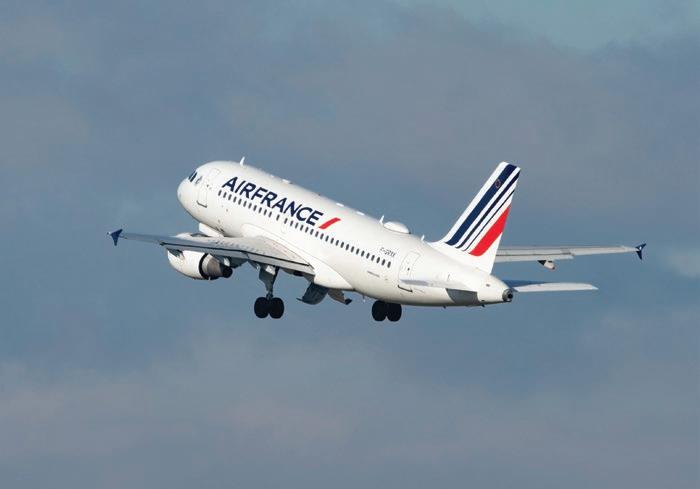
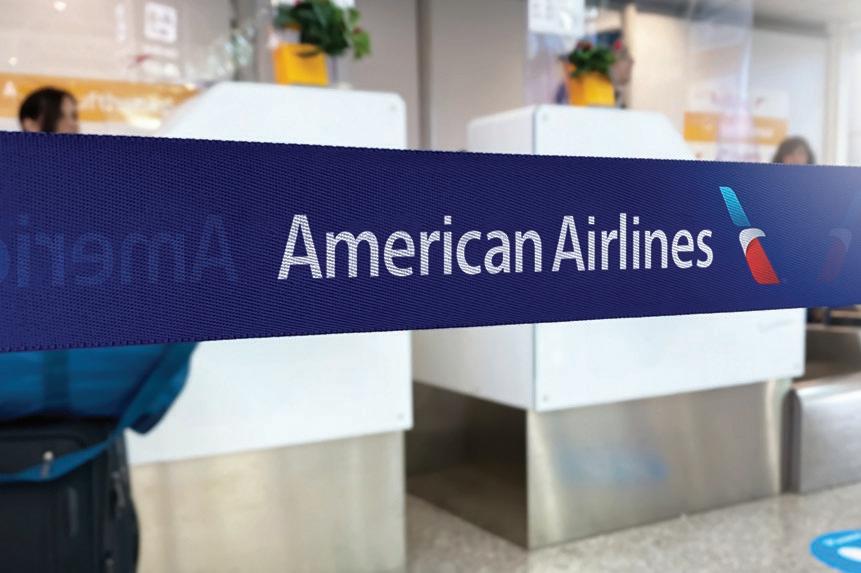
Concerns were raised by buyers about
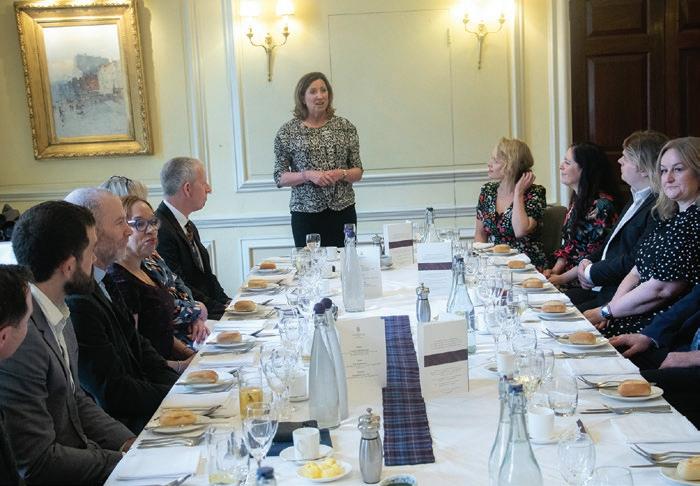
20 THE BUSINESSTRAVELMAG com
T h E N d C C o NUN d RUM
bu S ine SS travel FO ru M
Love it or hate it, NdC is here to stay and was the topic of a special Business Travel Lunch Forum
The smaller, more agile TMCs have been more likely to switch their business models to take control of the content they provide to their clients”
travellers booking outside of policy or losing trust in the value of travel programmes.
One TMC accused airlines of ‘distribution double-dipping’, similar to retail businesses which encourage customers to come into their stores but then don’t have the required product in stock and tell customers to shop with them online.
Other TMCs argued that the fares being withheld by the likes of American Airlines and the other airlines pushing the NDC agenda aren’t generally the flexible fares their clients want to book anyway.
Service levels
Servicing issues for NDC bookings were also highlighted as a potential problem, with airlines not always having the sufficent level of resources to deal with last-minute changes to bookings.
TMCs said if travellers face disruption from a cancellation or have to change a trip at the last minute, they expect a TMC to take care of the situation. But this can more difficult when that booking is direct with the airline and is not 'owned' by an agent through their IATA, with airlines not always providing adequate servicing.
Emerging technology
The forum participants agreed that the transition to NDC is accelerating, particularly with the latest move from American Airlines, which has removed 40% of its fares from the GDS. Some pointed out that Air France/ KLM and Air Canada are also now doubling down on their NDC strategies and said other airlines will follow suit.
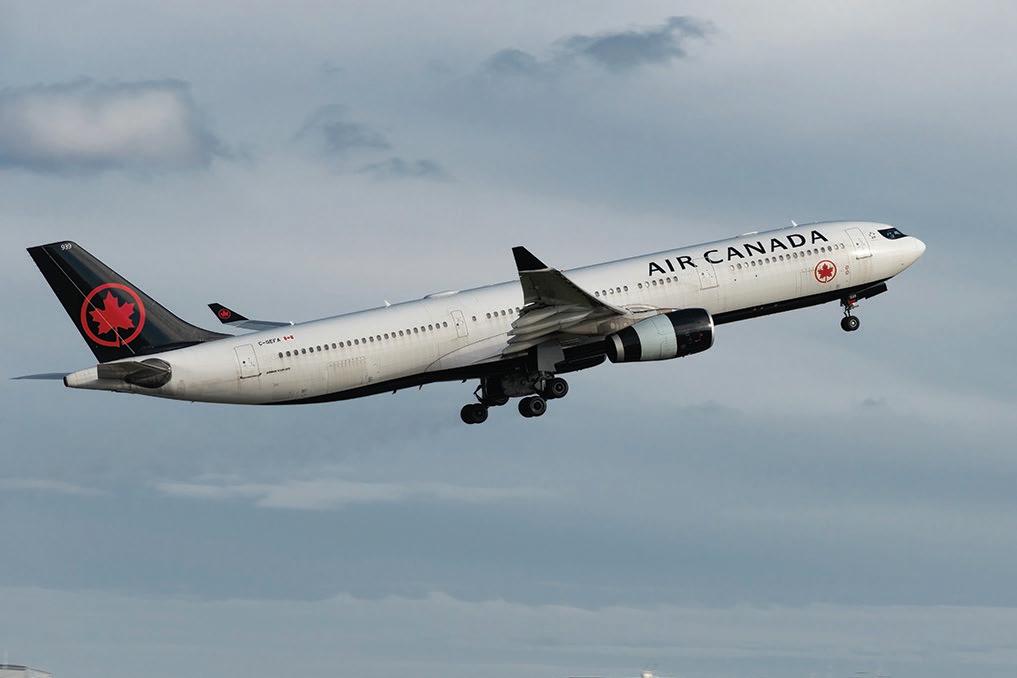
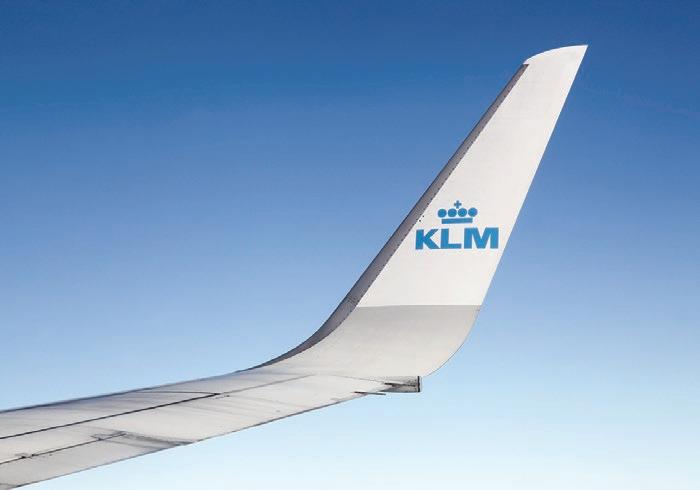
With this in mind, the group was asked to consider whether a single, central point of airline distribution will remain or if there will be multi-channels in future, supported by agile API technology that buyers can plug into or opt out of, taking control of the content their travellers have access to.

Drawing comparisons with TV streaming companies, such as Sky and Netflix, buyers said travellers and bookers should be given access to a full range of content with a userfriendly interface, similar to what they've become accustomed to using in their everyday lives.

With the technology already available, the group asked why there is still reluctance in some corners of the sector to make the
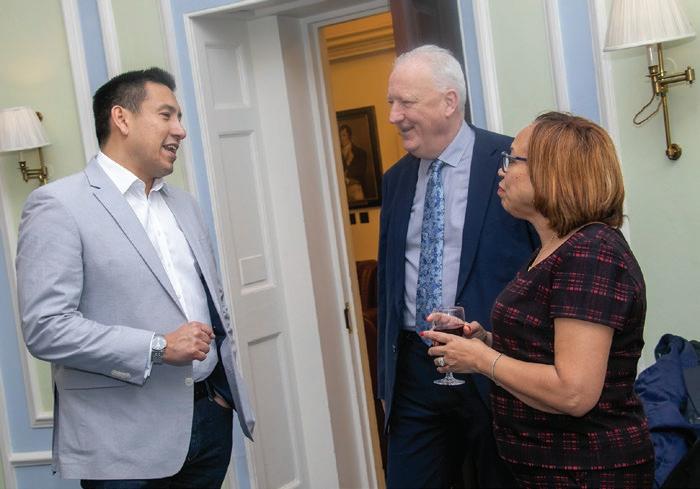
transition. Some questioned why the travel industry is risk averse and is often slow at adapting to change, demonstrated by the roll-out of e-ticketing which took 13 years. All agreed that the ultimate goal for TMCs must be to find ways to provide what their corporate clients want and need rather than being driven by historical money-flows and old ways of doing things.
With new aggregators or 'mini-GDSs' already emerging, one buyer called on those TMCs who are not yet NDC ready, or who are deliberately dragging their heels, to "stop being scared and step up" or risk their clients looking elsewhere.
21 THE BUSINESSTRAVELMAG com bu S ine SS travel FO ru M
With the technology already available, the group asked why there is still reluctance in some corners to make the transition. Some questioned why the industry is so risk averse”
With thanks to our event sponsors
EVENT IMAGES: P h IL GAMMON
ISTOCKP h OTO COM IMAGINIMA
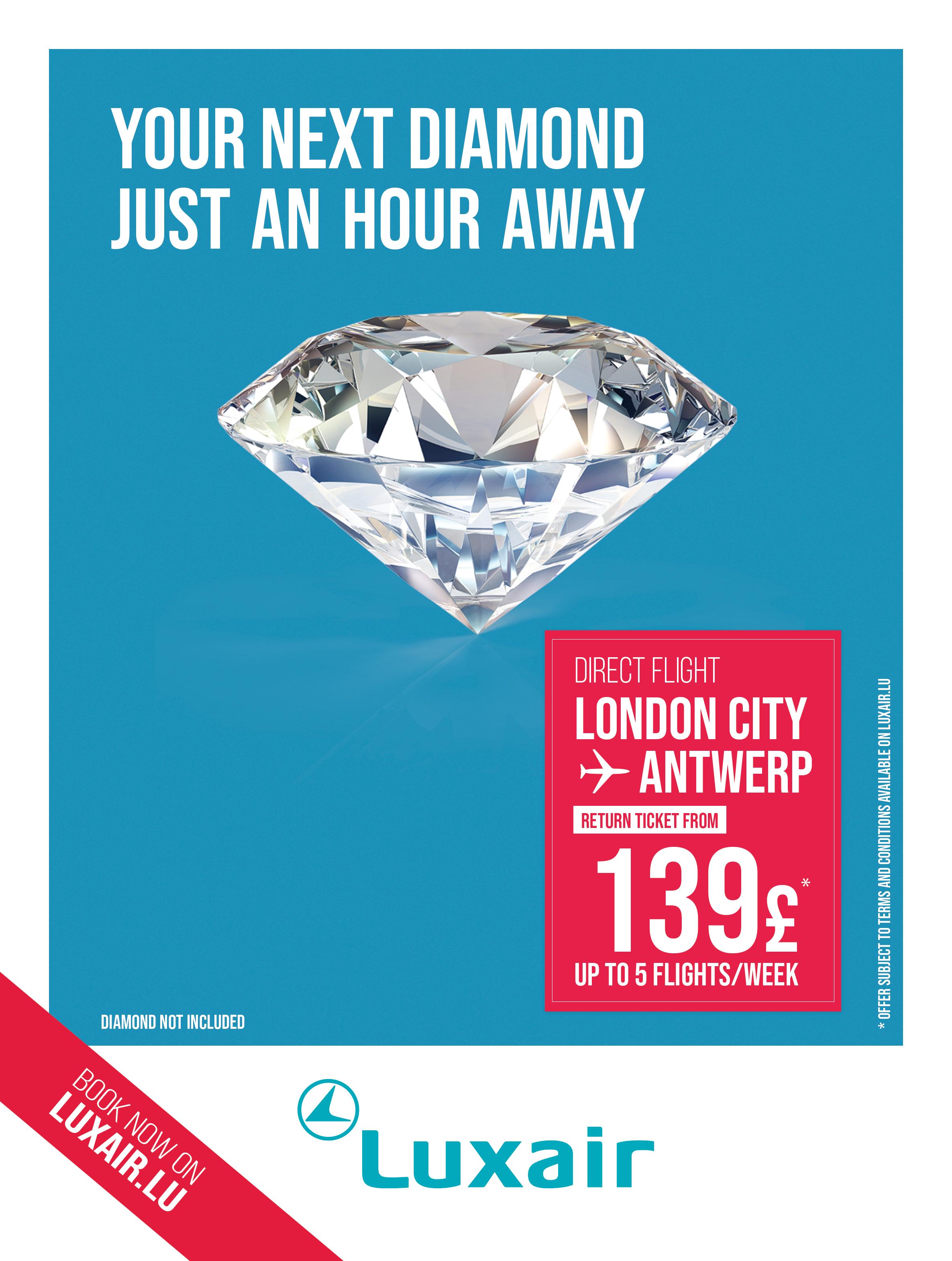
Untitled-2 1 01/03/2023 10:25
SU S tainable bUS ine SS travel
Whether you're right at the start of your sustainability journey, still trying to get to grips with the complexities, or well on your way to reducing the carbon footprint of your organisation's business travel, our essential guide brings you all the latest developments, expert insights and advice. Read on...
Starting point
If there were any doubt whether sustainability is high on corporate agendas, a survey by ITM in early April found 82% of travel buyers say business travel is now part of their organisation’s net zero roadmap.
Being able to source accurate, granular and standardised emissions data, carbon reporting and harmonising the metrics is business travel’s holy grail but it is largely absent from our industry’s eco system. However, this should not be preventing corporates from starting their sustainability journey and reducing carbon emissions. The spectre of reputational damage is the alternative if nothing is done.
Legislation will also drive companies to act, the latest being the EU’s CSRD policy, which forces large organisations to report emissions across their entire value chain. Detailed questions in RFPS also mean companies must take action.
But inertia has set in in some quarters of the travel buyer community.
”When I talk to corporate buyers they seem to be stuck in a valley between identifying sustainability as a corporate priority and knowing what to do about it,” says Guy Snelgar, Global Business Travel Director The Advantage Partnership.
”It’s not because of lack of will but because it’s so big,” he adds.
Baby steps are key and the starting point is carbon measurement. Data is nowhere near 100% perfect and Snelgar stresses that ”you can debate all day long which calculators to use and you can find flaws in any one of them,” but advises corporates to persist and go with what they've got.
Mark Corbett, Founder and Director of Thrust Carbon, adds: “Choose a data point and stick with it, so it’s consistent and you can still make good decisions.”
Many corporates have done just that, relying heavily on their TMC to calculate carbon usage across rail, hotels, cars and air from historic data.
Aggregating data from multiple sources improves accuracy and once you arrive at a figure the next steps are to set carbon reduction targets or instigate carbon budgets to run alongside travel budgets. Then, update policies, tighten pre-trip approvals, add CO² filtering in the booking tool so the message gets to travellers at point of sale, reward employees for doing the right thing, green the supply chain and launch communication campaigns to influence traveller behaviour.
Imperfections
None of those steps are easy. With air, for example, TMCs have partnered with third party carbon measurement and offset
companies such as Thrust Carbon, CHOOSE and Trees4Travel to augment what is imperfect Defra and ICAO data.
Defra and ICAO emissions data has to be enhanced by aircraft type, distance, class of travel, percentage of freight, configuration and passenger load factor.
Even that would not be 100% accurate and Dr Wendy Buckley, Client Director at Carbon Footprint, is waiting for particular granular data. “My hope for the near future is that we will see an exhaustive list of published CO² per passenger km for all airlines and that buyers will then have a choice of the lowest emission airline available for the route available,” she says. ”In the meantime, FreedomFlightPrize.org is consolidating publicly available data on this.”
Staying sustainable
Obtaining specific numbers from the accommodation sector is challenging

24 THE BUSINESSTRAVELMAG com Sustainability / Introduction
In your quest for sustainable business travel, don’t get bogged down by the detail; for now just work with what you’ve got, says Gill Upton
because the industry and stakeholder base is so fragmented. Averages are generally used and frustrations run high. One buyer said: “How do we do with hotels what we’ve done with air? The data is very inconsistent. We need accreditation and reporting and to be able to trust that it’s accurate.”
One solution comes from the Sustainable Hospitality Alliance (SHA). The combination of industry fragmentation and hotels not recognising the business case are why this sector is lagging behind, says Anna Dacam, Environment Programme Manager.
“There is a huge focus on data capture and a huge influx in requests but hotels are often getting overwhelmed by it,” she adds. The capex involved is significant as it’s far easier to build a green hotel than it is to retro-fit an old one.
Nonetheless, the SHA website provides free tools for hotels to counteract inertia, including how to build a business case, how
to promote their actions to their corporate clients and a step-by-step guide in the document ‘The Pathway to Net Positive Hospitality’.
For buyers the HCMI (Hotel Carbon Measurement Initiative) and a water equivalent (HWMI) provide a global comparative matrix, plus there is a list of questions for buyers to ask to check a hotel’s sustainable status. Trailblazers
include Hilton’s Light Stay, Soneva and Iberostar. Dacam believes that if enough hotels utilise the HCMI and HWMI data sets it will resolve the data capture issue.
The Cornell Benchmarking Index is another useful source of anonymised data by location, service levels and other filters.
Easy wins for hotels include measures such as improved insulation, LED lightbulbs, raising A/C temperatures by 1% or installing a heat pump or heat recovery system.
The right signal
The good news is that availability of accurate and consistent rail data should be available before the year is out, the result of the Rail Delivery Group’s "ground-breaking" panindustry research in 2022 called the Green Travel Pledge (GTP).
“Many buyers are using Defra but research showed additional data points were required to be able to validate it,” says Leigh Percy, Business Travel Lead Interim RGD.
GTP will result in granular data being made available across all rail operators by engine type, fuel type, distance, number of carriages, load factor by class, time of travel and more.
Rail could and should be the big winner in the modal shift from air and car but the recent questionable performance of some TOCs leaves a question mark over whether capacity and punctuality will keep pace with increased demand.
Nonetheless, a single train removes up to 500 cars off the road and if a car is the only option then electric and hybrid is the green way to go for fleet, rental and car-sharing.
Avis, for example, provides carbon footprint calculations, a carbon offset programme, over 30,000 hybrid and electric lowemission vehicles that are mostly less than 18 months old and fuel efficient. But a spokesperson warns “the road to electrification rests on a foundation of charging infrastructure”.
United front
Greening the supply chain is the hardest of all the steps. Your TMC can check suppliers’ green credentials and platforms such as Tripism can filter sustainable suppliers,

25 THE BUSINESSTRAVELMAG com
ISTOC k PHOTO COM /X TOC kI MAGES
When I talk to corporate buyers they seem to be stuck in a valley between identifying sustainability as a corporate priority and knowing what to do about it”
Introduction / Sustainability
but the biggest influence will be the corporate RFP. ESG has become an essential component of RFPs and if your supplier doesn’t cut it, it could be deleted from the programme and that action will help to drive change.
However, ITM CEO Scott Davies says: “It’s not a case of buyers putting pressure on the supply chain; this isn’t about a ‘them and us’ approach. It needs to be a collaborative approach.”
Scott advises buyers to start by showing suppliers the internal metrics they are working to and the way that their organisation audits sustainable travel in the context of ESG.
“It’s important for buyers to bring suppliers into the conversation and have mutual understanding,” he says. He also believes that those suppliers genuinely heading towards net zero will be easier for corporates to buy from.
To be fair, no supplier is standing still; it’s just taking time. Airlines are busy minimising energy, changing from fossil fuels to SAF/ green hydrogen-powered fuel and using carbon removal technologies.
“There is no silver bullet but a silver bucket of these three solutions, of different levers to be used at different times,” says Lahiru Ranasinghe, easyJet Sustainability Manager.
Reducing energy means fleet renewal, operational efficiencies and airspace modernisation. New aircraft bring improved fuel efficiencies but extended delivery dates
are hampering progress, while the target of 10% improvement over the European skies is entirely reliant on action by national governments.
The usage of fossil fuel alternatives such as SAF is slowed by availability issues and regulated quotas on fuel blend, while carbon-free green hydrogen-powered aircraft are in testing stage only. EasyJet has partnered with Rolls Royce to produce a business jet fuelled by green hydrogen.
On a macro level, industry bodies have been galvanising the industry: ITM with its Sustainable Task Force creating an output of hints, tips and opportunities, and the BTA with Planet Plan, a working group across members and partners to make the industry work together. The GBTA and VDA in Germany have been echoing these efforts.
All are doing their best to negate the perception that travel is a pariah when it comes to carbon emissions. “We are going to stop defending and get on the front foot. Travel is a power for good,” says BTA CEO Clive Wratten.
inGKa GrOUP
neS FirCrOFt
NES Fircroft is a recruitment specialist for the oil and gas, power and renewables, infrastructure, life sciences, mining, automotive and chemicals sectors. It has offices worldwide and a team of 1,700. Since 2021 it has committed to offsetting its entire staff travel, working closely with its global TMC, ATPI. In the first year the management team chose two projects – the Amayo Wind power project in southwest Nicaragua, and Breathing Space, a voluntary programme providing more energy efficient cooking stoves to households in rural India. In 2022, it decided to support other projects and let its staff take a vote. The workforce chose a tree-planting project in the Guizhou Province of China, protecting the globallyendangered Francois’ Leaf Monkey, and a reforestation project in Ghana. “Being a company
that’s looking to grow in the renewables space, we wanted to invest in projects that are commercially savvy but which also allow us to tell a story,” says Jamie Finnie, NES Fircroft Head of Travel. Alongside offsetting, the company has been working to reduce its business travel carbon footprint. It does not mandate choices but has been gently educating its sales teams, encouraging employees to question whether they need to travel to client meetings in volume or if some can go in person while others connect virtually. “We also ask them to consider if they need to visit the same place weekly or can reduce it to twice a month,” says Finnie. Reports are sent to regional MDs to show travel spend and ROI, with hints about how to travel more sustainably. Tips are also shared with staff on the company’s Intranet.
In 2018, Ingka Group, the largest IKEA retailer, set a target to halve greenhouse gas emissions of its business travel, co-worker commute and customer delivery by 2030, using 2016 as the baseline. With sustainability, wellbeing and cost control firmly embedded in its values, Ingka Group’s policy restricts all air travel to economy class only, for its entire workforce, while for car rental it actively encourages the use of EV or hybrid vehicles when available. Offsetting is not part of the strategy. “We don’t believe in offsetting. We believe in genuine reduction,” says Sue Jones, Global Meetings and Travel Manager. With more than 90% of trips booked on its online booking tool, the company “nudges” its co-workers to make sustainable choices at the point of booking. “Rather than us having to mandate or push people into making sustainable decisions, they are already thinking about the carbon impact and come to us with ideas," says Jones. In the next phase, Ingka is working with its TMC and data specialists to create dashboards for each individual traveller, showing the sustainable, wellbeing and cost impact of their choices on a trip-by-trip basis. Designed to be visually impactful, comparisons will be used to show the consequences of decisions. Dashboards will be delivered to travellers via email and will also be shared with line managers, so comparisons can be made between different parts of the business. Insights are based on Defra methodology but the travel team is monitoring developments in that space. “We're working with the best that’s currently available. We need to have consistency,” says Jones. “There is already a huge appetite for this kind of information and insight and we're confident we will see our co-workers making better decisions as a result,” says Jones. “But if we feel change isn’t moving fast enough, we are also looking at other measures further down the line, such as setting carbon caps. We believe caps are more effective than allocating carbon budgets, as with budgets there is often a mentality that you need to spend that budget.”
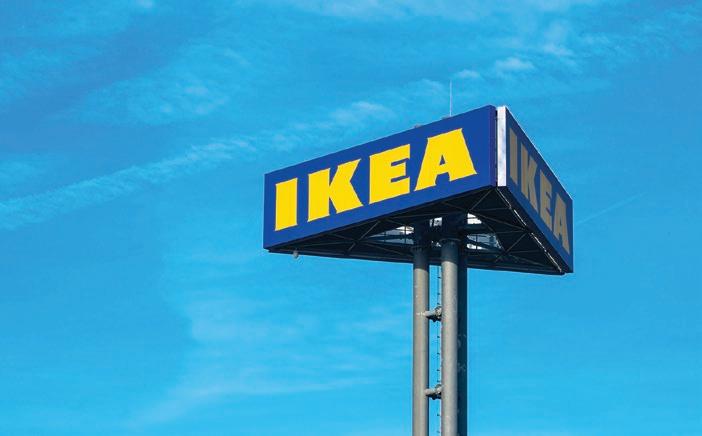
Sustainability / Introduction
26 THE BUSINESSTRAVELMAG com
Data is nowhere near 100% perfect...you can debate all day long which calculators to use and you can find flaws in any one of them”
CASE S t UDY
CASE S t UDY
FROM EAST COAST TO WEST COAST,

WE ’ VE GOT AMERICA COVERED .
New Delta flights from the U.K. are offering customers even more options when it comes to planning travel to the United States with daily services from London-Heathrow to Los Angeles and London-Gatwick to New York-JFK. Together, Delta and partner Virgin Atlantic will offer up to 40 daily flights between the U.K. and the U.S. this summer.

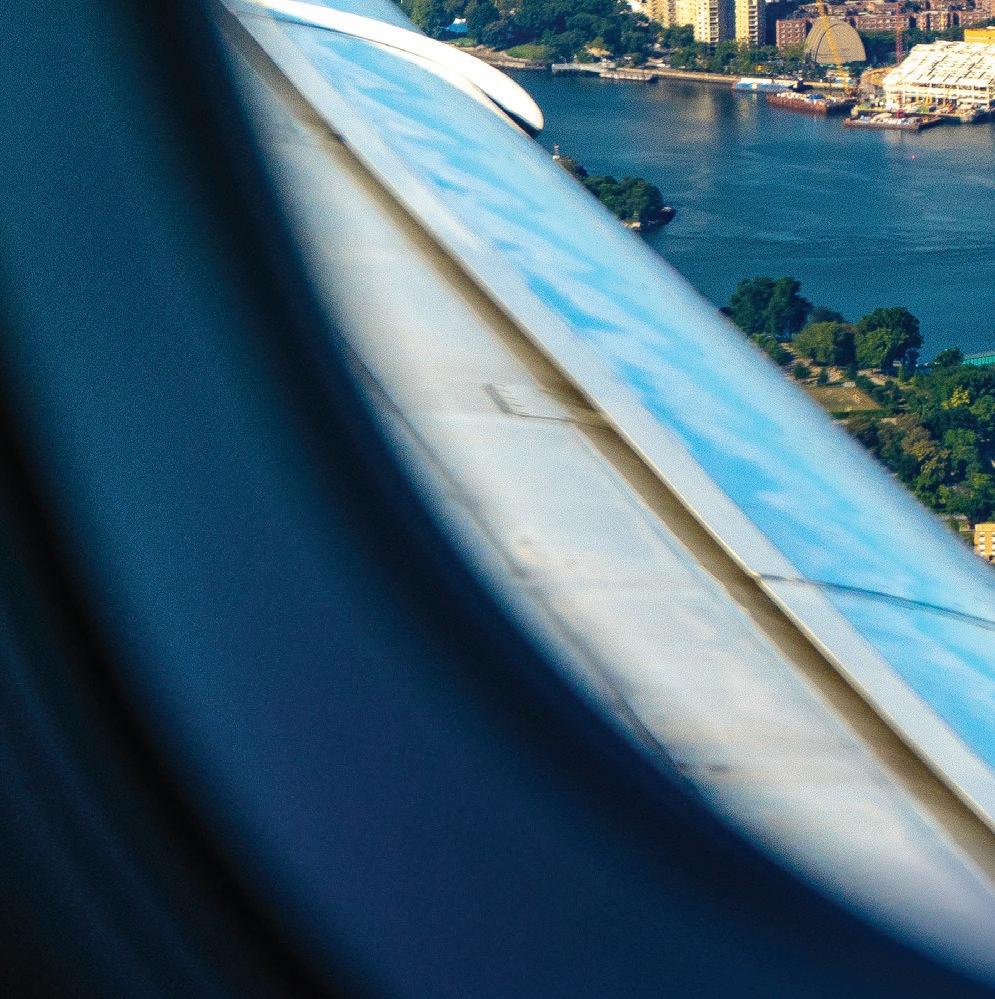





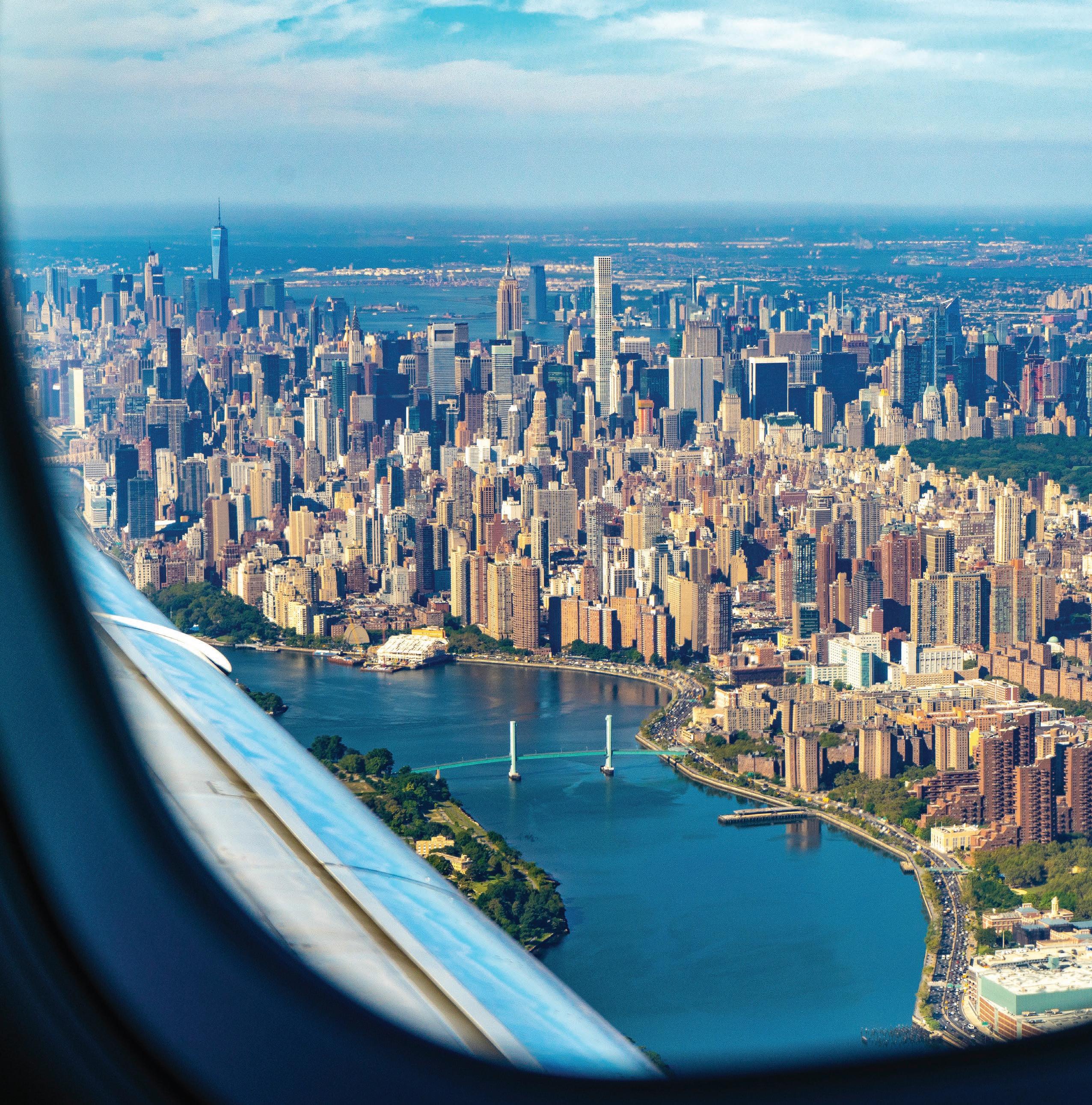
GREENER SKIES
For more sustainable flying, Lufthansa Group has launched Green Fares. We spoke to Heinrich Lange, Senior Director Sales Northern Europe
possible to purchase SAF directly from the Lufthansa Group, where the corporate customer will receive an official CO² mitigation certificate to deduct Scope 3 emission for its ecological balance reporting. In addition, PartnerPlusBenefit points can be redeemed for the purchase of SAF or to offset an organisation’s CO² footprint through climate protection projects via a high quality portfolio from Lufthansa Group partners such as myclimate.
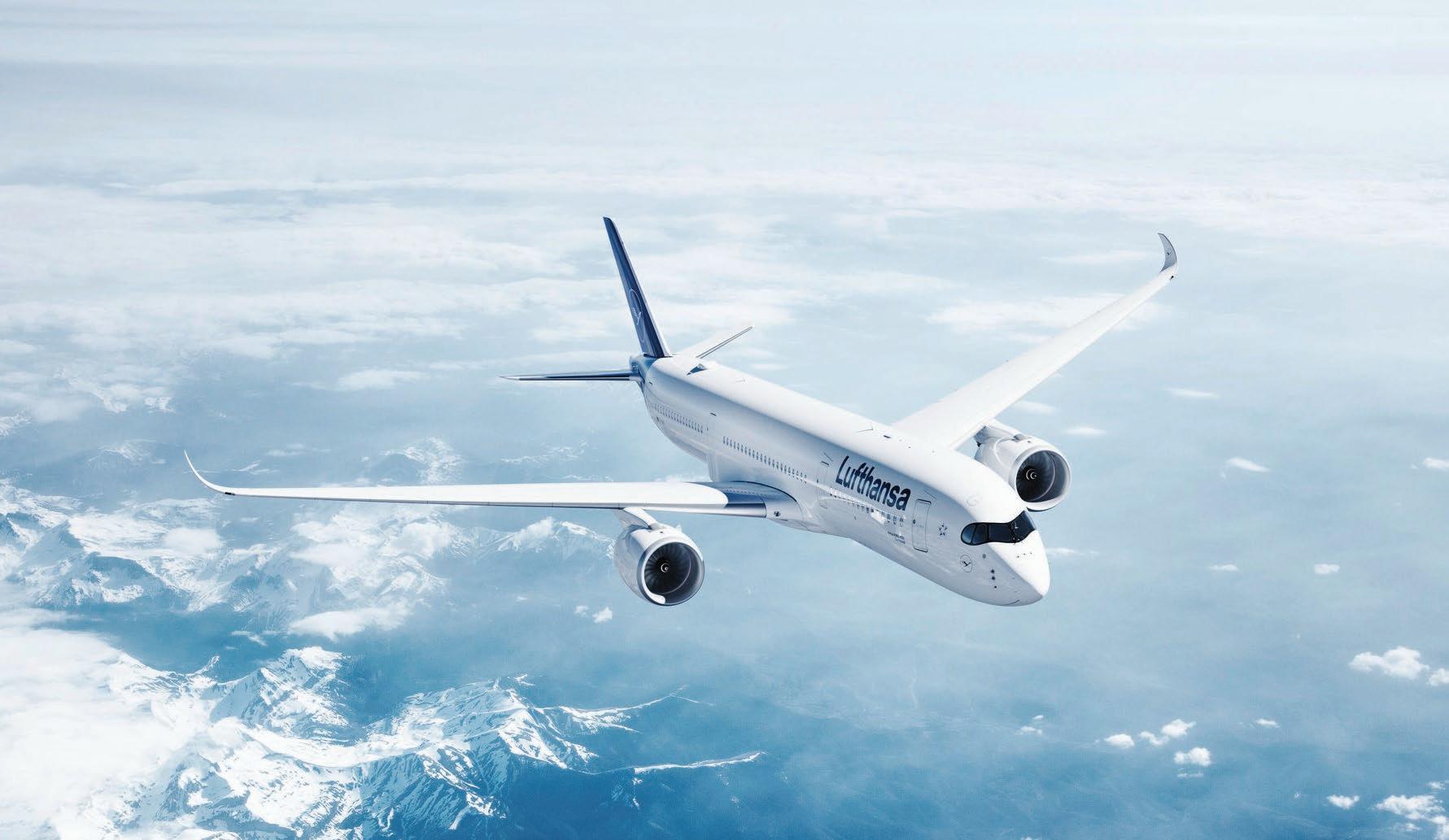
What has the response been since the fares were launched in February?
The Green Fares were successfully tested in Scandinavia last year and were launched in Europe this spring. The demand is on track with our expectations and further indicates a growing interest in sustainable travel. We are confident that by the end of 2023 at least 5% of our guests will offset the CO² emissions of their flight through one of our various carbon offset options. We are encouraged by the fact that today, 10% of the overall offsetting is done by SAF.
What is Lufthansa’s sustainability strategy?
In a nutshell, what are Green Fares?
Green Fares are a new product for more climate-friendly flying as the fares already include offsetting of flight-related CO² emissions. This is achieved by using 20% Sustainable Aviation Fuels (SAF) and 80% by contributing to high-quality climate protection projects. Green Fares are available on more than 730,000 flights a year within Europe with Lufthansa, Austrian Airlines, Brussels Airlines, SWISS, Edelweiss, Eurowings Discover and Air Dolomiti.
What is the price point?
Adding another pillar to the Lufthansa Group fare structure, Economy Green sits alongside Economy Classic and Economy Flex fares and Business Green with Business Saver and Business Flex.
What are the other benefits?
Green Fares offer an additional 20% status miles, 20% award miles and a free rebooking option.
How can Green Fares be booked?
Green Fares are available for individual customers and corporate partners and can be booked on each of the Lufthansa Group airlines' websites as well as through NDC.
What other options are you offering to corporates who want to fly more sustainably?
For corporate customers, Sustainable Corporate Value Fares are offered, also with a ratio of 20% CO² reduction via SAF and 80% CO² offsetting by contribution to climate protection projects. It is also
By 2030 the Lufthansa Group wants to halve its net CO² emissions compared to our footprint in 2019 through reduction and compensation measures. On top of that, we aim to achieve a neutral CO² balance by 2050. Lufthansa Group was the first airline group in Europe with a science-based CO² reduction target in line with the goals of the 2015 Paris Climate Agreement, which is a validation that underlines our engagement and commitment.
Apart from Green Fares, what other sustainable measures are you implementing?
We are investing billions of euros in fleet modernisation and are continuously optimising our flight operations to reduce emissions from flying. We are supporting climate science by providing flying climate labs with partners. We are also taking action to reduce waste, to eliminate the use of single-use plastic and aluminium on our flights, and to introduce additional measures that will reduce the noise emissions from flying.
28 THE BUSINESSTRAVELMAG com
LUFTHANSA G R o U p
Sustainability / Insight
By 2023 the Lufthansa Group wants to halve its net CO2 emissions compared to 2019 through reduction and compensation measures”









#MakeChangeFly AIRCRAFT NEED FUEL, BUT FUEL DOESN’T NEED TO BE FOSSIL. makechangefly.com The Lufthansa Group is investing millions of euros into Sustainable Aviation Fuel, a true alternative to fossil fuel. Already today, you can use it to make your flight carbon-neutral. At the same time, we are driving the development of new technologies so that these fuels become available in larger quantities and at lower prices as quickly as possible. Learn more at makechangefly.com
Well-oiled MACHINE
Not a week goes by without a SAF announcement from an airline, but is it really the way to Jet Zero?
Gary Noakes investigates
If you listen to airlines, oil companies and governments, you’d be forgiven for thinking sustainable aviation fuel (SAF) was the panacea for all our climate change ills.
Whether produced from household or agricultural waste or made by using the most environmentally-friendly process –direct air capture – SAF is regarded the eventual replacement for kerosene. Initially it will be blended with conventional fuel but once production increases and engines are adapted, it will be the sole propellant.
SAF is aviation’s major weapon in the fight against climate change and to counter the bad press that flying continues to receive.
The need to tackle global warming was underlined beautifully last July when former transport secretary Grant Shapps chose the UK’s hottest day ever to unveil his Jet Zero Strategy at the Farnborough Air Show, where tarmac softened as the mercury
reached 40C. Jet Zero commits UK domestic aviation to achieving net zero emissions by 2040 and for all airports in England to be zero-emission by the same date, with the whole industry net zero by 2050.
SAF is a key component of Jet Zero but also its major obstacle because of scarcity of supply globally. This was illustrated in December when United Airlines, which has pledged to be carbon neutral by 2050 without offsetting, promised to purchase 7.1 million gallons of SAF – almost twice all current global airline SAF commitments. It is a laudable quest, but one to be seen against United’s annual need for four billion gallons of conventional kerosene.
Delta is similarly striving to secure supplies, describing SAF as “our greatest mediumterm solution to drastically reduce aviation’s carbon footprint” while admitting: “There is not enough SAF to run a fleet Delta’s size for a single day.”
Delta has so far signed enough SAF deals to meet half of the 200 million gallons a year needed to meet its 10% target by 2030.
Via Delta, Virgin Atlantic has sourced 70 million gallons of SAF over the next seven years at Los Angeles and San Francisco. Manufacturer Gevo separates sugars and proteins from industrial corn, turning the sugar to SAF and protein to animal feed.
Virgin says this will power the equivalent of more than 500 transatlantic flights from Los Angeles.

Sustainability / SAF
30 THE BUSINESSTRAVELMAG com
SAF is aviation's major weapon in the fight against climate change and to counter the bad press that flying continues to receive”






31 THE BUSINESSTRAVELMAG com SAF / Sustainability
Carriers are meanwhile offering offsetting schemes to business travellers in a variety of forms.
Last year, Lufthansa Group began introducing business and economy class Green Fares on European services, with 80% CO² compensation via offsetting projects and 20% via SAF.
It offers Corporate Value Fares, which automatically include offsetting and perks like free Wi-Fi or better booking conditions. Lufthansa PartnerPlusBenefit points can also be converted to SAF, something the group said had proved popular, with a minimum 4,500 points - corresponding to €50 - required.
With supply of SAF so restricted it is two to five times more expensive than kerosene, depending on source and location, and passengers will ultimately foot the bill.
The US Environmental Protection Agency estimates just over 2.4 million gallons of SAF were produced there in 2019, compared to 21.5 billion gallons of conventional kerosene used by US airlines, making SAF only 0.01% of its total jet fuel supply.
As part of Jet Zero, the UK government has committed to building "at least five” commercial scale SAF plants by 2025, helped by £165 million from the Advanced Fuels Fund. Of this, £22 million will be reserved for direct air capture projects – the most sustainable form of SAF because it combines captured CO² with hydrogen to make liquid fuel.
In Europe, a new RefuelEU political agreement sees regulators opt for a mandate approach to build the necessary demand for SAF, but the GBTA believes this needs to be backed by financial support.
Across the Atlantic, there is more optimism conversion to SAF is achievable. The aim of the US Government’s SAF Grand Challenge is to supply 100% of aviation fuel demand by 2050. The US Office of Energy Efficiency and Renewable Energy estimates a billion dry tons of biomass “can be collected sustainably each year”. This includes wood mill waste, corn grain and algae, the latter being a SAF production source in which United Airlines has invested $5 million.
US officials say this would be “enough to
produce 50-60 billion gallons of low carbon biofuels, adding: “This vast resource contains enough feedstock to meet the projected fuel demand of the US aviation industry.”

The US ambitions are backed by the government to the tune of $4.3 billion, putting UK investment in the shade.
Here, environmentalists are quick to point out flaws in Jet Zero. In March, climate change charity Possible asked for a judicial review, arguing Jet Zero relies on “pie in the sky technologies”.
“SAF is a blanket phrase the aviation industry has come up with that creates a misleading impression,” said Alethea Warrington, Aviation Campaigns Manager.
“The idea that these fuels will permit the industry to service a 70% increase in demand is completely unrealistic. We need to move away from burning things because there is no sustainable pathway to create fuels from biomass or waste. Biowaste, for example, can be used as fertiliser but not if it’s being burnt in jet engines.”
Warrington adds: “From a business travel perspective, the only answer, unfortunately, is to fly a lot less.”
Andreas Slettvoll, Chief Executive of carbon impact specialists CHOOOSE, believes offsetting, despite its flaws, will be around for decades. “Is it a long-term solution? No. Is it better than doing nothing? I think so,” he says.
“Today there is not enough SAF available, so some type of offsetting is needed, and it will probably still be needed in 2040 or 2050. Will that be the same type of offsetting as today? I hope not, I hope we will see more (carbon) removals.”
Even if SAF production gears up in Europe, Slettvoll points out there will be parts of the world that lag. “There is no SAF in Latin America or Africa, so how do those airlines contribute and more importantly, how do their passengers address it? Today, I don’t see any other model than ‘book and claim’. Most airlines have no chance of local SAF access," he argues.
When he unveiled Jet Zero, Shapps heralded it as the start of “guilt-free flying”, but many others do not see it that way, particularly with the miniscule amount of SAF available. Excuse the pun, but expect this issue to generate lots more hot air in years to come.
Sustainability / SAF
32 THE BUSINESSTRAVELMAG com
Today there is not enough SAF available, so some type of offsetting is needed, and it will probably still be needed in 2040 or 2050”
Fuelling innovation
The pioneering flight aims to demonstrate the ability of UK aviation to reach net zero and prove the capabilities of SAF to help the industry in the research, certification and technology developments required to push for an increase in SAF production and regulatory approvals. In addition to SAF, the consortium has ambitions to deliver ground and flight efficiencies to cover research on the non-CO² effects of flying.
An upscale in SAF production and a change in regulatory approvals is key to meeting net zero by 2050 as part of aviation's commitment to using 10% SAF by 2030 on the road to this goal. When fully replacing kerosene, SAF can slash lifecycle carbon emissions by over 70% compared to conventional fossil jet fuel. But current fuel specifications are limited to a maximum of 50% SAF blended with kerosene.
Even after considering the limited availability of SAF in a production constrained market, there are still a number of complexities. These include resourcing, safety and technical approval processes that need huge amounts of collaboration across the OEM community, internal engineers and external stakeholders, such as CAA and DfT, as well as the scale of the logistics challenge to keep the fuel separate from the rest of the fuel farm. The sheer number of firsts is also compounded by trying to deliver efficiency savings, contributing to research and development of non-CO² effects of flying – all whilst trying to maintain engagement and relevance with customers.
The climate crisis is the single greatest challenge of our lifetime, and the aviation industry is committed to continue connecting people and trade across the globe, but with an even greater focus on doing so sustainably.
At Virgin Atlantic, we have already invested heavily in transforming our fleet into one of the youngest and most fuel efficient on the transatlantic route and we are now looking to build on our previous pioneering sustainability
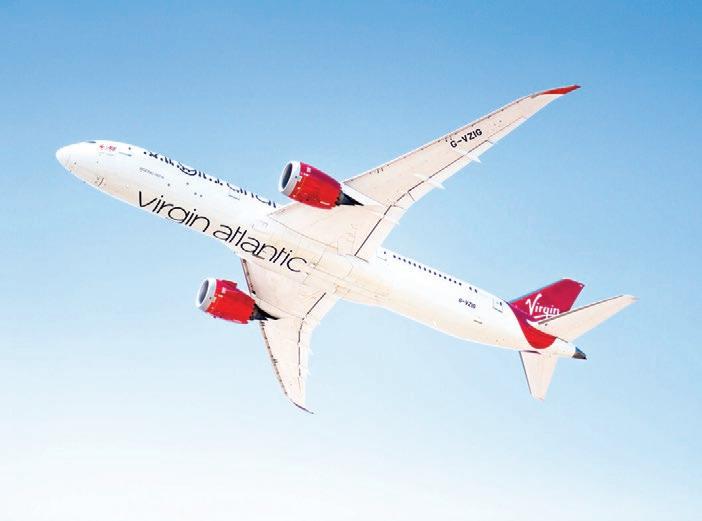

efforts by delivering the first ever transatlantic flight with 100% Sustainable Aviation Fuel (SAF).
For long-haul travel, SAF represents the industry’s biggest opportunity to decarbonise. In order to do so, capability needs to be built now to demonstrate that today’s engines, a-frames and infrastructure are capable of safely flying using 100% drop-in SAF.
The 100% SAF, transatlantic flight will operate in late 2023 from London Heathrow to New York JFK. We are leading a consortium of bestin-class partners as part of the project, including Rolls-Royce, Boeing, Imperial College London, University of Sheffield, Rocky Mountain, ICF and Institute (RMI).
The aircraft will be fuelled by 100% SAF, which combined with carbon removals through biochar credits – a material which traps and stores carbon taken from the atmosphere – will counterbalance any residual emissions of the flight.
The challenges are numerous but the consortium brings together the right partners to help deliver with a safety-first approach, working closely with regulators to test and seek relevant approvals along the way.
The process takes time, but cross industry and government action to see this 100% SAF flight take off later this year is key in demonstrating aviation’s net zero future.
33 THE BUSINESSTRAVELMAG com
VIRGIN ATLANTIC
In addition to SAF, the consortium has ambitions to deliver ground and flight efficiences to cover research on the non-CO2 effects of flying”
Insight / Sustainability
Tom Maynard, Director Global Corporate Sales, Virgin Atlantic, outlines its plans to fly the first 100% SAF transatlantic flight
Lightening THE LOAD
April Waterston explores how airlines are striving to make flights greener through inflight products and services
Airlines know they need to up their game in the fight to make travel more sustainable. It’s a challenge they are, for the most part, taking very seriously.
“We’re embracing a new goal to be 100% green by 2050 by reducing our greenhouse gas emissions,” says Scott Kirby, CeO United airlines. “We’ll get there, not with flashy, empty gestures, but by taking the harder, better path of actually reducing the emissions from flying.”
While the research and development of Sustainable aviation Fuel (SaF) is often considered the number one solution, there are countless other ways in which airlines are trying to better their sustainability credentials. Subtle changes to the onboard products
and services might not make the headlines, but they can still have a big impact.
two key sustainability buzzwords in the inflight industry are ‘weight’ and ‘waste’. reducing weight on board is a top priority for airlines, as ultimately that is how they can limit the amount of fuel needed to burn for each flight, SaF or otherwise. airlines are constantly trying to reduce weight on board, from the chairs passengers sit on to the cutlery they use and everything in between.
Helping travellers to understand the role they can play in reducing weight and waste on board is a good way to empower them to take their emissions into their own hands, for example, through reduced luggage weight.
Finnair has calculated that if each of its passengers were to reduce luggage weight by 5kg, the total reduction would reach almost 17,000 tons of CO².
Meal prep
Iata research has shown the average passenger generates 1.43kg of cabin waste per flight, with 20% of this being completely untouched food and drink.
as a result, travellers and travel managers may have noticed an increase in the number of airlines requesting passengers to preorder or even opt out of their meals. Preordering means airlines can load the amount of meals they need and less food ends up being wasted.
reducing waste, while helping to reduce weight, also limits the amount of single-use plastic and items that need to be destroyed. Strict laws currently mean that the majority of waste product from planes has to be incinerated upon arrival, primarily to reduce the spread of diseases.
Behind the scenes, airlines and their caterers are trialling innovative methods to reduce food waste.
One of the world’s biggest airline caterers, LSg group, and aircraft manufacturer airbus have both trialled technology that uses artificial intelligence and consumption analytics to scan food trays post-flight to see what food is most commonly left uneaten. this technology, hypothetically, would allow chefs to redesign their menus to leave out items that are wasted.


Cathay Pacific Catering Services (CPCS) has joined a pilot scheme for food waste collection which will see it transformed into energy and compost, while Japan airlines has introduced the option to skip its inflight meal service in order to reduce food waste, instead donating the meal to those in need.
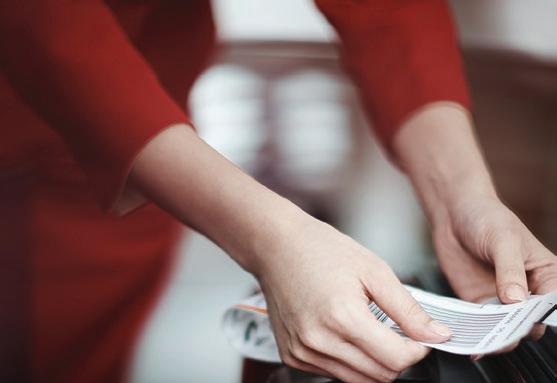
Here are some of the other initiatives airlines are taking to reduce their carbon load:
VIRGIN ATLANTIC
In addition to reducing its inflight weight and carbon footprint, Virgin atlantic has set itself the challenge of removing 90% of raw
34 THE BUSINESSTRAVELMAG com Sustainability / Aviation
EXCESS BAGGAGE
Alaska Airlines has become the first US airline to remove all plastic cups on board and replace them with a more planetfriendly alternative”
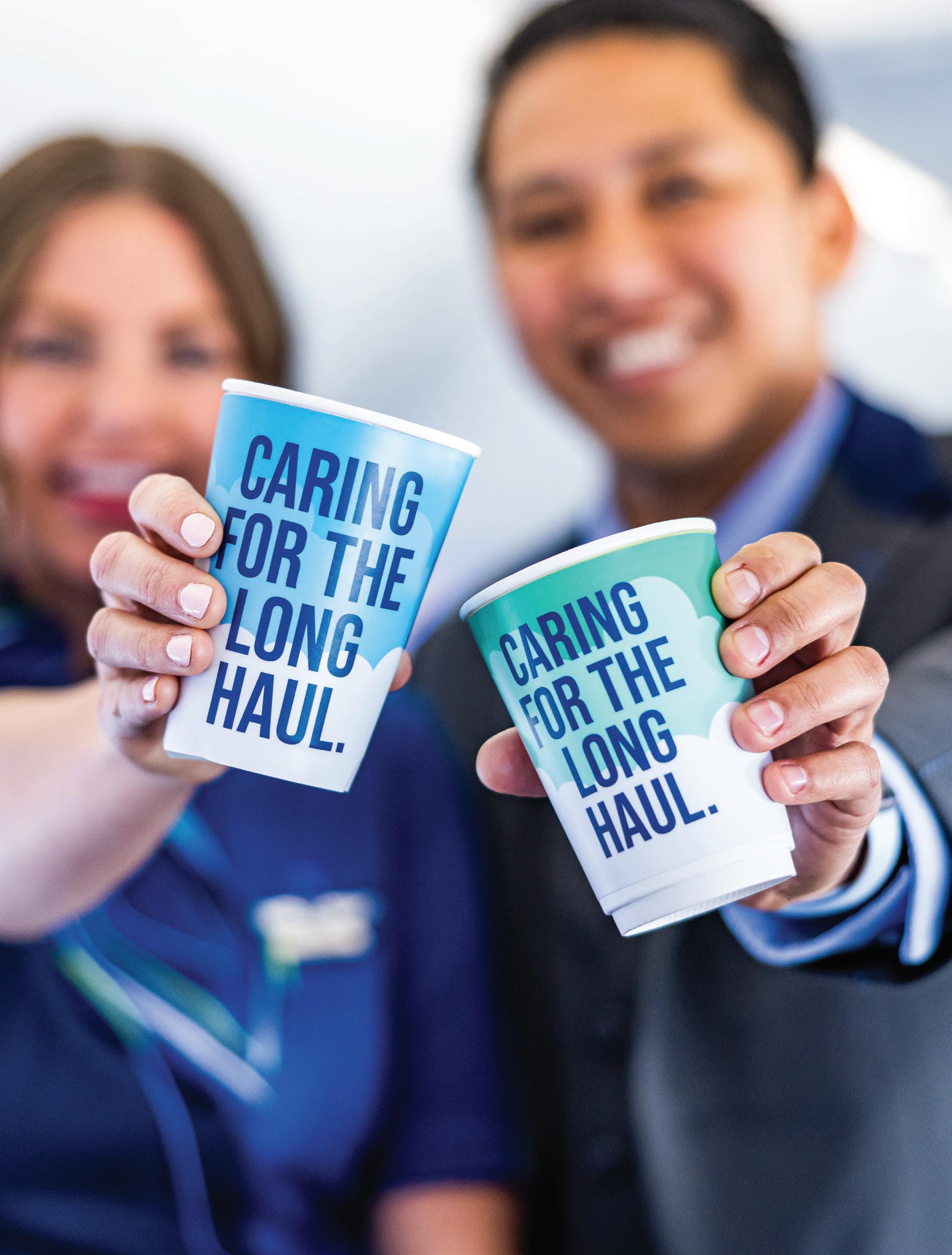
Aviation / Sustainability 35 THE BUSINESSTRAVELMAG com
Ingr d Barrent I ne
ALASKA AIRLINES
single-use plastics onboard. this has led to a complete overhaul of its onboard service items, with beverages being a key focus area – especially water bottles. as a result, last year it introduced CanO resealable cans of water to its Upper Class cabins.
DELTA AIR LINES
delta has partnered with a Mexican apparel brand called Someone Somewhere to create the amenity kits for its premium delta One cabin. the partnership has created jobs for more than 250 people in five of Mexico’s most vulnerable states. the amenity kit eliminates five single-use plastic items such as zippers and packaging, reducing plastic use by up to 90,000 pounds on an annual basis. the artisanal production process also eliminates waste and uses regenerated cotton.
LUFTHANSA
as part of its Lufthansa’s Onboard delights offering, a large proportion of the fresh products are packaged in PaperWise material, made from agricultural waste material and produced using 100% renewable energy, making it CO² neutral. By producing the fresh products in a way that's more in line with the demand, less unused food has to be disposed of. By 2025, Lufthansa aims to replace all single-use plastic articles with sustainable materials.
JETBLUE
JetBlue has recently introduced a sustainablysourced vodka seltzer from PLant Botanical to its inflight food and beverage offer. PLant
Botanical is a female-founded, femalefunded and female-distilled company focused on better, sustainable and functional ingredients. JetBlue also offers its Business Class passengers amenity kits that focus on reusability.
ALASKA AIRLINES
alaska airlines has recently become the first US airline to remove all plastic cups on board, replacing them with a more planetfriendly alternative. all inflight beverages on alaska flights are now served in Forest Stewardship Council (FSC) certified paper cups or reusable glassware for most FirstClass services. It's a move that has allowed the airline to eliminate more than 55 million plastic cups annually.
FINNAIR
Since February 2023, Finnair has stopped its inflight retail service. “Onboard and preorder shopping has become a less important service among our customers,” explains Valtteri Helve, the airline's Head of Product Offering. “In spring 2020, we announced that we were discontinuing inflight sales on our flights within the eU as part of our goal to reduce the overall weight of the aircraft and now it is time to take the next step and discontinue them worldwide.”
UNITED AIRLINES
United airlines has partnered with Los angeles-based Impossible Foods to develop more planet-friendly vegan meals on all domestic flights of 800 miles or more. Other vegetarian and vegan meals can be ordered ahead on certain flights. additionally, at its Chicago O’Hare, Los angeles, newark and San Francisco Polaris lounges, United now offers ground Impossible Sausage as an optional omelette ingredient and Impossible Sausage breakfast patties in the buffet.

AER LINGUS
In 2022 aer Lingus replaced plastic cutlery with packs made from birch wood, a sustainable material, resulting in a reduction of almost 23 tonnes of single-use plastics per year. It also introduced a digital alternative to newspapers and magazines on board, which has resulted in it being able to save 14 tonnes of paper each year.
EMIRATES
emirates’ economy Class amenity kits are reusable, made from washable kraft paper and contain durable travel essentials made from environmentally-friendly materials such as rice paper, wheat straw and rPet (recycled polyethylene terephthalate). the airline’s complimentary toy bags, baby amenity kits and plush toys are also made from recycled plastic bottles.
LATAM
Latam has reduced 77% of its onboard single-use plastic (equivalent to 1.485 tons) by replacing it with more sustainable materials, including bamboo mixers, paper ribbons to wrap blankets and pillows, sugar cane caps and a new amenity kit. It has also launched ‘recycle your Journey’, which allows the airline to recycle waste collected on board in domestic flights, setting aside aluminium, glass and plastic.
AIR FRANCE
For flights departing from France, the meals served onboard air France are prepared locally from 100% French meat, dairy and eggs. the airline claims it uses sustainable fishing and provides a systematic choice of vegetarian dishes in all classes. air France has also introduced pre-ordering for meals in Business Class, which has resulted in a reduction of hot dish loading ratio by 20%, thus reducing onboard waste and weight.
BRITISH AIRWAYS
British airways is removing all plastic bags from flights and introducing amenity kits and duvets made from recycled plastic. It has installed water taps in its airport lounges, saving approximately 1 million glass bottles a year, and the removal of plastic packaging from its World traveller Plus blankets, saving 20 tonnes of single-use plastic last year.
36 THE BUSINESSTRAVELMAG com Sustainability / Aviation
UNITED POLARIS
Reducing waste, while helping to reduce weight, also limits the amount of single-use plastic and items that need to be incinerated on arrival”
UNITED AIRLINES' VEGAN OPTION


MOVERS & SHAKERS Sustainability
EVENT CYCLE
Event Cycle is an innovative new business to help event and project planners reduce waste and create a positive impact. Its mission is to reduce waste post event by changing mindsets, repurposing and redistributing materials to charities and the event industry, and encouraging a change to a circular economy. Being involved at the inception of a project, it advises on rethinking the waste management systems and supports the design for the greatest impact.
BLACK BOX VERDICT A unique concept, this business is passionate about changing mindsets in the events industry.
ECO.MIO
eco.mio enables companies to achieve their climate goals while reducing costs. Its software seamlessly integrates into any online booking tool, incentivises employees to book greener travel options and allows companies to monitor the resulting carbon and cost savings through a performance dashboard. It determines companyspecific benchmark behaviour of each planned trip at the point of sale. Its algorithm considers historical booking behaviours, pricing, market availability and the company's travel policy.
BLACK BOX VERDICT eco.mio meets the challenge of educating travellers and driving sustainable choices.
Ones to watch in the sustainability space
RESPONSIBLE FUTURES
Responsible Futures educates, inspires and guides people and businesses to become more sustainable and socially responsible with training, webinars and consulting. Training courses are designed to give organisations an understanding of what sustainability truly entails, how it affects day-to-day operations and the achievement of business objectives. They teach the importance of sustainability and social responsibility and provide the knowledge and tools needed to make a positive impact on the environment and society. A consulting arm provides advice on carbon footprint measurement and
SQUAKE
SQUAKE’s end-to-end solution has been designed specifically for the travel industry as a single API plug-in to power precise carbon calculations for all types of activity, including flights, car and hotel according to national and international standards. Powering accurate carbon calculations and providing tangible compensation of all travel and transport related emissions, SQUAKE's solution is fully customisable and partners can decide which calculation framework is most relevant to their product or programme. They can also create their own compensation portfolio to be
setting SBTi targets, supporting clients on their ESG journey, plus a wide range of educational webinars.
BLACK BOX VERDICT This business is striving to enlighten the industry with knowledge and practical solutions.
selected from SQUAKE's curated partner network, which includes certified climate protection organisations, as well as providers of innovative climate technologies and sustainable aviation fuel providers.
BLACK BOX VERDICT SQUAKE's carbon calculations are customisable and we particularly love that there is a ‘freemium’ entry level for small businesses. This Berlin-based business is one to watch.


38 THE BUSINESSTRAVELMAG COM
We admire the effortless approach, truly delivered in the ease of integration and the simplicity of the everexpanding product suite”
Sustainability


TRAVEL PLANET
Travel Planet offers an all-inclusive style TMC solution. This French-owned business is also carbon neutral and ISO14001 certified. Its proprietary technology platform ‘Click & Control’ is a modular marketplace, with limitless integration capabilities to maximise the ever-evolving travel distribution eco system. Travel Planet has market leading NDC capabilities and presents emissions data at point of sale, enabling the
HUBLI
One of the leading online booking tools for meetings, off-sites and group stays, hubli offers hubli Green, a dedicated sustainability product for business travel and meetings, which allows meeting and event planners to choose venues and locations based on the lowest CO² emissions, book sustainable spaces and remove high waste items from meetings. Users have access to a 'Where to meet?' console allowing them to calculate the lowest carbon location for their meeting, including air, car, and rail travel options. Detailed pricing data per city also allows users to decide where to meet based on both CO² emissions and price.
BLACK BOX VERDICT hubli Green easily enables businesses to put sustainability at the centre of their meetings, events and groups strategy.
traveller to select more sustainable choices. Clients are offered 24/7 offline cover, traveller tracking, approval process, SSO and a full data suite at no additional cost, while offset for all clients' CO² emissions for air, rail, hotel, and car rental are included.
BLACK BOX VERDICT Displays emissions data clearly in the ‘Click & Control’ booking platform and offers all-inclusive offsetting as standard. Simple!




COCO+
COCO+ is a newly-certified B Corp that is bringing a business travel solution to market combining a slick user experience for travellers with an ethical commercial engine that allows businesses to tackle their travel emissions without any additional cost. It removes emissions from the full trip verifiably through third-party validated CO² removal projects. It has partnered with Climate Care for offsetting with GOLD standard certification and also offers a carbon negative Fuel Card solution, the first of its kind.
BLACK BOX VERDICT We love how this start-up TMC truly embraces the focus on entire social and environmental impact.
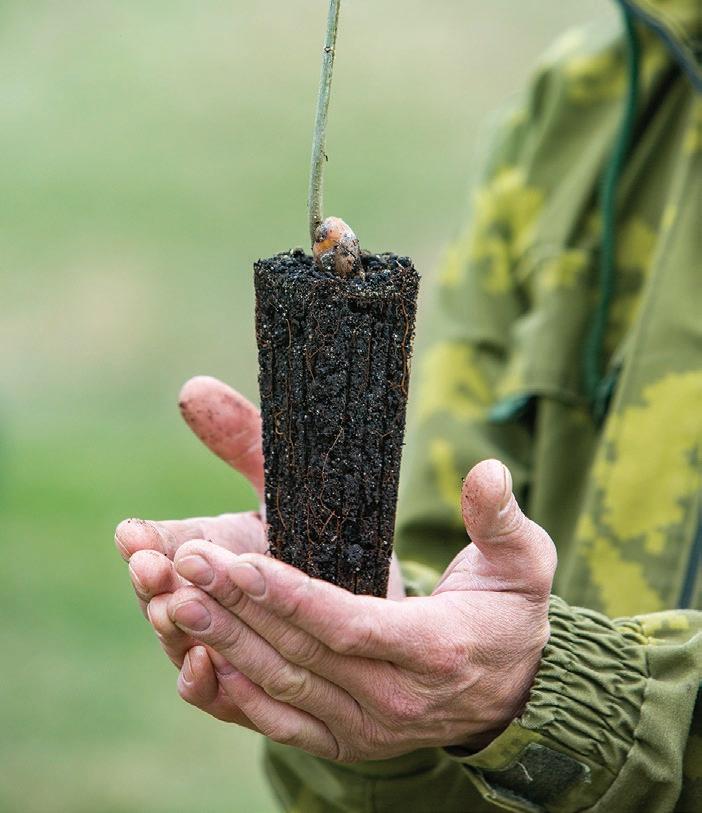
Trees4Travel is an award-winning environmental ‘Tech For Good’ company providing carbon management technology to calculate and reduce emissions, through direct integrations into booking systems, API connectivity or simple file uploads. It calculates the impact of journeys, translates trips into trees, grows trees to restore forests, biodiversity and support indigenous communities, then reduces emissions today by connecting every tree to a UN CER renewable energy carbon credit. This year it launched Trees4Events, allowing any meeting to be a climate positive event from conception to compensation, ensuring events are not simply compensated but better planned from the outset to support the planet.
BLACK BOX VERDICT This business is constantly evolving and we can't wait to see what's coming next from founders Nico and Elkie Nicholas.
39 THE BUSINESSTRAVELMAG COM
Movers & Shakers were selected with the help of Paula Cullen, Associate for Growth & Sustainability, Black Box Partnerships
This business is striving to enlighten the industry with knowledge and practical solutions”
MOVERS & SHAKERS Sustainability
THRUST CARBON
Ones to watch' in the sustainability space
CHOOOSE
CHOOOSE is a climate tech platform that provides tools for integrating climate action into any customer experience through automated emissions calculations, dynamic sustainability scores, a vetted marketplace of carbon removals and offsets and climate programme reporting. Following a successful series B funding, it is expanding its portfolio of climate solutions from Sustainable Aviation Fuel (SAF), carbon removals and verified offsets. It is hoping to create greater awareness of the environmental benefits of SAF and demonstrate demand for the fuel to scale its adoption across the global aviation industry.
BLACK BOX VERDICT On a worthy mission to close the gap between climate intention and climate action and also promote the demand for SAF.
Thrust Carbon tools are designed to be effortless to deploy across your organisation, their mantra… Effortlessly Green. The products are simple to implement and the API solutions are built for ease of integration. Thrust Calculator uses hundreds of different data points to provide robust and defensible reporting. Thrust Engage is a suite of behavioural change tools that create and measure carbon budgets. Thrust Offset provides
CTM CLIMATE+
CTM Climate+ sustainable travel programme consists of an ecosystem of services and technology solutions to help clients improve the sustainability of their travel programme by making more informed travel decisions. CTM’s proprietary online booking tool, Lightning, empowers the user to make more sustainable travel decisions by displaying carbon emissions for air, hotel, and car. It can filter and preference car results for EV and hybrid vehicles and sort flights and hotels by lowest emissions. The programme enables carbon offsetting at the final step of booking or end of the month, via CTM Climate+ or a client's own offsetting solution.
BLACK BOX VERDICT The investment made by this business to bring all important emissions data to the point of sale is admirable.
an independent platform to connect to any carbon offset scheme and the recently-launched Thrust Events is a solution for the M&E space. The team are now regularly featured for their travel sustainability expertise by the BBC, New York Times, CNN and more.
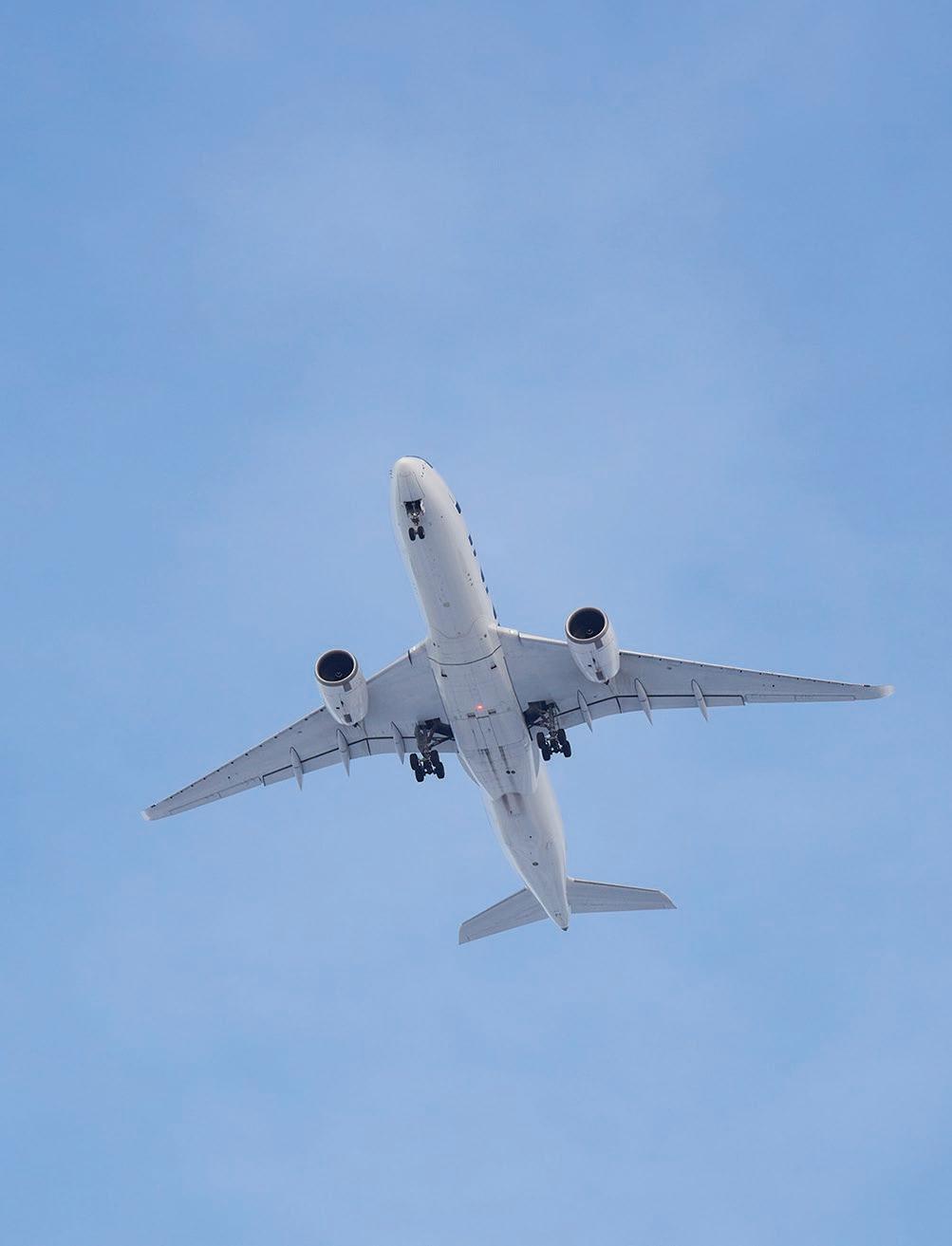
BLACK BOX VERDICT We admire the effortless approach, truly delivered in the ease of integration and the simplicity of the ever-expanding product suite.


GREENGAGE
Aimed at the hotel, aparthotel and event venue sectors, Greengage's ECOsmart accreditation provides a quality stamp of approval, giving suppliers a competitive edge while helping companies make sustainable decisions when booking. A new addition, EVENTsmart, provides a carbon calculator for responsible meetings and events of all sizes, looking at travel, accommodation, the meeting space, catering, electricity, gas, water, event materials and waste.
BLACK BOX VERDICT The new event product meets a growing demand from organisers, hotels and meeting venues for a new approach to responsible event planning. A great addition.
On a worthy mission to close the gap between climate intention and climate action”
40 THE BUSINESSTRAVELMAG COM
DATA DRIVEN








To calculate emissions, hotels collect data on energy consumption and use conversion factors to calculate the associated emissions. Conversion factors are typically provided by organisations such as DEFRA, which develops comprehensive methodolgies adopted by companies and organisations globally to measure and report greenhouse gas emissions, including Scope 3 emissions, which are indirect emissions from sources such as business travel.
Why is the accuracy of carbon data so important for the future?

Sustainability data is critical for tracking progress and measuring results. It enables businesses to better understand their environmental impact, identify areas for improvement and set meaningful targets.

Some corporate travel solutions pull this sort of information directly into their customer-facing reporting and online booking tools, such as CTM’s Data Hub and online booking tool, Lightning, to enable businesses to easily and effectively make strategic, proactive and reactive decisions that have a real and positive impact.
How are airline carbon emissions calculated?
Data intelligence organisations gather and analyse complex datasets from across the air transport industry and translate that information into usable CO² emissions data.
At CTM, we partner with RDC Aviation for airline sustainability insights. RDC bases its CO² calculations on a wide range of factors, including aircraft type, engine type, the age of the aircraft, the investment the airline is making in sustainable aviation fuels (SAF), seat configurations (business, premium, and economy) and origin-destination pair.
This data then allows for comparisons of carbon emissions between airlines or even the same airline on the same day. Dependent on these factors there might be a variance between 10-30% on emissions based on two economy seats on the same day, same airline, and same route, at different times of the day.
How are hotel carbon emissions calculated?




A widely-used method to track and calculate hotel carbon emissions is the Hotel Carbon Measurement Initiative (HCMI), developed by the hospitality industry, which provides a standard approach for calculating and reporting the carbon footprint of hotel stays consistently.
HCMI offers a simplified method for hotels to aggregate and communicate their use of energy and water. It considers factors such as the renewable energy used by the hotel, including electricity, heating and cooling, hot water, steam, laundry and kitchen services.
The accuracy of carbon data reporting also allows businesses to comply with regulatory requirements and meet the growing expectations of customers, investors and other stakeholders increasingly concerned about environmental sustainability. It can also help businesses build their reputation, attract new customers, and retain existing ones, particularly in industries where sustainability is a key competitive differentiator.
By understanding an organisation's carbon footprint, travel programme managers can work with key stakeholders in the business to develop effective strategies for reducing emissions, such as optimising their travel policy, implementing carbon-offsetting programmes and empowering travellers and travel bookers to make more sustainable choices when booking business travel.

41 THE BUSINESSTRAVELMAG COM
CTM
Accuracy of carbon data reporting also allows businesses to comply with regulatory requirements and meet the growing expectations of customers”
Insight / Sustainability
Tracking emissions and implementing carbonemission budgets can be a complex task. CTM’s John Nicholls shares his expertise
John Nicholls is Global Head of ESG & Sustainability at CTM. CTM will be showcasing its sustainability solutions, including market-leading functionality in the Lightning OBT, at Business Travel Show Europe, June 28-29, on stand J20.
JOHN NICHOLLS
building the FO und A ti O n S
Felicity Cousins explores how buyers can benchmark the sustainability credentials of accommodation
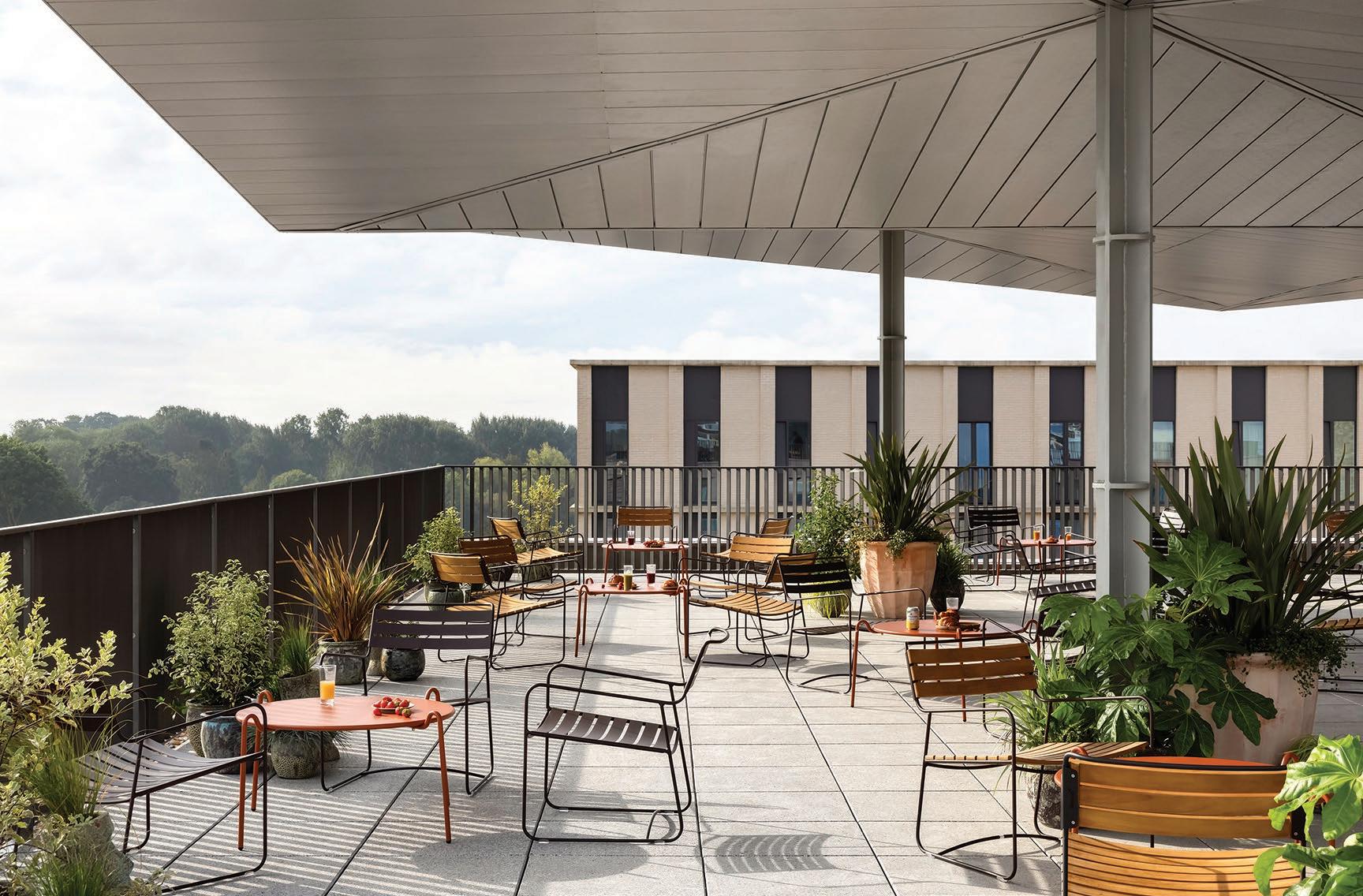
ITM has seen questions: are you using your own renewable energy (excluding solar panels on the roof); what is the share of electricity in your total energy consumption; are you proposing organic food; have you eliminated single-use plastics; do you have a strategy towards water treatment and reduction in water usage; do you have a strategy around the use of sustainable materials; do you have a carbon offsetting programme?
Ben Park, Executive Director Travel and Sustainability, Parexal International, says: “I think buyers need to ask questions that will set the foundation and benchmark to compare hotels. The marketing documents from hotels and chains often have sustainability ratings and public commitment statements, which make it easier to compare different offerings.”
Another buyer, who didn’t want to be named, added: “At this stage, we are looking to understand what policies and procedures the major hotel chains have in place. It will become a factor in the future as our company develops its ESG strategy and requires reporting from all activities.”
Zeina Ismail, Head of Global Corporate Sales & Relationships, Q Apartments, part of QIG Group, says the group is responding to these questions by obtaining more information on emissions and increasing its environmental awareness. QIG introduced net zero interiors at its recent opening, Bow Lane, London. Ismail says: “It's no longer just about prices and locations in our RFP agendas but also our sustainability factors and strategy. Our clients prioritise properties with low emissions.”
Task in hand
Corporate travel buyers looking for examples of best practice in sustainable accommodation should head to Cambridge. The University of Cambridge has developed the area of Eddington, a blueprint for green living, with student digs, private homes, shops, research facilities and two of the most sustainable properties in the south of the UK – the Hyatt Centric and the next door aparthotel, Turing Locke, by edyn. Sharing a courtyard space and all communal areas, their roofs are 80% solar panels, with leftover energy fed back to the grid. There's LED lighting throughout, biodiverse landscaping and responsibly sourced furniture, lighting, and timber, 200 cycle parking spaces and 20 EV charging spots, food waste programmes
and the first stormwater recycling scheme in the UK (one of the largest in the world).
On the roadmap
The days of washing towels less frequently to tick the eco box are over. This year large companies have to publish Scope 3 emissions, and with the hotel industry contributing to approximately 1% of global carbon emissions, accommodation suppliers are responding to more detailed questions at the RFP stage.

“Business travel is part of an organisation’s roadmap to net zero carbon emissions, so buyers need specific and auditable information,” says Kerry Douglas, Head of Programme ITM.
“Our buyer members want and need transparent and comparable data to understand, manage and report on their travel impact.”
The demand is there. In a recent ITM survey, 82% of buyers said business travel is now part of their organisation’s net zero roadmap.
ITM's Douglas says: “This has heightened buyers' concerns about how best to shape a sustainable programme, but it’s a vast topic, and many buyers don’t know where to start.”
ITM has established a taskforce to support buyers, including a guide with practical tips. Other organisations are also on hand. The
Sustainability / Accommodation 42 THE BUSINESSTRAVELMAG com
SUSTAINABLE STA y S
Sustainable Hospitality Alliance has members from 22 leading hotel companies, including Choice Hotels, Accor, Hilton, IHG, Radisson Hotel Group, Hyatt and Marriott International. The body, which has launched the Pathway to Net Positive Hospitality, aims to help buyers determine the sustainability of hotel suppliers.
The alliance and many of its members are on the advisory board for the Cornell Hotel Sustainability Benchmarking Index (CHSB), an industry-led global collection and benchmarking initiative, with data on energy, water and carbon emissions from more than 20,000 hotels.
Claire Whitely, Head of Environment, The Sustainable Hospitality Alliance, says: “We created a Hotel Carbon Measurement Initiative and Hotel Water Measurement Initiative and have made tools, which are freely accessible for the whole industry. These provide comparable and transparent data, which can be used by corporate teams to understand the relative performance of hotels, as well as use in their own reporting for their Scope 3.”
Beyond carbon
As a member of the GBTA’s sustainability committee, Radisson Hotel Group helped to develop a sustainability toolkit, which offers 12 modules for travel managers to create a sustainable pathway, and is involved in the Sustainability Matrix (launching this year) to support business travel bookers with RFPs.
Inge Huijbrechts, Radisson's Global SVP Sustainability, Security and Corporate
Communications, says: “Leading corporate travel buyers want to understand how their travellers contribute to a net positive impact on people and planet. This goes beyond carbon footprint reporting and includes biodiversity, waste management, green mobility, sustainable procurement as well as health and wellbeing and equity, diversity and inclusion.”
Sustainability is, after all, not just about carbon emissions. It covers all aspects of the UN’s 17 Sustainable Development Goals –with the four main pillars of Social, Human, Economic and Environmental.
Parexal International’s Park says: “Buyers should ask their accommodation suppliers about their public commitment to the UN’s Sustainable Development Goals and also ask for SBTis, setting out their commitment and goals and how they will share those results going forward.”
Standard approach
Once they have their sustainable strategy in place, how do travel buyers navigate the vast accreditation landscape, with more than 200 options worldwide?
ISAAP recently launched its SP Sustain Accreditation for serviced apartments. It conducted a survey with The Apartment Network, which kickstarted the conversation with its members about how they measure sustainability and what their future plans are.
ISAAP’s Stephen Martin says that using this as a benchmark, ISAAP can gauge how sustainability is moving forward for those companies, with a large proportion of the

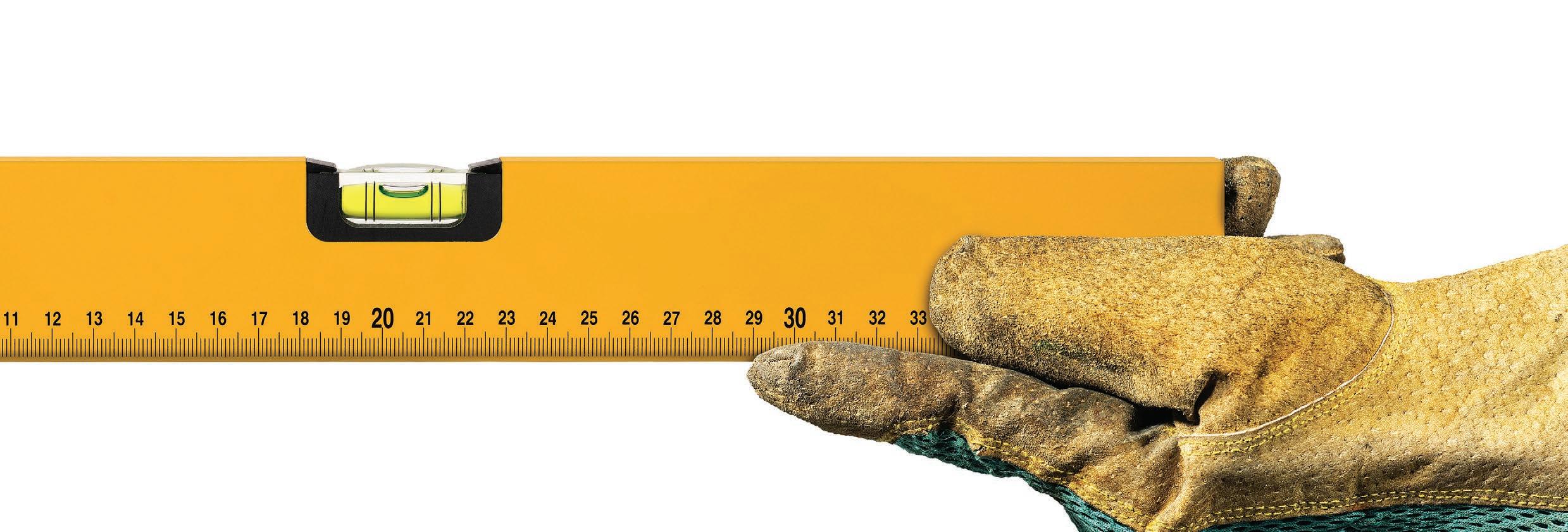
serviced accommodation providers who took part in the survey planning to implement a company policy by the end of the year. “This suggests a definite gathering of momentum in awareness and applied activities pertaining to environmental care,” he adds.
Progress is being made, but one buyer notes: “Currently we don't differentiate between the various accreditation providers but there needs to be a standardised global approach that all suppliers and corporates align to.”
Basic framework
Every hotel is encouraged to start on the pathway, even if it's right at the beginning, with Hotel Sustainability Basics, a globallyrecognised set of sustainability indicators all hotels should implement as a minimum. To advance beyond this, hotels obtain an eco-label, recognised by the UN-led Global Sustainable Tourism Council (GSTC), and adhere to the GSTC Industry Criteria.
Radisson’s Huijbrechts says: “The importance of this framework cannot be underestimated: it offers trusted, verified levels of sustainability, with freely available tools for any hotel type anywhere in the world.”
The GSTC Criteria provides a quality check across the sector.
The Alliance’s Whitely explains: “The GSTC essentially acts as the certifiers of certifiers by providing a quality check on the criteria which hotels have to meet to be certified.”
Uncertain future
But there are challenges ahead. In April CBRE, the global commercial real estate services and investment company, released a report which found “the slower economic growth in the UK, EU and Asia Pacific, along with an anticipated recession in the US, is likely to slow down short-term progress.” Other potential challenges include inflation, high-interest rates and heightened geopolitical uncertainty.
These are tricky times but there is positive momentum and the sector is aligning with a recognition we’re all in this together, for a better, more sustainable future
Accommodation / Sustainability
43 THE BUSINESSTRAVELMAG com
Business travel is part of an organisation's roadmap to net zero carbon emissions, so buyers need specific and auditable information”












Over 800 UK hotels powered by renewable electricity* Only available at premierinn.com that doesn’t cost the earth *Visit our website for more information.
Six of the best... sustainable serviced apartments in the UK
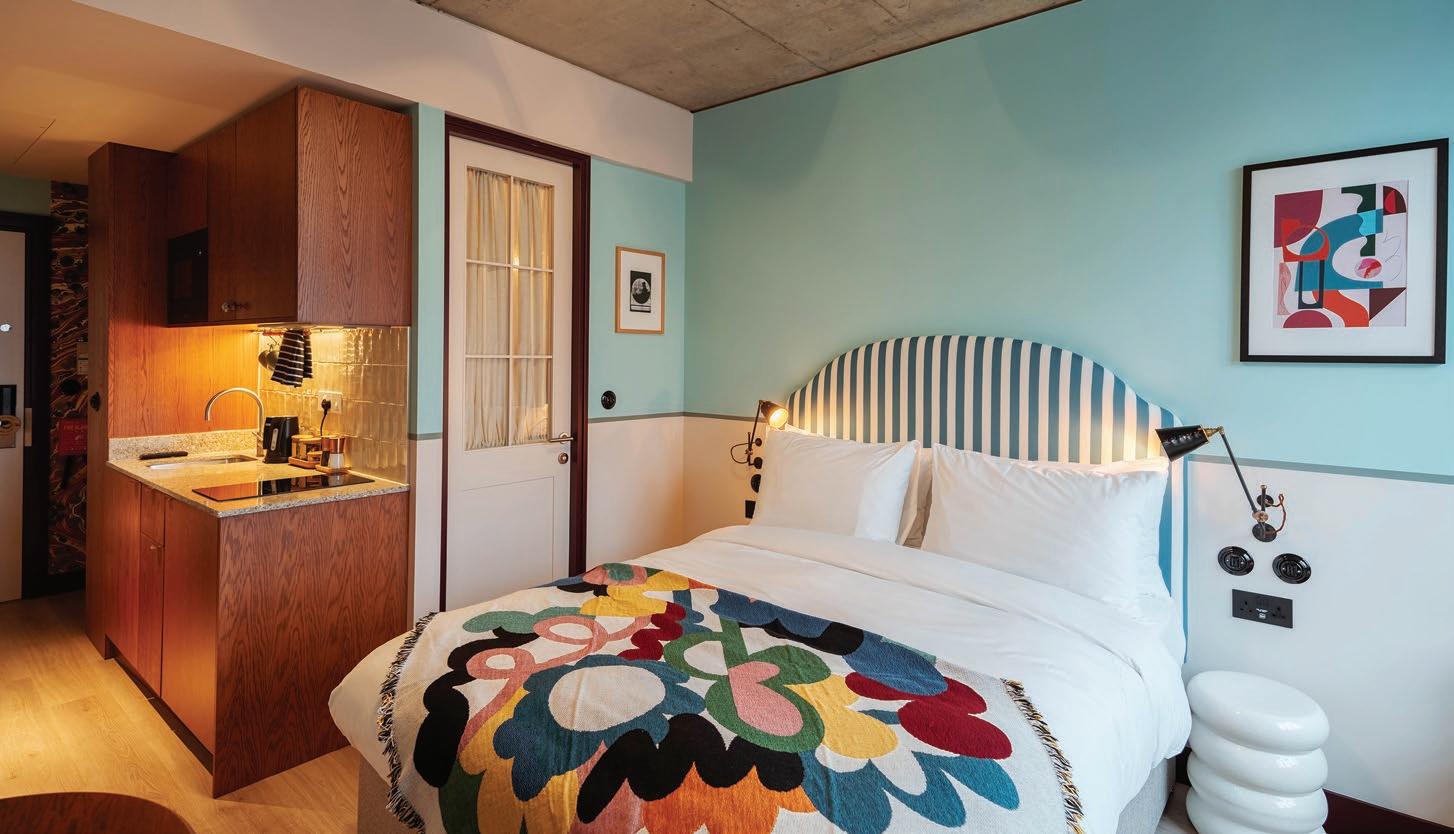

room2 ChiswiCk
Laying down a marker for green stays, room2 Chiswick claims to be the world’s first whole life net zero hotel. All emissions from its construction, running and even its eventual demolition will equal zero. Latest green technologies ensure the building uses 89% less energy than a typical hotel.
2
stow-AwAy, wAterloo
Stays don’t get more eco than at Stow-Away, a mind-boggling apartment complex built from 26 repurposed shipping containers. It's at the forefront of waste recycling and reduction, and it plants a tree for every guest stay.
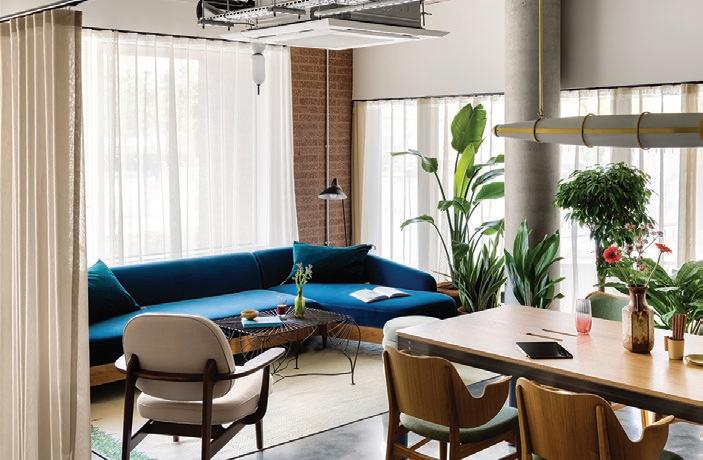
3
Flying Butler, hAmmersmith
Mattresses made from recycled marine plastics and air-source heating are among the ecofriendly features of these new mews and duplex apartments. All units also come with the latest low-energy appliances.
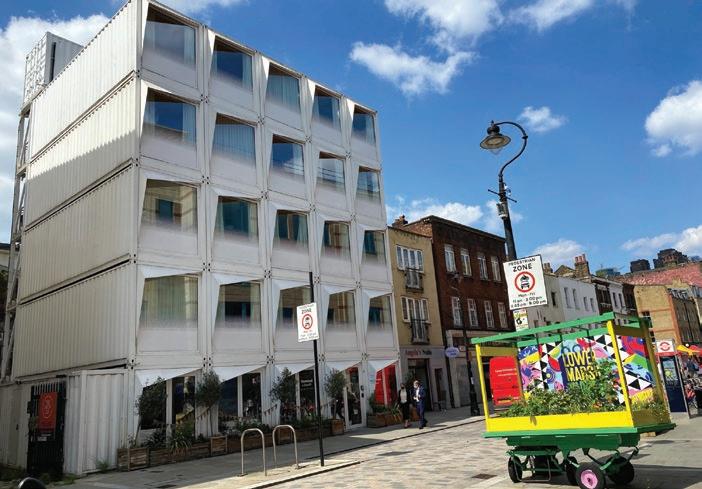

turing loCke, CAmBridge
This design-led property, in Eddington – an area built for sustainable living – features on-site renewable energy sources, biodiverse landscaping and responsibly-sourced furniture, lighting and timber, as well as 200 bicycle parking spaces and 20 EV charging spots.
FrAser suites, edinBurgh
Frasers Hospitality bans singleuse plastic, its pillows and duvets are made from recycled materials, and it uses renewable energy in all 11 UK properties. Its pretty Victorian-era aparthotel in Edinburgh's Old Town partners with a local homelessness charity to give back to the community.
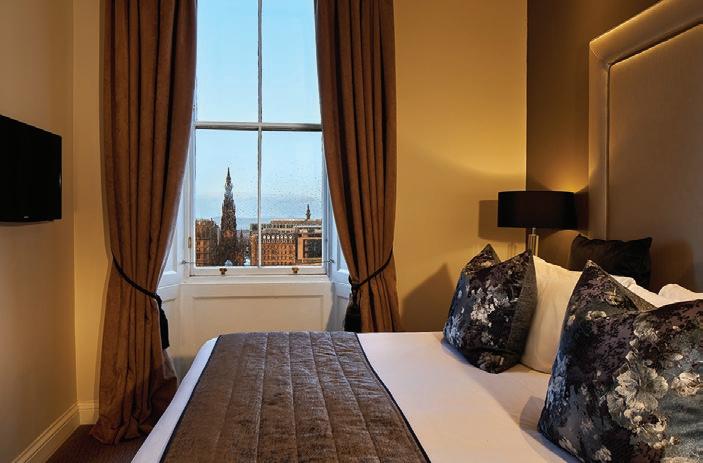
stAying Cool, BirminghAm
1 4 6 5
Situated on the upper floors of Brum’s chic Rotunda building, Staying Cool is a Green Tourism Gold Award winner that’s big on style. These sleek, boutique-style apartments include aromatherapy toiletries products free of chemical nasties while the building is powered entirely by renewables.
45 THE BUSINESSTRAVELMAG com
buying power
Steps are being taken to help buyers choose the most sustainable serviced accommodation and drive change
Amatrix to help buyers compare the sustainability credentials of serviced accommodation was one of the initiatives shared with corporate travel buyers at a Business Travel Lunch Forum, organised by The Business Travel Magazine, the first dedicated to the serviced accommodation sector.
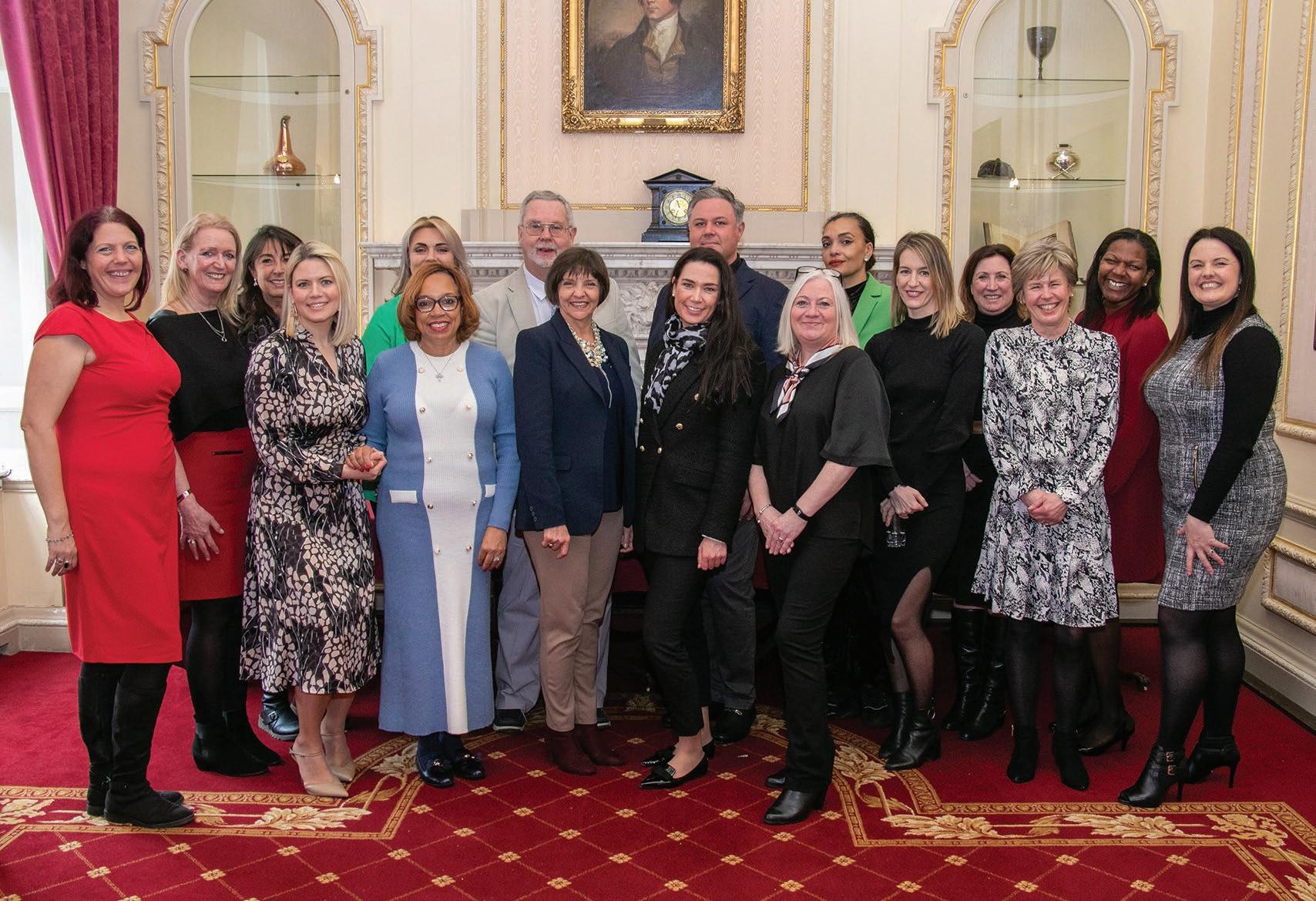
Buyers were told that a coalition of six associations, including the ASAP, has enlisted consultants Deloitte to help the sector create a common language around sustainability and, crucially, a method to measure the footprint of individual extended-stay properties.

The coalition is also devising a matrix that can be used by corporates in RFPs so they
can judge the progress of a potential partner in their sustainability journey.
“Significant in-roads are being made,” said Kim Ashmore, Global Partnerships Manager at ASAP.
In the meantime, buyers say clear and simple messaging about the lower footprint of using serviced accommodation would help them encourage their travellers to consider switching from hotels. One buyer suggested using infograms to show comparisons, similar to those used to highlight the lower footprint of rail travel compared to driving or flying. These could perhaps focus on the lack of daily cleaning and F&B facilities, which generally give hotel stays a higher carbon footprint.
Guests at the lunch discussed several factors which make it difficult for the sector to provide meaningful, standardised emissions data. Firstly, it is a fragmented market and is made more complex because apartments can be owned, managed or part of a brand, making it difficult to collect and verify information. Apartments can also be in larger buildings alongside privatelyowned apartments or properties managed by other operators.
The vast number of sustainability accreditation companies offering their services to the industry, all based on different criteria and following different procedures, has further muddied the
46 THE BUSINESSTRAVELMAG com
S ERVI c E d A cco MM od ATI o N
business travel F oru M
Travel buyers can help to encourage investment and innovation by refusing to include content that doesn't meet sustainability standards in their travel programmes”
waters. The high cost of applying for and achieving accreditation was also identified as a barrier.
Echoing the findings of the Global Serviced Apartment Industry Report 2022, some buyers said they were not convinced by the validity of ‘green’ accreditation.


“It means nothing to me, or the booker, or the traveller. We need a number,” said one.
Good behaviour
Buyers said while having accurate, standardised per night emissions data is the ultimate goal – and vital for emissions reporting purposes as legislation comes into force – measurements based on averages were enough to drive better behaviour among their travellers.
They agreed that the assumption that booking with ‘greener’ accommodation will always be more expensive is not always the case, particularly for corporates paying to offset carbon emissions.
In such a fragmented market, it’s vital for players to pull together, said buyers, who agreed that serviced accommodation is a small enough sector to lead the way within the wider accommodation space.



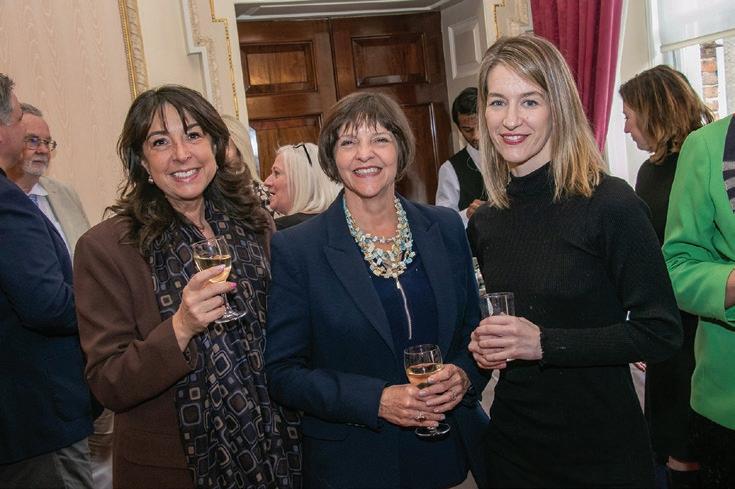
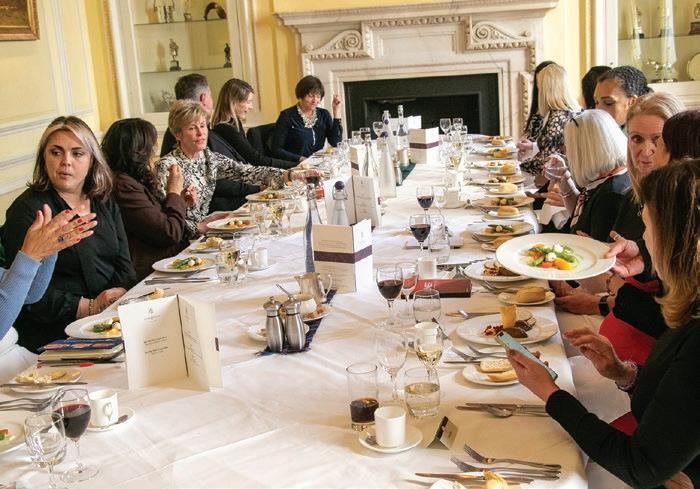
Serviced accommodation operators reported seeing a rise in sustainability questions asked in RFPs, alongside a growing demand for their more environmentally-friendly properties. They said travel buyers can help to encourage investment and innovation by refusing to include content that doesn’t meet sustaianability standards in their travel programmes.
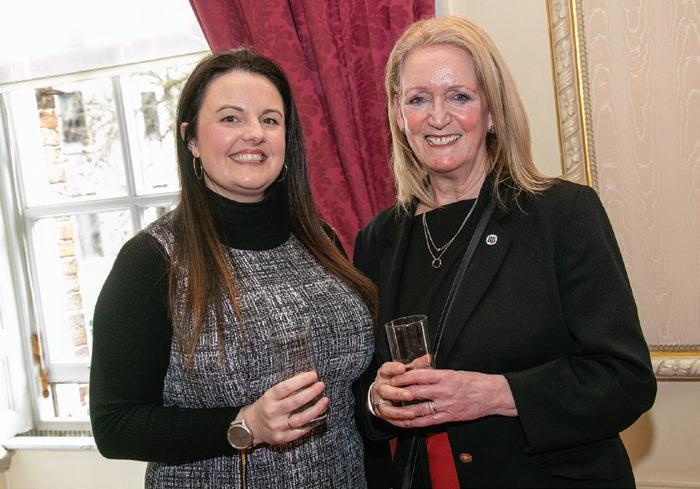
“This will encourage people to make the investment in sustainability. You guys have the power,” buyers were told.
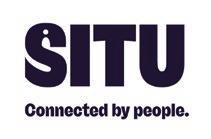
Distribution
When it comes to sourcing and booking serviced accommodation, buyers said they need content that’s bookable online but agreed there were still occasions where offline support is required.
While some inventory needs to be live and accessible in one click, a four-month stay for a relocation will usually require bookers to come off line, put in a request and have an actual conversation. The level of support also varies depending on the market.
Buyers said travellers now expect to have a booking experience that’s similar to what they enjoy when booking their leisure stays, including the ability to manage changes and cancellations.
When it comes to the corporate world, why can’t I do what I can do on booking.com?” asked one.
Buyers were advised to put pressure on their TMCs and OBTs who have the capability to incorporate serviced accommodation and include the option in an organisation’s travel policy. For example, longer-stay alternatives could be displayed for bookings over a certain number of nights.

47 THE BUSINESSTRAVELMAG com business travel ForuM
Travellers now expect to have a booking experience that's similar to what they enjoy when booking their leisure stays, including the ability to manage changes and cancellations”
EVENT IMAGES: PHIL
With thanks to our event sponsors
GAMMON
open
Minds
Six individuals explore an aspect of diversity, equity and inclusion that’s close to their heart
48
Diversity, e quity & i nclusion
THE BUSINESSTRAVELMAG com
PAULINE HOUSTON VP BUSINESS DEVELOPMENT, SILVERDOOR
I feel very passionately about age inequality and that’s not because I’m a more ‘mature’ woman! Recently I did some research for a GBTA White Paper on this subject and my big ‘aha’ moment was realising that not one particular age group suffers more inequality than another. People of all ages can suffer discrimination, not just the over 50s.
Young people are often wrongly dismissed as having a lack of experience, older people for being ‘past their best’ and those in between, particularly if they have children, might be dismissed for having too many responsibilities at home. Women of childbearing age might be overlooked too. But, in fact, all of these age groups can bring so many benefits to an organisation.
Age discrimination can be industry specific. For example, a consultancy business might not want to put a younger member of the team in front of a multi-million pound client, even if they’re completely capable, while a technology company might be more than happy hiring younger people and might dismiss an older person.


At SilverDoor our team has a very diverse age range, from post-graduate students on placements to people in their early 70s, and we learn from each other. I know where my weaknesses are and I look to the younger people in the team to teach me more about the new ways of working, social media and technology. Nobody, no matter how senior they are, should be afraid to admit they don’t know everything and can always learn from others. A CEO can learn from an intern. Reverse mentorship is so valuable.
ARON JAMESON DIGITAL PROJECTS EXECUTIVE, ATPI
Diversity, Equity, and Inclusivity are key values organisations have worked towards in order to support individuals of different ethnicities, religion, sexual orientation, gender and more. Never before has the
new generation entering the workforce had such a platform in order to hold inclusivity and diversity, not just as a preference, but as a requirement of any organisation.
These past few years during Covid, the travel industry has undergone quite a shift in work culture, with the majority of employees working from home, which in return has given them more of a focus on their home-work-life balance. Alongside this, Gen Z and Millennials have seen a generational shift, where these core beliefs and values for DE&I are crucial for entering the workplace
As an LGBTQIA+ member myself, when I first came into the industry over 15 years ago, it was not a consideration of mine to question if a company had a DE&I charter, or if they partook in any charities or sustainability ventures. I was only focused on the role itself and entering employment.


I am thrilled to see how the next generation is challenging employers and asking these hard questions in interviews, to ensure that their values, identities and beliefs are being supported.
I believe the travel industry has seen a tremendous change towards DE&I over the past decade, with companies introducing new charters for diversity and equity, restructuring their interview process to cater to more diverse groups, and partaking in numerous ventures of sustainability and inclusivity, such as pride parades, international women’s day, coffee mornings for mental health and much more.
DE&I will continue to be an ongoing objective within the industry. However, companies should consider what they are currently implementing to cater for DE&I, knowing that the next generation of employees entering the business travel sector hold ‘work culture’ and an ‘inclusive vibe’ as crucial values.
We as an industry need to continue to challenge ourselves internally, with our charters, interview processes and our tools to cater for all groups of individuals.
ALICE LINLEY-MUNRO, TRAVEL MANAGER, OIL SPILL RESPONSE


I heard someone say that a correct diagnosis was like realising you could ride the horse rather than carry it, and after a handful of diagnoses over a span of 24 years I finally put the horse down last year when I was diagnosed with combined type ADHD. I thought the diagnosis was the key, but after a lot of investigating I realise the key has been learning what my ADHD looks like and adopting strategies to help.
If you ask me how long a task will take, I’ll tell you what I think but really have no concept of it thanks to ‘time blindness’. This can lead to over promising and constantly playing catch up. I also know that for me, ‘being in the zone’ is actually hyper focus, which at first glance sounds brilliant, but means I can work for eight straight hours without getting up, eating or drinking. I’ve now blocked out lunch as a calendar appointment and also have a morning reminder to do quick household tasks like sticking a wash on to get me away from my desk.
Some simple changes I’ve implemented are requesting emails rather than verbal instructions, as unless I can immediately switch to the new task, I struggle to remember and process them. I also ask people to be more specific in meeting requests as something labelled ‘catch-up’ can send me into a spiral of anxiety and leave me unable to focus, and where possible I try and avoid afternoon meetings to negate the dreaded ADHD ‘waiting mode’. If I have an appointment in the afternoon I can struggle to focus in the morning thanks to a mixture of attention issues, anxiety and time blindness.
Work letting me show up as myself is important to my wellbeing and my department understands that I have a tendency to want to interrupt, that I
49 THE BUSINESSTRAVELMAG com Diversity, equity & inclusion
Recent allegations of the rape of a woman at a CBI boat party is a stark reminder that employers still have a duty of care to protect their employees when attending events”
sometimes need to walk away and take deep breaths, or that I play with fidget toys and sit strangely on my chair. They understand that I always watch training videos with subtitles, and sometimes wear earplugs to deaden the background noise enough to help me focus. By being able to do what I need to help my brain, it means that there is a work life balance, because I’m no longer carrying the horse through my working day and collapsing in an exhausted puddle at 5pm.
CAROLYN PEARSON CEO, MAIDEN VOYAGE
Business and work related social events are the glue that holds an industry together, allowing people to connect and build meaningful work relationships. However, the recent allegations of the rape of a woman at a CBI boat party is a stark reminder that employers still have a duty of care to protect their employees when attending events. Events are an extension of the workplace whether it’s an industry conference, an incentive trip or even the company Christmas party.
There is a general level of maturity when it comes to preparing employees for business travel but event safety is often overlooked.
In my work, I have been shocked to hear stories of those who have been impacted by the behaviour of others. One woman, so overwhelmed by the attention of her manager while at a conference, fell sick and was confined to her hotel room before flying back early to get away from him.
Whilst inevitably sexual, racial and other harassment at work policies exist, there is sometimes a belief that ‘what happens on a trip stays on a trip’ and that the rules don’t apply when away from head office.
Risk mitigation is relatively simple. Clear policies and codes of conduct can be communicated in the same way as other HR
policies. Having a clear route to reporting incidents and short, effective training courses or eLearning can be used to arm delegates with a few simple techniques such as teaming up with an event buddy or being an active bystander to support others. Some organisations have dedicated security professionals on duty to keep an eye on proceedings and are moving away from the ‘alcohol-fuelled’ culture.
INGRID SANDERSON OWNER, PRINCIPAL BUSINESS TRAVEL


Travelling for work can be tricky when you’ve got loved ones back home. Leaving your significant other to look after the kids or the dog can put a strain on relationships. Resentment can build, no matter how much you insist that it’s part of your job. In the post-pandemic world, employees are expecting increased flexibility and are far more aware of the power that they now wield in a talent market that is often starved of exceptional candidates. As a result, we’re seeing a fast emerging trend where employees are requesting ‘bleisure’ trips, often with a partner or family member in tow. It also makes sense, during these times of increased cost of living, that many people would be motivated by the opportunity to take their paid holiday around work travel. If employees feel their employer is taking an active interest in their wellbeing whilst they are away on business and meeting duty of care, productivity can be enhanced. The question is, how do responsible employers ensure that ALL employees have access to this perk? It should not be handed out casually and without due process or consideration. It needs to be properly conceived, executed and recorded. Very few companies offer this service as part of their HR package, yet this small and relatively low-cost strategy can make such a positive difference. All of this can help reduce the
impacts sustained by frequent business trips to travellers’ personal lives, the quality of relationships, physical and mental health and to mitigate decreased productivity leading to diminished job satisfaction and ultimately the dreaded S word – stress!
MATTHEW YATES GENERAL COUNSEL AT WHITBREAD, PREMIER INN'S PARENT COMPANY
Disability inclusion is a topic that is incredibly important to me and I’m grateful to work for a business that shares its importance. Alongside my ‘day job’ I'm proud to be the Chair for Whitbread's enAble disability network and the main purpose of enAble is to ensure our teams and our guests, with both hidden and visible disabilities, are represented.
Staying in a hotel, in comparison with going into a shop, is so much more intimate and personal, and we continue to work hard to consider accessibility and the needs of disabled guests, who we know stay in a mix of standard and accessible rooms for all sorts of reasons, from attending a work conference to going to a concert.

Needs and preferences are vast, and what one guest would like conflicts with another's needs, but we work hard to be as accessible as possible, both through the built environment and our amazing teams, who can make reasonable local adaptations to suit the guest.
Nothing makes us prouder than receiving positive feedback. Recently we had a letter from a national accessibility charity who held a Board meeting in one of our London hotels. They were full of praise for our team who proactively put water out for their dogs and took great care to safely return a charm from one of the dog’s leads that otherwise could have been hoovered up.
Humility is important. Whilst we try hard to always delight every guest, we don’t always get it right, but on the rare occasions where we don’t, we listen and learn and make our processes and products better for the future, working with the disabled community, both internally and directly with our guests, and with a number of disability forums.
50 THE BUSINESSTRAVELMAG com Diversity, equity & inclusion
Not one particular age group su ers more inequality than another. People of all ages can su er age discrimination, not just the over 50s”
Be yourself
destinations such as the Caribbean where there are still barriers to LGBTQ+ equality.
How do you demonstrate your strong focus on DE&I to your corporate customers?
In March we launched Virgin Atlantic for Business – the new face of corporate travel that embraces the dynamism of business today. We’re bringing a fresh focus to the way we recognise and empower decisionmakers who manage the modern business traveller’s needs. Built for those who want to be part of, and help pilot, the new positive commercial landscape, it’s about creating a brilliantly different travel experience for the individual and a more sustainable, inclusive and diverse industry for all of us and making sure our partners have the right content and tools to book Virgin Atlantic. Our recent advertising campaign, ‘See the World Differently’, set to the song ‘I am what I am’ epitomises everything about Virgin Atlantic. It’s centred around a sense of belonging, inclusion, and diversity of perspective - in everything we do.
Are you asked about your approach to DE&I in RFPs?
In a nutshell, how would you describe Virgin Atlantic’s approach to DE&I?
Our purpose is that everyone can take on the world and we live by that. For us, it’s the reason why our brand exists and the impact we seek to have on people’s lives and in the world they live in. We champion difference and individuality, and it’s by encouraging all our people to truly be themselves at work that we uphold an inclusive environment where they each can thrive.
What key initiatives have you put into place to support DE&I?
Last year, we updated our uniform policy to allow our people to choose the uniform that best represents them, rolling out pronoun badges at the same time. This work connected our people and customers as we also updated our ticketing systems and Flying Club accounts to allow non-binary passport holders to select U or X gender codes, as well as gender neutral titles.
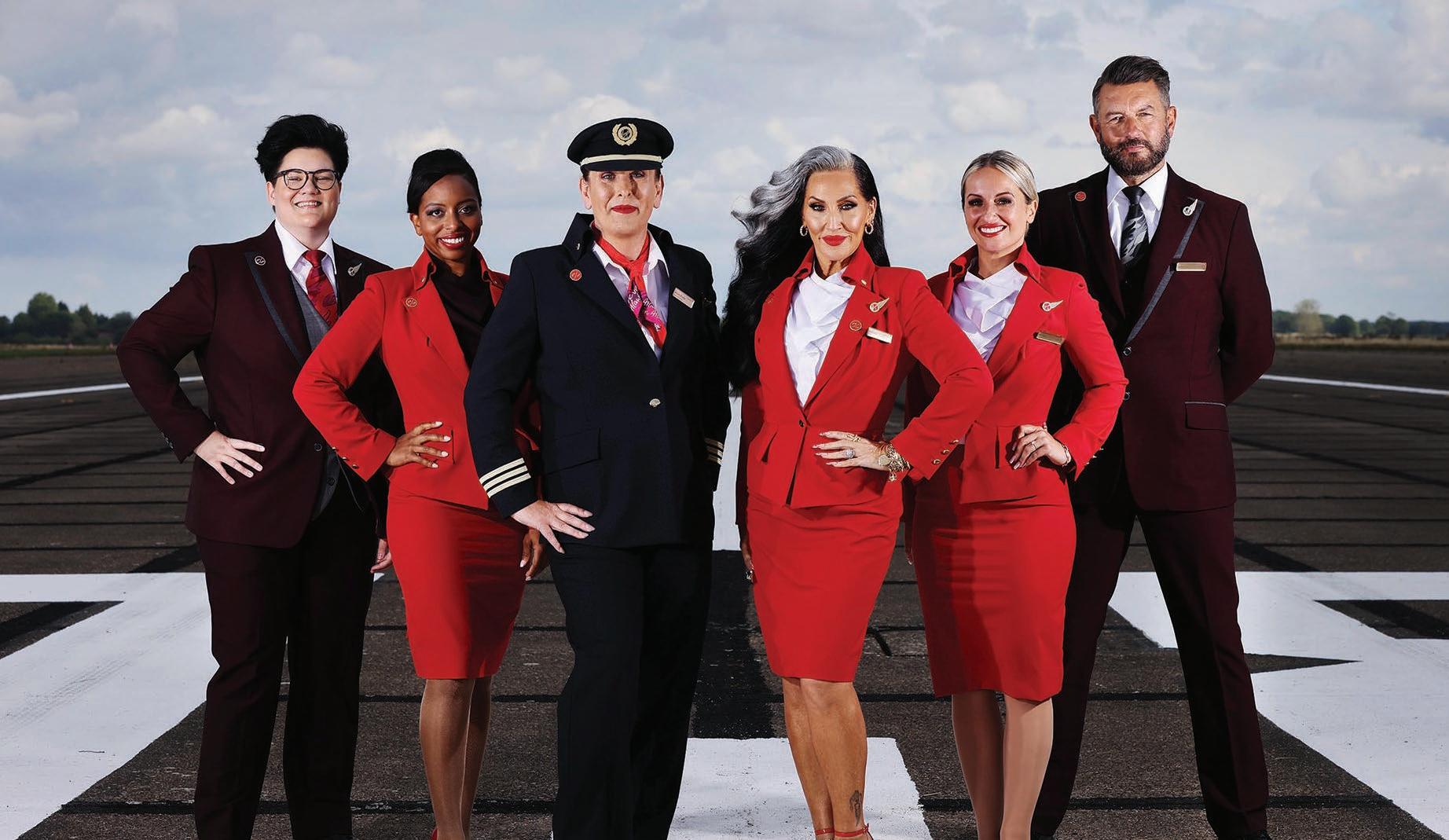
Additionally, we relaxed our tattoo policy for all people including customer-facing teams. Back in 2019, we also made the decision to remove mandatory make up for cabin crew and introduce a choice of heels or flats and skirts or trousers, which was an industry first. We have four belonging networks –DEN, Scarlett, Pride and VALUED. Each network has an exec ally, which is close to that person’s heart and so consequently, they help to also raise awareness and change mindsets. We’ve also launched inclusivity e-learning for colleagues across the airline and to partners within
DE&I is increasingly prevalent in the RFPs we are participating in. Corporate clients recognise the importance of partnering with those suppliers who are taking action on important global issues such as DE&I and sustainability.
Why is it so important for an airline to embrace DE&I?
Whilst there’s so much to celebrate, we have a lot of work to do as an industry. We know that over 40% of young people are put off a career in aviation because of a lack of diversity and visible role models. That number increases to two thirds for those from ethnically-diverse backgrounds. Representation matters and we still have too few visible senior role models. It’s vital that we continue to champion diversity to see this change. Careers take time to develop and we need to do more to raise awareness of the industry and career paths within aviation, and the fact that it’s changing. Initiatives like our Passport to Change programme, which aims to inspire young people to consider a career in STEM subjects, are so critical.
51 THE BUSINESSTRAVELMAG com
VIRGIN ATLANTIC
We're bringing a fresh focus to the way we recognise and empower decision-makers who manage the modern business traveller's needs”
IN s IGHT
DE&I is top of the agenda for Virgin Atlantic, both for its own people and its customers. We checked in with Nicki Goldsmith, Director of Agency Sales
Reality check
THE LOCATION Right on the Thames, next to the Tower of London, Cheval
Three Quays has 159 luxury serviced apartments which can be booked for any number of nights but are perfect for extended stays. It’s part of Cheval Residences, which has luxury apartments in prime locations in central London, Edinburgh and, since April, in Dubai.
THE CHECK-IN Cheval Three Quays opened in 2014 but its interiors still look new. The elegant lobby, with a water feature, glittering chandelier, plush leather armchairs and over-sized vases with fresh flowers, is manned 24 hours a day by a highly-professional team who greeted me like a VIP repeat guest. Even the corridors feel like they’re brand new, with pristine carpets and prints of London scenes on the walls.
THE APARTMENT Ranging from openplan studios right through to ninth-floor penthouses, all apartments have fullyequipped kitchens and floor-to-ceiling windows with views of Tower Bridge, The Shard and other landmarks. My
SERVICED APARTMENTS: CHEVAL THREE QUAYS, LONDON
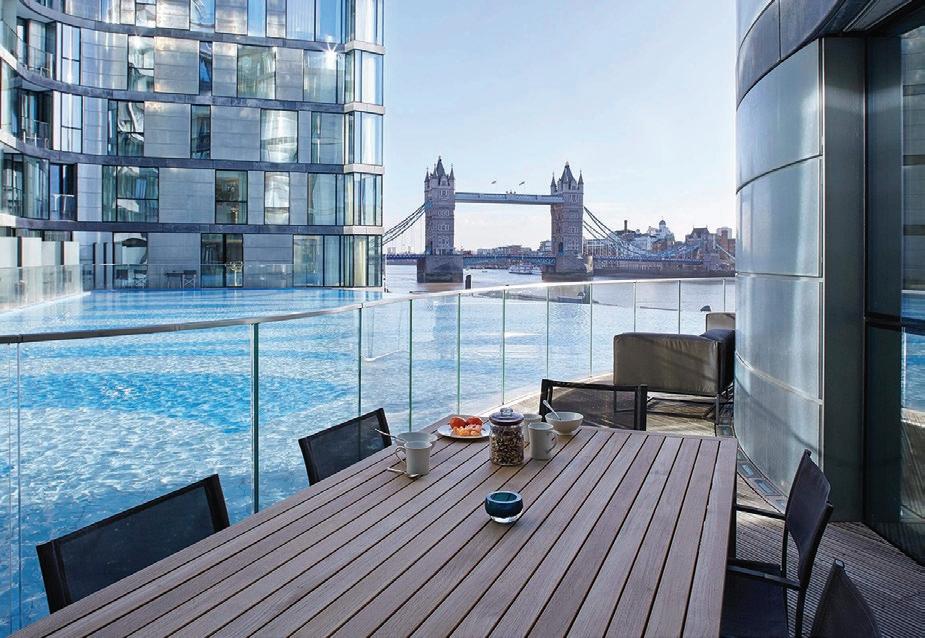
deluxe two-bedroom apartment was vast. The open-plan living area and kitchen had two large windows and a balcony with views of Tower Bridge. Armchairs and footstools were strategically placed facing the views. The hallway alone was as big as most hotel rooms and there were so many wardrobes, I was late checking out because I forgot where I put my coat! A delicious welcome basket included M&S croissants, a sourdough loaf, jam, fresh fruit, Pipers Crisps, Quaker biscuits and more. In the large fridge was a bottle of fizz, fresh milk and Luscombe orange juice. My spacious king-size bedroom had a large ensuite shower room and a floor-to-ceiling window with more stunning Thames views. The second bedroom had two large singles. A second bathroom came with a bath.
THE FACILITIES There’s a 24-hour gym on the ground floor. Cheval has also partnered with HOMEtainment, which creates bespoke experiences, such as private chefs or mixologists.
FOR BUSINESS I worked on the dining table by the window (the views were a bit distracting!). Penthouses can be hired for events. Wi-Fi was fast.
THE VERDICT These apartments are top notch and definitely have the ‘wow’ factor if you want to impress clients.
THE DETAILS Deluxe twobedroom river view apartments from £700, chevalcollection.com
Bev Fearis
FLIGHT: VIRGIN ATLANTIC, UPPER CLASS, LONDON HEATHROW - LOS ANGELES
THE FLIGHT I was scheduled to fly to the 'City of Angels' with Delta but on the morning of departure was informed (via the Delta app) that I had been switched to a flight on Virgin, an alliance partner, as my intended Delta flight (DL5977) was due to be delayed by up to six hours. My flight (VS23) took off just an hour after the original scheduled Delta departure. The route is operated by a A350-1000 aircraft and takes around 11 hours.
THE CHECK-IN My bags were quickly dispatched, I was pointed to Virgin’s dedicated fast track lane, was through security in 10 minutes and spent an hour in Virgin's own well-stocked lounge, where I dined in the sit-down 'restaurant' on parsnip soup and a plant burger.
THE SEAT 5G. I was seated on the right of two middle seats, in a 1-2-1 configuration. It was perfectly comfortable, although having a 'stranger' sat next to you takes away some of the 'privacy' most presumably look for when buying a business seat. The little glass divider between the seats, that slides
three-quarters of the away across at eyelevel height, was also not working.


I was impressed by the 18.5-inch touchscreen and close charging point.
THE SERVICE Upon boarding I was offered Champagne and orange juice and an amenity bag that included cotton socks, a bamboo toothbrush and REN lip balm, moisturiser and hand cream. There was also a can of water (not a plastic bottle) and the menu. Dinner was served early after take-off. My starter of salmon gravadlax with pickled cucumber and grain mustard mayonnaise and pumpernickel bread was superb, as was the main of Tonagashi marinated halloumi bowl with sushi rice, braised pineapple, seaweed salad, edamame beans and crispy onions. Then it was lights out for a few hours, with my seat reclined into a 6ft 7inch fully-flat bed. Before landing, a cheese, coleslaw and lettuce sandwich on crunchy brown bread, and coffee and tea, were served.
THE VERDICT Although undeniably sleek and sexy looking, with
PASSENGERS CAN ORDER ANYTHING USING THE IN-FLIGHT ENTERTAINMENT SYSTEM
the purple colour scheme and mood lighting oozing style and quality, the seat 'width' felt a touch narrow and also had limited storage area. However, I liked being able to order anything, from Champagne to afternoon tea, directly from the seat, using the in-flight entertainment system.
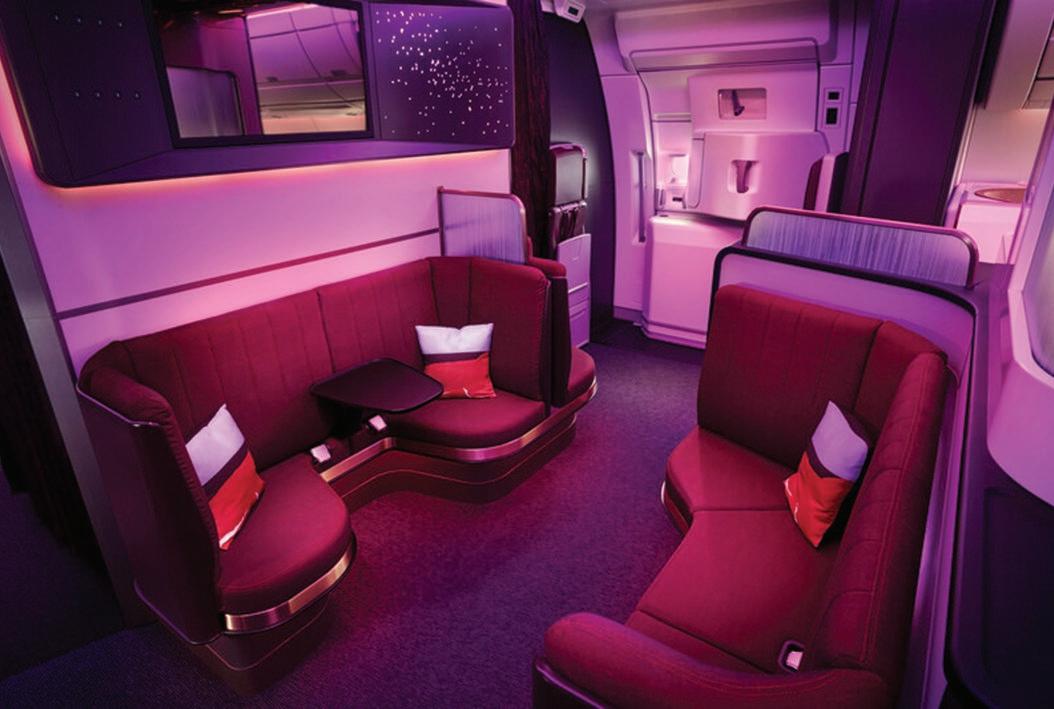
THE DETAILS Return Upper Class flights from £3,571, virginatlantic.com
Steve Hartridge
DEPARTURES
52 THE BUSINESSTRAVELMAG COM
THESE APARTMENTS ARE TOP NOTCH AND DEFINITELY HAVE THE WOW FACTOR
FLIGHT: KOREAN AIR, BUSINESS CLASS, LONDON HEATHROW - INCHEON-SEOUL
THE FLIGHT I flew Business Class on flight KE908 from London Heathrow to Incheon-Seoul.
THE CHECK-IN Check-in and security through Heathrow Terminal 4 was easy and effortless. Staff in the Business Class lounge were friendly, and the food and beverage options were plentiful.
BOARDING Boarding was quick and efficient. On entering the Business cabin I was quickly offered a choice of soft drinks along with an eco-friendly and understated amenity kit that provided the essentials: toothbrush/paste, mask, shoehorn, brush, slippers, 'Atelier Cologne' hand cream and body lotion products. The security video does a great job of focussing passengers’ attention, utilising 'K-Culture', including the global K-Pop phenomenon. We enjoyed a trouble-free on-time take off.
Settling into my comfortable seat, I familiarised myself with the uncomplicated controls, as well as the various plugs and lighting options. I was in F7, a window seat, in a 2-3-2
configuration and, once settled, it felt reasonably private. The allocated space is adequate but not excessive - it’s certainly all that’s needed in order to settle down and get a sound night’s sleep. Later on I made use of my fully-reclining seat and stretched out with my soft blanket and pillow and enjoyed an uninterrupted sleep. Korean Air’s inflight entertainment is the impressive 'Beyond' IFE system. My seat faced a bulkhead, so whereas most screens were set into the back of the seat in front, my screen was a very neat pop-up arrangement. The userfriendly system easily reveals a vast selection of options and genres from East to West. I sampled some K-Pop and a K-Movie or two, briefly, in eager preparation of the days ahead.
THE SERVICE Generally the cabin crew were immaculate, kind, and attentive as required. Dinner consisted of an ‘amuse bouche’ then delicious smoked salmon and salad and a choice of highquality wines. For main course it felt right to order the Korean Bibimbap. This dish
THE CABIN CREW WERE IMMACULATE, KIND AND ATTENTIVE AS REQUIRED
includes various pickled or fermented side dishes, rice, soup, and main course. Cheese, biscuits, and a fruit bowl completed a most enjoyable meal.
THE VERDICT Unfussy, quietly efficient, unobtrusive, polite and with excellent IFE. A comfortable flight indeed.
THE DETAILS Return Prestige Standard fares start from £1,880, koreanair.com
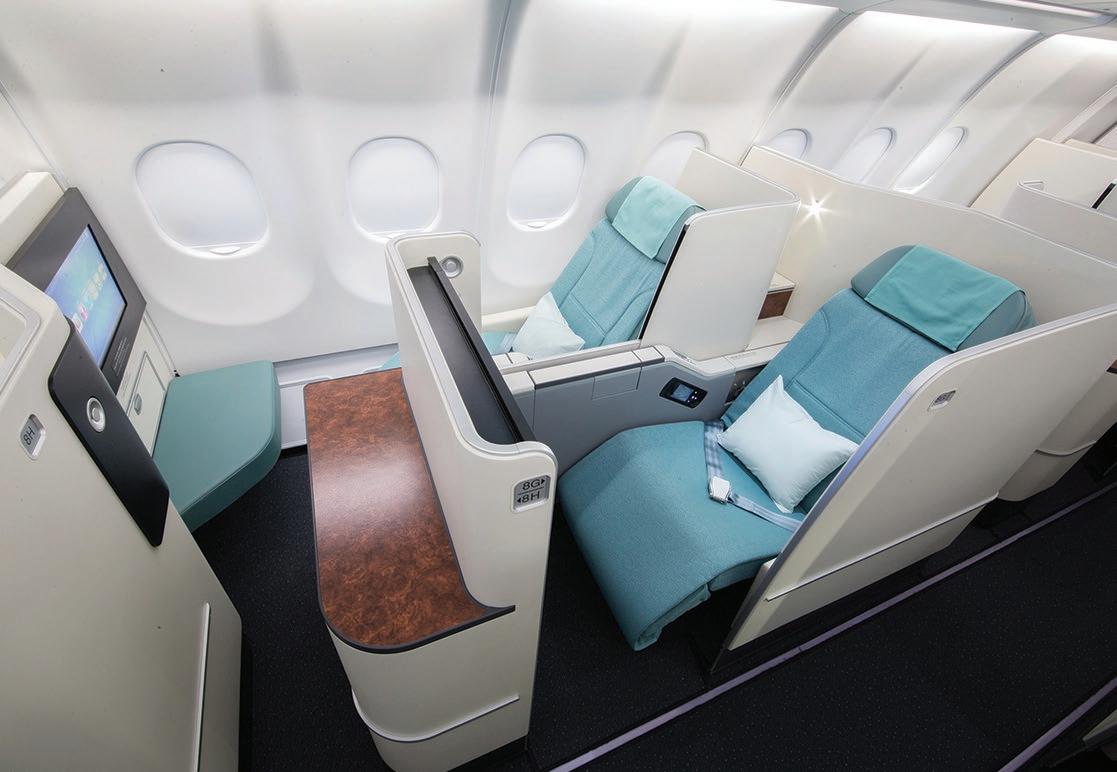 Martin Steady
Martin Steady
THE FLIGHT I flew Economy in a Preferred seat on flight AC851 on a Boeing 787-8 from London Heathrow to Calgary with Air Canada.
THE CHECK-IN My passport was not recognised by the self-scan machine but a member of the Air Canada team quickly ushered me to a regular check-in desk. I travelled quickly through security and made my way to the Air Canada Maple Leaf Lounge (available from €49 with certain Economy fares and must be booked in advance). A warm welcome awaited me at the lounge which was busy and offered a variety of comfortable seating with great runway views. There was a well-stocked buffet of hot and cold dishes including soups, sandwiches, cakes and fruit. They made to order one of the best Bloody Mary’s I’ve ever had!
BOARDING The gate was conveniently close to the lounge which made everything very relaxed. It was a full flight but boarding was quick and efficient.
THE SEAT I was in Preferred seat 31D, an aisle seat in a central block of
three seats on an exit row. Although the seat is the same size as others in Economy it offers up to an additional 10cm between seats and felt very spacious. The only disadvantage was that our extra leg room soon became a short cut to the toilets. The cabin crew quickly stepped in when this happened. The Preferred seats cost from CAD14, depending on the flight, while passengers on Aeroplan Elite and Latitude + Comfort fares can get them free of charge or at a reduced rate.
THE SERVICE The staff were really friendly throughout. We were served a three-course meal, including an appetiser of cucumber and dill salad followed by either chicken ratatouille with polenta corn mash or pasta with tomato olive sauce and mozzarella - which I picked - a bread roll, cheese and lemon cake for dessert. The meal was served with a choice of wine, spirits with mixers, tea or coffee. Alcoholic and soft drinks were available throughout the flight and prior to landing we had the choice of a chicken
ECONOMY PREFERRED SEATS OFFER UP TO AN ADDITIONAL 10CM BETWEEN SEATS
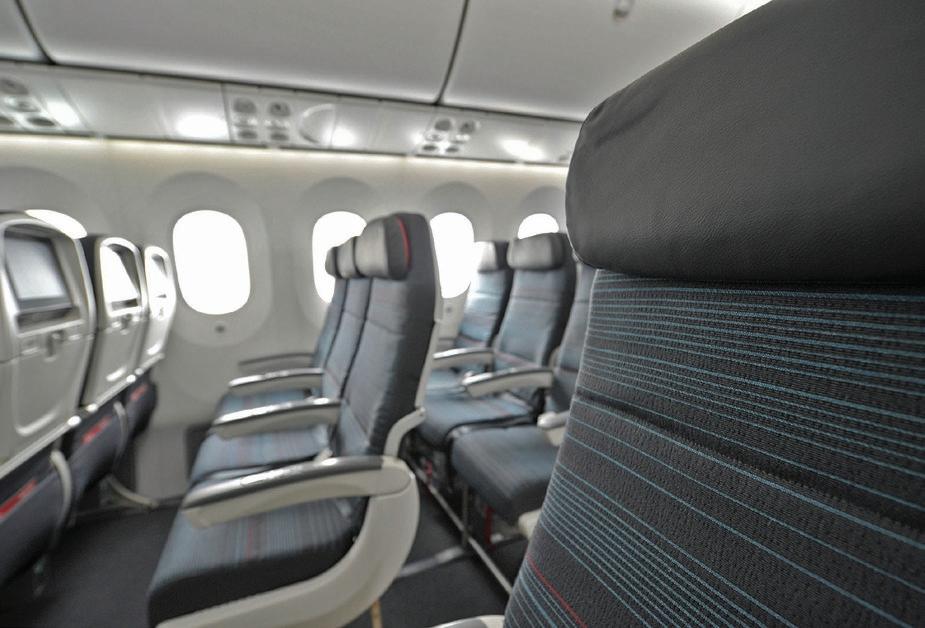
or vegetarian hot Monty’s Bakehouse pastry, which was good quality.
THE VERDICT The Preferred seat in Economy makes all the difference, especially on a nine-hour night flight, and is a good choice for business travellers looking for the most economic and sustainable cabin.
THE DETAILS Return Economy flights start at £723. aircanada.com

Kirsty Hicks

DEPARTURES 53 THE BUSINESSTRAVELMAG COM
FLIGHT: AIR CANADA, ECONOMY PREFERRED, LONDON HEATHROW - CALGARY
THE SEAT
The final word
It's a (dog) mad world
Life on the road can sometimes be a lonely place – empty nights in a distant hotel room, solitary restaurant dinners for one surrounded by happy couples. You know the score
But it seems those days could be a thing of the past, and it’s all because of the pandemic and a huge rise in pet ownership.
During lockdown, an additional 3.2 million households rushed out to get an animal companion and that’s meant a huge rise in demand for pet-friendly accommodation, according to SilverDoor Apartments.
Since 2019 the agency has seen a whopping 500% rise in requests for accommodation that welcome furry friends, which equates to around 40,000 enquiries last year.

Head of Communications Victoria Jackson says travellers returning to work after the
lockdown were actively looking to take their animals on trips.
“Pet owners want to feel their animal is not just tolerated but welcomed with open arms. We’re seeing ever more creative responses from our property partners in this regard, such as personalised goodie baskets, hampers or tailored welcome
Rise and shine
One thing we often hear from business travellers is that they love nothing more than a stress-free kip when travelling for work. So much so, in fact, that oversleeping and missing important meetings is an actual thing. Luckily, the folks at YOTEL have the answer. They’ve teamed up with light therapy experts Lumie to offer guests a wake-up light. These slowly glow into life, mimicking the rising of the sun and avoiding a harsh alarm call. It’s good for your Circadian rhythm, apparently, and means a day of high-energy performance. So, no more waking up in a screaming sweat…

amenities,” she explained.
While London is rated the most animal friendly at present, it seems hotels in the APAC region are moving the quickest to meet the trend.
So, dog lovers, get your applications in now for your pet passports, ready for your next business trip to the Far East.
Exp E ns E claims
Next time you baulk at the expense reports from your international travellers, check where they've been. Here's a list of the most expensive locations in the world for business trips, according to global mobility specialist, ECA:

1 New York £678
2 Geneva £597
3 Washington DC £561
4 Zurich £546
5 San Francisco £519
6 Tel Aviv £507
7 Los Angeles £498
8 London £497
9 Luanda £481
10 Paris £475
Research by ECA International
Ding! In comes an email with the most ridiculous survey of the decade.
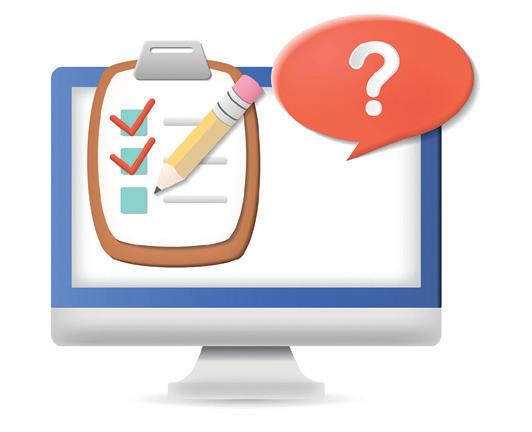
Yep, it seems that some research has been done by property buying website Your Overseas Home to reveal the most mispronounced country names. Go on, have a guess… Azerbaijan? Kyrgyzstan? Liechtenstein?
Burkina Faso?
Nope. Of course, it’s Ireland. Quickly followed by Germany, Mexico, Australia and Canada. What? Huh…?
We can only wonder who took part in this survey and what they do for a living. They certainly need to get out more.
54 THE
BUSINESSTRAVELMAG com
DEPARTURES
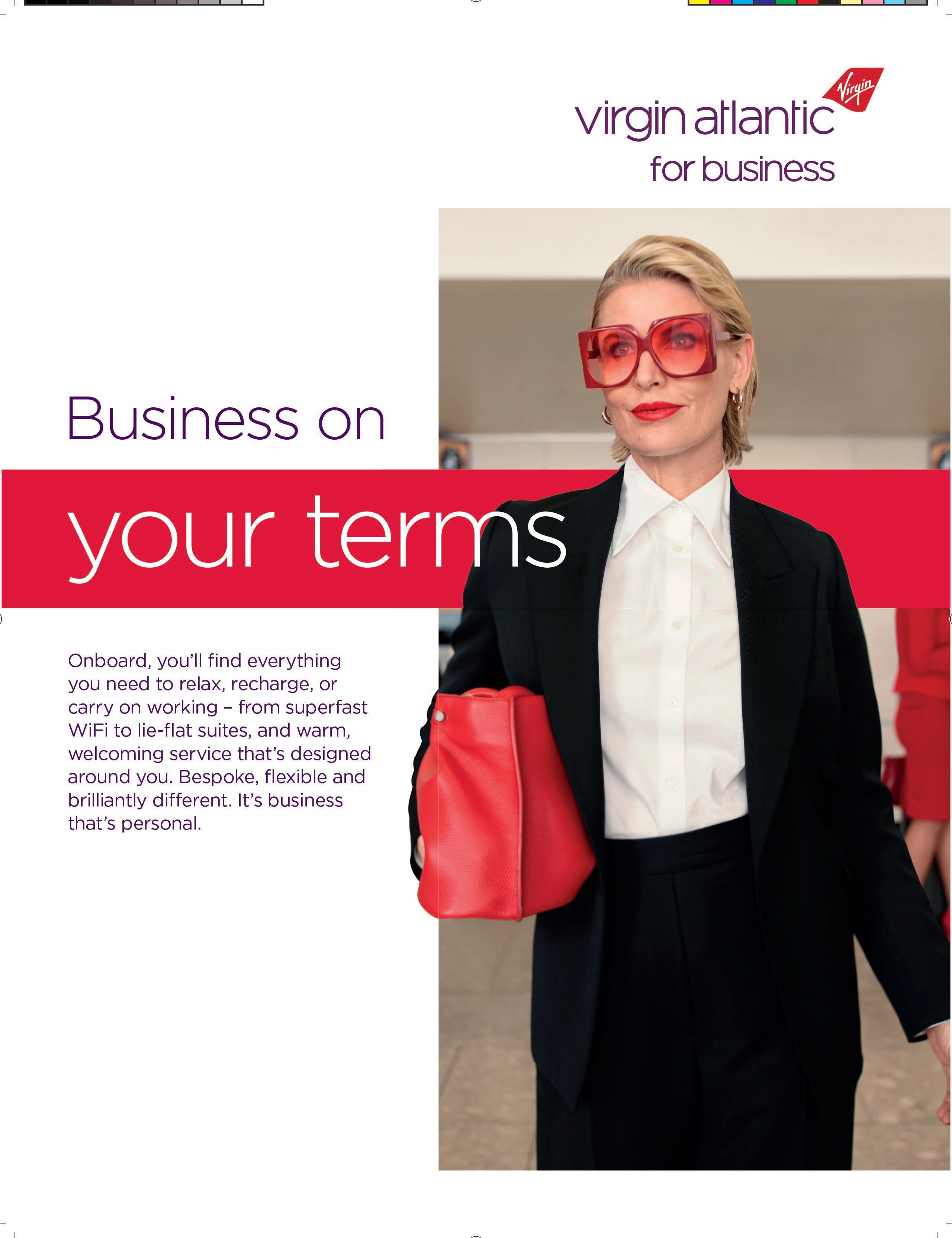














AND THE WINNER IS... Tickets are now on sale for the 2023 Business Travel People Awards at thebusinesstravelmag.com The prestigious awards ceremony will take place on the evening of September 25th at the De Vere Grand Connaught Rooms, London thebusinesstravelmag.com For sponsorship contact: Kirsty.Hicks@bmipublishing.co.uk



































































































































































































 Martin Steady
Martin Steady













































